St Catherine’s School
VOLUME TWO | 2022


VOLUME TWO | 2022


To ensure a continuous culture of learning is implemented in every classroom and co-curricular program, St Catherine’s School enhances the student experience through the engagement of exceptional staff, committed to girls’ education and wellbeing.
At the heart of the St Catherine’s experience is the relationship between teacher and student.
As a school we achieved so much collectively and individually in 2022 as we stepped forward from the shadows of COVID lockdowns and remote learning in 2020 and 2021. In 2022 we applauded the individual and collective academic achievements of our Class of 2022, achieving remarkable VCE results that have, for the second year in a row, placed St Catherine’s as the number one girls school in Victoria and ranked a commendable number two in the State overall.
Our achievements as a School in 2022 are a direct result of the collective efforts of our entire School community and testament to our learning culture that values and nurtures deep learning.
Three years ago, St Catherine’s commenced a partnership of professional learning for our teachers with the University of Queensland, to embed a Thinking Agenda for every girl, in every classroom. Through the implementation of our School’s Strategic Plan, Towards 2025, we have demonstrated an unwavering commitment to cultivating the ‘thinking classroom’ at St Catherine’s, including our commitment to enhancing the student experience through the engagement of exemplary staff, committed to girls’ education and wellbeing.
The articles published within The Thinking Agenda showcase the expertise, as well as the extraordinary level of care our educators place in every student.
Michelle Carroll Principal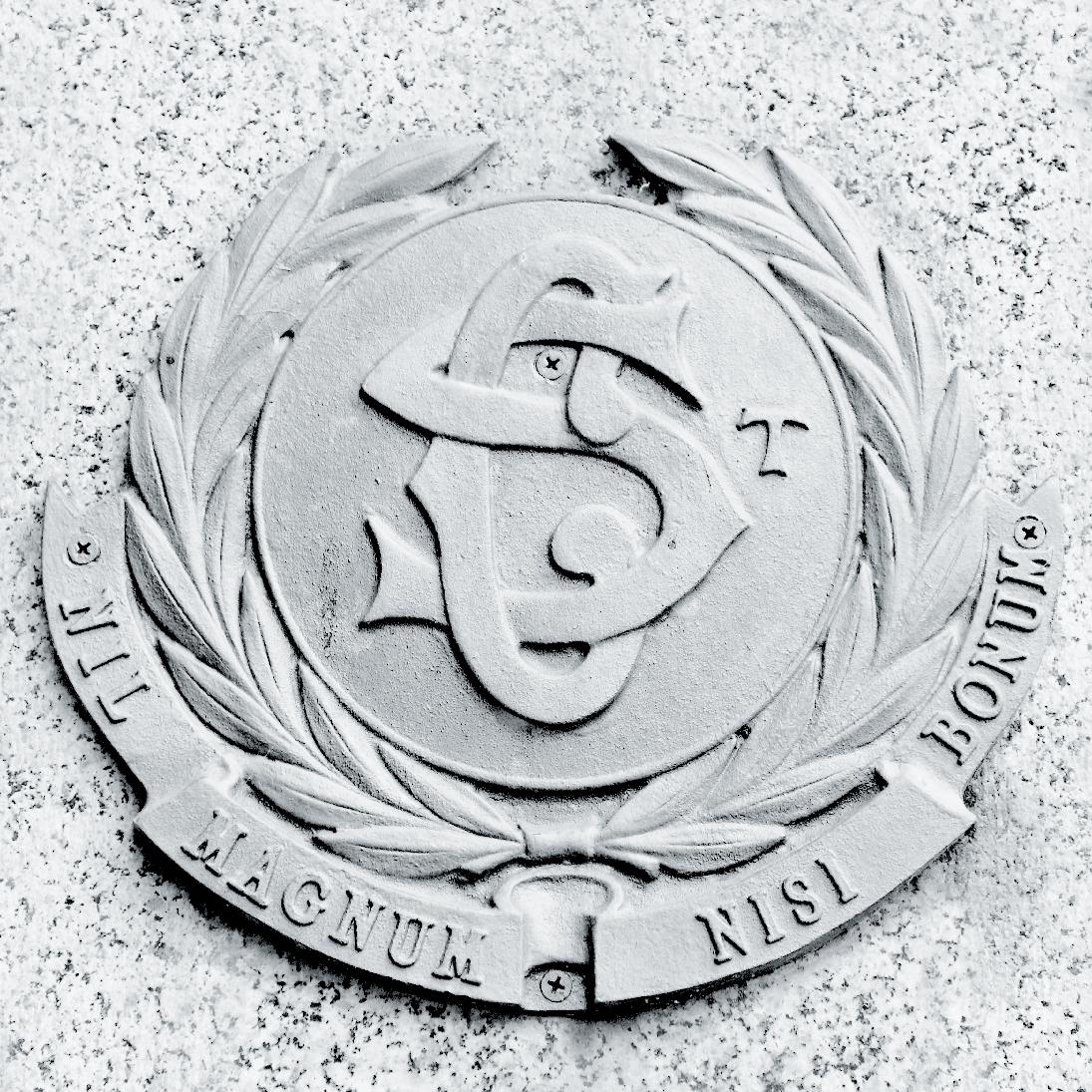
The St Catherine’s School Strategic Intents guide and inform our approach to life at St Catherine’s for our students, staff and wider School community, to fulfil our Charter as a leader in nurturing and empowering young women.
To achieve this, St Catherine’s commits to six strategic intents:
Embed an unwavering focus on intellectual curiosity through a rigorous academic program, sensitive to the needs of individual pursuits.
Enhance the student experience through the engagement of exceptional staff, committed to girls’ education and wellbeing.
Encourage our students to be proud of their accomplishments, seek out challenge and build personal leadership and confidence.
Ensure opportunities for our students through a cohesive, diverse and inclusive community of current and past parents, St Catherine’s alumnae and wider school network.
Empower young women to discover through experience and find their voice in the communities and world around them.
Envision the delivery of learning environments for students and staff that lead the world in innovative and contemporary design and the delivery of exceptional educational programs.
Name: Michelle Carroll Title: Principal
Date: 4 February 2022 Strategic Intent: Embrace Community

“There can be no keener revelation of a society’s soul than the way in which it treats its children.”
– Nelson MandelaIt has been a pleasure to greet students at the Heyington Gates this week with the joy of learning on campus still etched in the memories of the girls following the past two years. Their smiles, enthusiasm and warm greetings for friends and teachers were clearly visible.
Commencing on Monday, our Year 12 students embarked on their leadership journey, firstly welcoming the Year 7 Cohort into the Senior School, assisting them with their school bags filled with new books and the necessity of (many) colour-coded folders. It was so uplifting to see the bright, young faces of our Year 7 girls, feel their straightforward, uninhibited pre-teen energy and their pride in now being members of the Senior School.
The Year 12 Cohort then travelled to Trinity College, at the University of Melbourne for their two-day Leadership Retreat. I enjoyed listening to the Opening Address by 2017 School Captain, Mackenzie Leyden, who returned to St Catherine’s to share her post-school leadership reflections.
Mackenzie openly admitted to her somewhat stark recognition of the gender differences upon commencing tertiary life, as she navigated the coordination of various collegebased activities, tutorial discussions and her now evolving professional life. Mackenzie proposed that in having a ‘seat at the table’ she did not need to have the loudest voice nor the strongest opinions for her leadership to have an impact. Today, she purposefully leans into the skills, her strength and self-awareness, that she honed as a Year 12 girl at St Catherine’s, to actively participate and influence. Mackenzie has returned to university this year to commence Honours, majoring in politics and communication. I look forward to watching her journey over the coming years.
The first week of each school-year is always a time that provides me with a distinct feeling of humility as I ponder
the significant history of St Catherine’s School, as each student commences her new journey for the year ahead, I reflect on the many girls who have come before them, their stories now all entwined within the rich tapestry of St Catherine’s.
Schools are remarkable places. It is interesting that despite the academic workload, students seem to love their senior years as the best of all, and love retelling, with more and more embellishment as the time moves on, the hilarious stories of school adventures, or the seriously awkward mid-adolescent moments.
Despite the excitement of finally being the Seniors on campus, some may wonder in less certain moments if they are up to it all, and can be fearful they are not. Indeed, there will be ‘wobbly’ moments of self-doubt and self-consciousness, but I know with confidence, that the girls are always capable, and with the support of their parents and School walking beside them, they can achieve so much.
As teachers we understand the precious gift entrusted to us, not only the gift and responsibility of educating young women, but also wisely preparing them for their futures. We recognise and appreciate this role as our contribution to the soul of society, so eloquently articulated by Nelson Mandela in the quote above.
As I look around St Catherine’s this week, and watch the young women entrusted into our care commence their journeys, like that of the thousands of alumnae before them, I see their hard work and caring, courageous determination.
Our young learners taking their first steps into formal education in our Early Learning Centre, our Barbreck girls enthusiastically discovering their unique passions and interests, and our Senior students, emerging as young women eagerly awaiting their chance to step into the world around them, they are all so perfectly capable of being the ‘soul of society’ as they are already the heartbeat of our School community.
Name: Michelle Caroll Title: Principal
Date: 11 February 2022 Strategic Intent: Academic Achievement
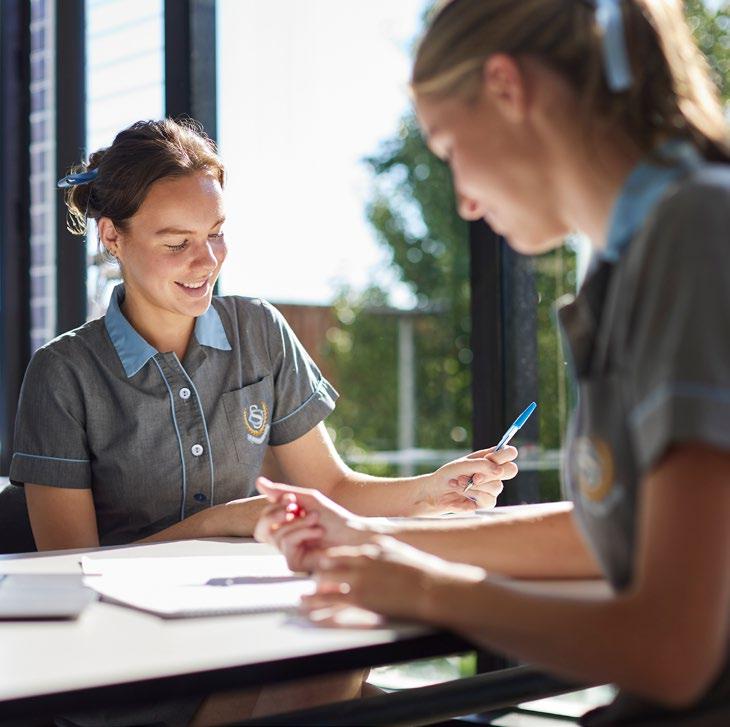
Following the release of our impressive VCE results, our Heads of Faculty, together with Director of Teaching and Learning, Mrs Ceri Lloyd and Deputy Principal, Mr Rob Marshall, spent time distilling the academic achievements of the Class of 2021. Given the challenges endured with COVID lockdowns across the past two years, their VCE success has led to St Catherine’s ranked as the number one girls school in Victoria and third best performing school in the State. It was our conclusion, that no single reason led to these extraordinary results, instead a combination of factors summarised by two simple words: Academic Care.
Two years ago, St Catherine’s teachers commenced a rigorous professional learning journey in partnership with the University of Queensland to implement a ‘Teaching for Thinking’ agenda which, ultimately, has raised the bar of our teacher mastery and pedagogical expertise. The ‘Thinking Classroom’ intersects VCE syllabus content with student thinking and tailored feedback, to ensure girls ‘use’ their knowledge, not just ‘rote’ learn. This unique classroom practice, together with our trusted student-teacher-parent partnerships, and smaller class sizes, created a consistently supportive routine across the school day.
The advancement in technical skills, for both students and staff, also ensured fluidity to exist between Learn@Home and ‘on-campus’ learning last year. The end result was a school year complete with enormously proud teaching staff and a graduating class who are keen to pursue their passions, interests and tertiary studies of choice.
During our Senior School Assembly our 2022 School Co-Captains, Angela Yu and Madeline (Maddie) Powell interviewed members of the 2021 Cohort, to share their insights regarding how to achieve a successful and fulfilling VCE year.
Last year’s School Co-Captain, Clementine (Cece) NewtonBrown (’21), successfully achieved a Perfect Study Score for Accounting, and was offered a Bachelor of Commerce at The University of Melbourne, after successfully achieving an ATAR that placed her in the top 3% of the State.
Cece encouraged younger students in the audience to achieve a balance between their co-curricular and academic pursuits. A talented academic student who engaged wholeheartedly in the Rowing program in Term 1, Cece chose to then re-direct her time to study at the completion of the Rowing season. Cece shared with the audience her time management secrets across Year 12. She maximised time before school and until early evening, grew to understand her own limitations of work and rest, and maintained a high level of consistency by studying every day across the year. Cece described this as her ‘chip away at it’ approach.
Allegra Dennison, who also successfully gained a place to study Commerce at the University of Melbourne, after achieving an ATAR in the top 3% of the state, also provided her VCE insights during the Assembly. During her time in the Senior School, Allegra captured the joy of participating in co-curricular programs, whilst remaining focused on her studies. Allegra always played GSV Sport, and loved rehearsing and performing in every School production. Allegra is also well-remembered for igniting a passion for Debating and Public Speaking amongst the students in our Senior School. As a student of St Catherine’s School since Year 1, Allegra indicated she adopted a strict study schedule and maximised every spare lesson available at School. She also studied in silence and made a point of removing all distractions, such as her mobile phone or listening to music. Allegra described this time as being ‘switched on’ for study. She also wisely reminded the audience to ‘focus on their own progress, not that of others’.
Zara Carter was our third panellist and shared with our Assembly audience her passion for the folio subjects, such as Media and Visual Art. Zara is commencing Film Studies at Swinburne University and hopes to study in London in the coming years. Zara successfully achieved an ATAR in the top 10% of the state. During her VCE years, Zara seized every opportunity to find her passion through design. She encouraged students with similar interests to do something they enjoy, lean into their creative skills and to create concepts and designs that they are proud of and then, the work comes easily.
Our VCE teachers will again create opportunities to invite the (now) Old Girls back to their specific subjects across the year, to share more intimately their study techniques pertinent to each subject.
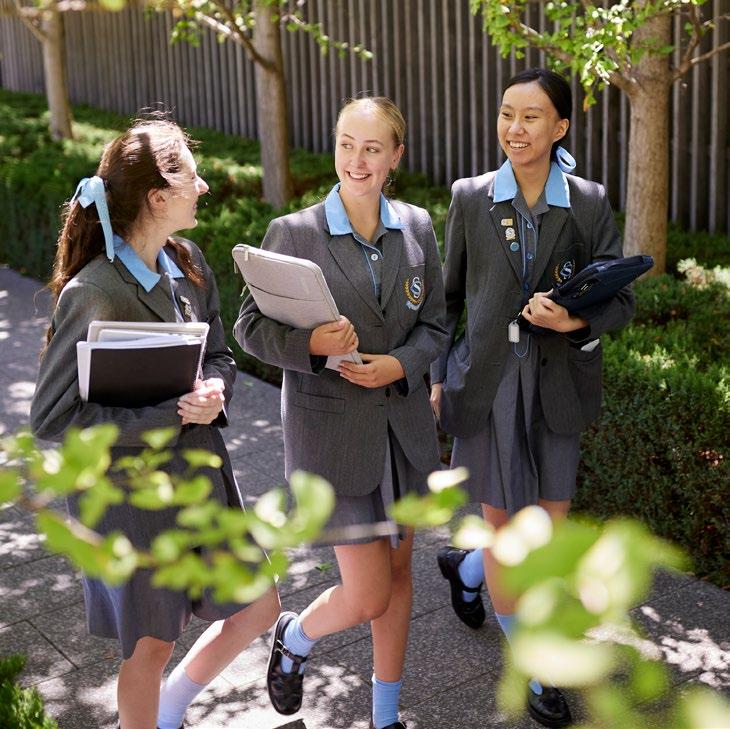
Name: Clara Barry & Holly Farrer Title: Junior School Co-Captains
Date: 11 February 2022 Strategic Intent: Student Wellbeing & Leadership
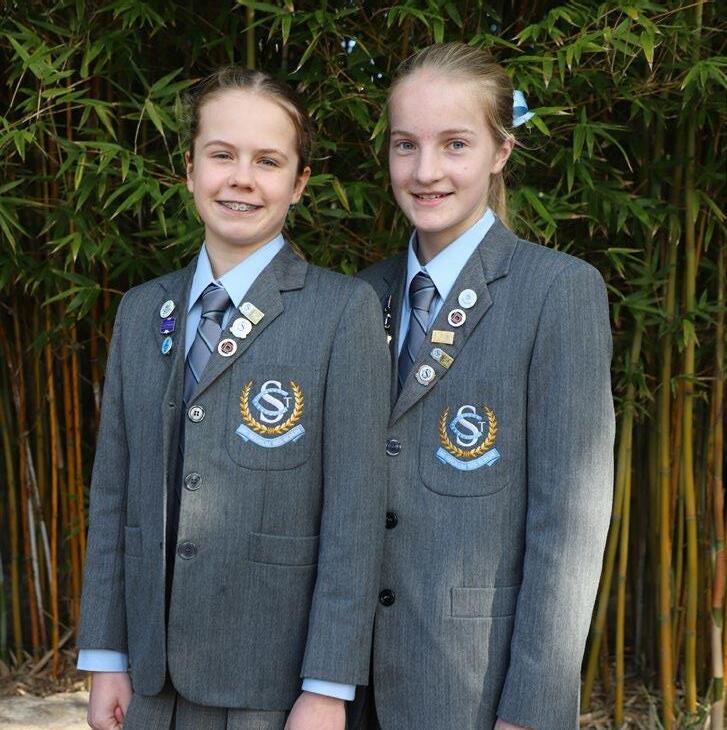
Welcome to our Leadership Assembly. My name is Clara and my name is Holly. We are your Junior School Co-Captains for 2022. We are very excited to be your captains this year and we vow to work hard for you. This year, we have chosen ‘Courage’ as our theme. We want all girls at Barbreck to practise being courageous with their learning and eventually become fierce learners, a step towards becoming courageous in all that we do.
Why did we pick courage as our theme?
• Courage is about being brave enough to have a go at things you haven’t tried before … having a go at things you don’t know if you’ll be good at
• We all experience fear at times and courage helps us overcome our fears
• It might be speaking to another student we haven’t met before, answering a question in class, trying a new sport or just having a go at any of theactivities on offer at Barbreck
• We might be afraid that something will be too hard or that we’ll be embarrassed if we fail, but the fear is only in our minds
• We want to have a supportive culture in Barbreck where we recognise courage in others and support them when they have a go at something
Overcoming our fears is hard work. I’m not going to lie, it is really hard work, but the success of overcoming our worries is worth the work. Too many people, in particular girls, think too much of the obstacles instead of the success they will receive.
You know what we all do – we think:
• ‘What will people say?’
• What will happen if I can’t do it,
• How am I ever going to show my face again?
Instead we need to picture what success feels and looks like. When you progress or succeed you will feel proud or happy, you will think that it’s worth the effort and how unbelievable it feels. You will have an endless smile stretching across your face, you’ll stand a little taller, have your chest out a little further, and be more confident. You will fist pump in the air and say or think, (if you’re in a maths class) – “Yes, I did it!”
Think of Ash Barty, the world number one for women’s tennis, imagine how happy she was when she beat Danielle Collins in straight sets. She was the first Aussie to win the Australia Open in 44 years! She did it by being courageous and working hard, she didn’t think of obstacles, she pictured being successful! If she can, then we can too!
So, what are the benefits of being courageous?
When we act with courage at School:
• We try new things to see what we like
• We can learn from our mistakes
• We have a positive mindset, focused on what’s possible and not what might go wrong
• We encourage others to do the same, and support them trying, even if they don’t succeed
• We will create a better School environment for everyone, where everyone feels safe enough to have a go at anything they want
By the end of the year, we want every girl in Barbreck to be able to use courage in learning, sports, and participation. To experience progress or success through courage and to believe that courage helps us to succeed.
We will aim to become more confident and to realise the first step is always the biggest. If we can all be courageous together, we as females of the future will make this world a better place for ourselves and others that follow.
If we keep being courageous, one day we will realise we are fierce because she who dares achieves!
Name: Ms Merran O’Connor Title: Deputy Principal – Student Wellbeing
Date: 18 February 2022 Strategic Intent: Student Wellbeing & Leadership
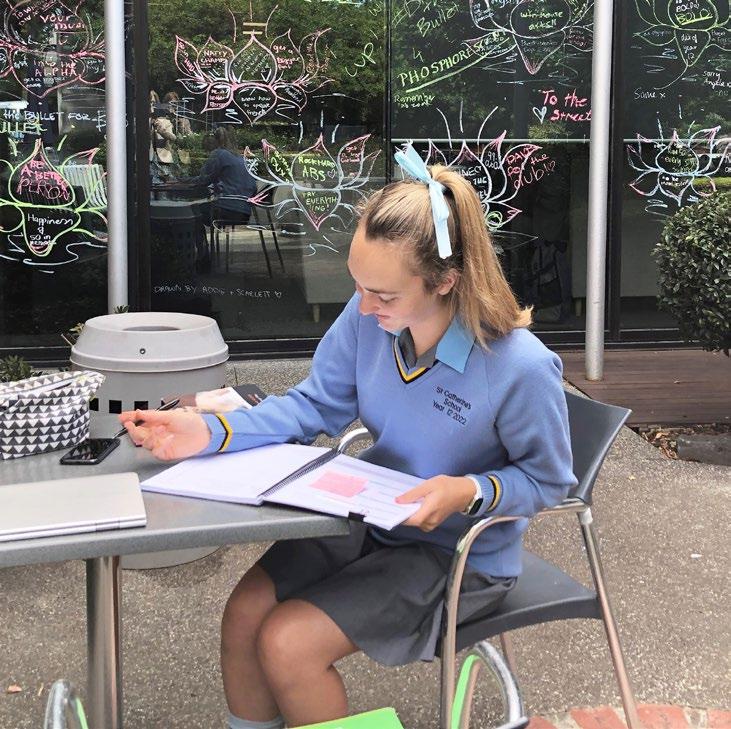
“To emerge is to take action. It feels powerful. It feels determined.”
Madeline Powell, School Co-Captain
“Ultimately, hardships don’t define us. It’s the fact that we manage to emerge out of them, it’s how we help each other to emerge, that does.”
Angela Yu, School Co-Captain
Since 2015, each consecutive Year 12 Cohort has chosen a single word to encapsulate their theme or focus for the year ahead. This choice is one that is both looked forward to as a rite of passage, but also as a significant leadership responsibility and a key aspect of the value placed on student voice and empowerment.
Acknowledging the power of a common goal, the 2022 Year 12 Cohort has chosen the inspirational word Emerge, following the themes of previous years: Dare, Vision, One, Fearless, Beyond, Golden and Absolutely. These annual mottos serve to bind our School community together, and catalyse a clearly articulated vision and purpose across the Year levels. The Year 12 Common Room features each word with its own unique design; the stamp of the leading Cohort of that year.
In their first address to the Senior School in the Induction Assembly, the School Co-Captains, Angela Yu and Madeline (Maddie) Powell, introduced their expectant audience to this year’s word. Keeping their audience in suspense, Angela and Maddie shared a metaphor of the daily emergence of the lotus flower to symbolise how beauty and joy can come from struggle and challenge. The Captains described how the lotus flower emerges from mud every day to bloom into a beautiful flower. Angela explained, “Basically, it starts its life cycle with its roots latched in mud, and every night it submerges itself under the water to re-bloom the next morning.”
Tying this story to one of human resilience and perseverance, Angela said, “without mud, you cannot grow a lotus. The
beautiful flower will not emerge.” She went on to encourage the audience to consider how this metaphor could symbolise a “reflection on our times,” noting that “we’ve all struggled through a multitude of things these few years, whether that’s COVID, relationships, self-worth, but the lotus reminds us that we can all come out of this together, and that when we do, we are even more beautiful, not just aesthetically, but on a deeper, more intricate level…no mud, no lotus.”
Angela inspired the girls to see the worth of persisting through challenges saying, “What’s more, the process of coming up from the water and re-blooming every day requires consistency and persistence. There will be times when it will take so much effort to come up for air, to get on top of things, to float above the muddy water. But the lotus manages to do it every day, it doesn’t get easier, but every time you do is a chance for you to emerge as a better version of yourself.” Angela explained “the word ‘Emerge’ captures the process of things, the long, sometimes disheartening, but always worthwhile, process of reaching your goals, your dreams, your future.”
Maddie reiterated that “the word should resonate with each individual that is a part of this collective, regardless of what Year level you are in, what subjects you are doing, the passions that drive you or the difficulties you may face this year.” She stated “whilst we emerge as a collective, we also emerge individually… every day we decide how we are going to emerge – just like the lotus does when it rises above the muddy water to bask its petals in the sunlight.”
Linking to the School Values, Maddie explained “we are all our own, unique lotuses capable of emerging towards our visions and goals, and in control of the way in which we emerge – with Gratitude, Empathy, Integrity, Curiosity and Perseverance. In this way, we are mindful that we are in the same pond – metaphorically – as all of the other lotuses. Acting with kindness at the forefront of our minds, and providing support if one day someone is finding it a bit harder to emerge out of the muddy water.”
Following the Assembly, the students were asked to go to the Nicholas Library windows where the Art Captains had drawn large colourful lotus flowers for the girls to write what they would like to emerge as by the end of this year. Holly Landrigan, the Spirit and Wellbeing Captain also followed the unveiling of the new word with a presentation to Year 9 students where they decorated the Wintergarden windows with their messages of inspiration. The Emerge theme and the lotus metaphor typifies the traits St Cath’s girls aspire to – to be bold, independent, creative and resilient. As Maddie said of the lotus flower in assembly, “It reminds me of a St Cath’s girl.”

Name: Mrs Vicki Marinelli Title: Head of Arts
Date: 18 February 2022 Strategic Intent: Academic Achievement
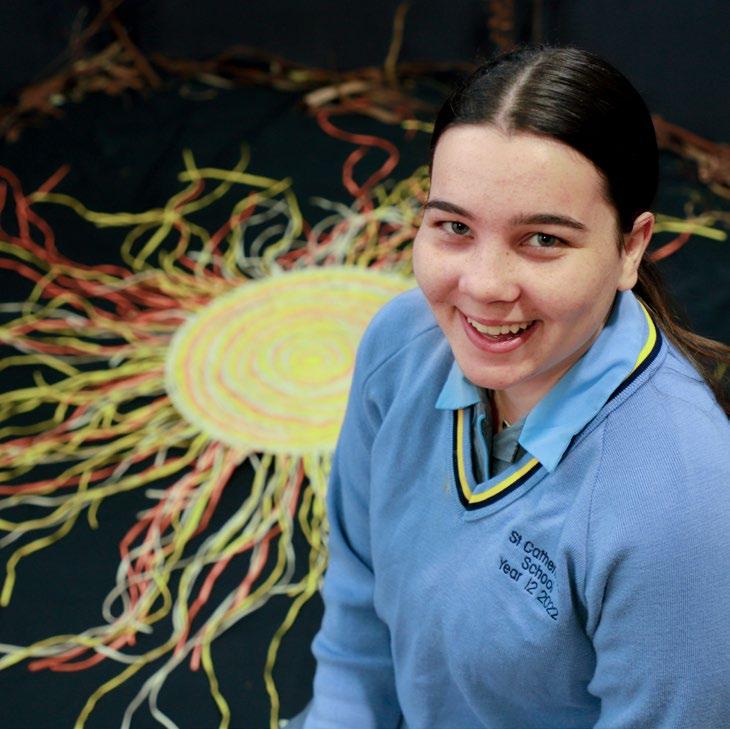
I do not always immediately ‘get’ artworks. Contemporary art experiences can be resistant to being unpacked from an aesthetic point of view.
When considering Contemporary Art, we no longer ask ‘Is the artwork good?’ or ‘Is the work aesthetically pleasing?’ Instead, viewers consider whether art is ‘challenging’ or ‘interesting.’
This year, the major galleries are affirming the significant role of women in arts, as well as creating major exhibitions of contemporary female indigenous artists. The recent Maree Clarke (Yorta Yorta/Wamba Wamba/Mutti Mutti/ Boonwurrung) retrospective exhibition Ancestral Memories communicated delicately and gently, significant themes of affirmation and reconnection with her cultural heritage.
The Exhibition Found and Gathered, brought together Rosalie Gascoigne and Waradgerie artist, Lorraine ConnellyNorthey, whose found object artworks reference traditional weaving techniques and Indigenous cultural objects.
Through exhibitions such as these we are reminded of our differing connections with nature and uncomfortably, the disposition of Indigenous people from the land.
Tough themes, beautifully handled.
At St Catherine’s School we develop bold learners who embrace discomfort and challenge. Our Art students have demonstrated this repeatedly. 2021 VCE Visual Arts students chose themes such as body image, learning disabilities, mental health, racism, homelessness, isolation, and loss.
Tough themes, beautifully handled.
Like the National Gallery of Victoria, the Arts Faculty at St Catherine’s School is committed to extending our teaching through discussions about the history, arts, reconciliation, and culture of First Nations Australians. Our Studio Arts class explored the Found and Gathered Exhibition as a starting point for exploring and researching
Connelly-Northey’s perspective and ideas. Year 10 Visual Communication Design created Indigenous AFL guernseys to explore connection, racism, and identity. In Year 7 Drama students researched Indigenous perspectives, voices, and events to create dramatic responses to Indigenous-Australian politics and society.
Year 8 Music explored the song My Island Home by Christine Anu and the Warumpi Band to explore Torres Strait displacement from lands and conceptualise ‘home’ through the lens of the natural world. Our Year 8 students also had the privilege of learning from contemporary Indigenous weaver Kathy Glass, proud Gurindi, Dagoman and Wardaman Woman, from Katherine, NT and proud mother of our Boarding Captain, Jasmine.
As our Artist Educator, Kathy spent time working with students and staff. Media teacher, Ms Julia West commented, “Through Kathy, I have learnt that yarning (talking), is the way knowledge is passed on. It is how one learns what you have wished to know. We are not used to this in western culture, but it is something I will now use within my own teaching.”
Jasmine’s Year 12 artistic practice is based on contemporary weaving learnt from her mum, Kathy, as well as Jasmine’s experiences with the traditional weavers in her country. Jasmine reflected, “I am a Dagoman, Wadraman and Gurindji woman raised in Katherine, NT. I have been exploring the idea of weaving and how it connects women from many generations.” Jasmine’s work was exhibited in the VCE Art Show, held in October this year. Jasmine’s art has also been shortlisted for the prestigious Top Arts Exhibition which showcases extraordinary works of art from VCE students.
In 2022 and beyond, St Catherine’s will continue to develop curriculum that honours reconciliation. We will embrace the sharing approach to knowledge transfer through asking questions, turning up, participating, and inviting, with a genuine and unhurried purpose to be in the room, listening, participating, and learning.
Name: Michelle Carroll Title: Principal
Date: 25 February 2022 Strategic Intent: Academic Achievement
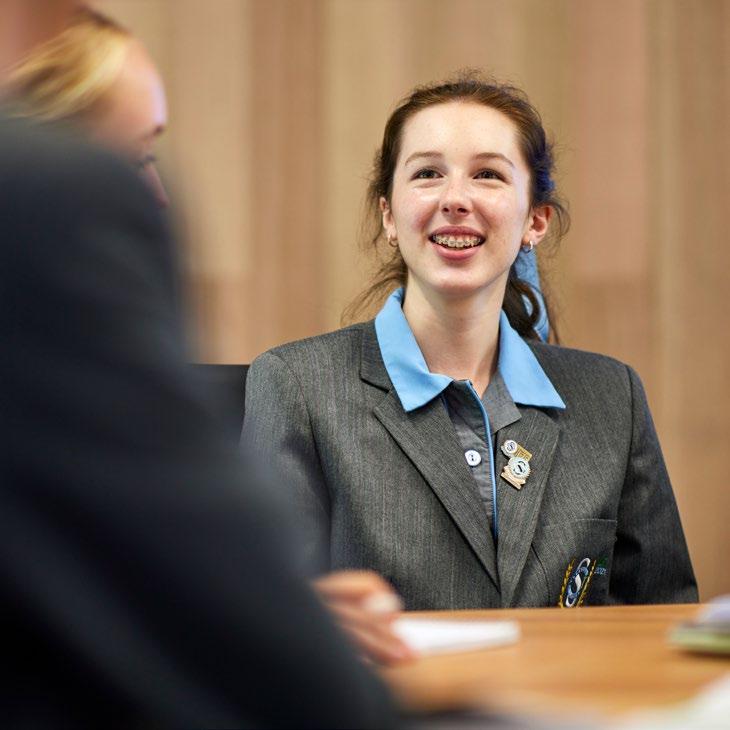
With the official events of inducting new Student Leaders and announcing 2021 VCE Subject Prizes during Senior School Assembly now complete, it was time this week to hand over the reigns to our Year 12 Cohort – the Graduating Class of 2022.
Commencing last year, the V.O.I.C.E.S Student Leadership Project at St Catherine’s, is focused on encouraging and empowering girls to step forward and embrace every opportunity. As Project Leader, Mr James Brown expertly guides the Student Executive to design and host the weekly Assembly in the Senior School. In essence, our School Assembly is created by the girls, for the girls.
The V.O.I.C.E.S Project is established around the motto, ‘Use Your Voice’, and aims to prepare young women to aspire to leadership roles. It also recognises that not all acts of leadership require speaking, nor an official title, or specific captaincy or role. Often our actions speak louder than words, as such, the acronym V.O.I.C.E.S, identifies the following key attributes of leadership we wish to engender:
Drawing on the words from Natasha Bedingfield’s song: Unwritten, during their Assembly Address, School Co-Captains Madeline (Maddie) Powell and Angela Yu shared the following:
Summer holidays are just a collection of memories now and we face another school year, an abyss of uncertainty, excitement; a blank page, a fresh page – completely unwritten.
This can be daunting. Like starring at an empty Word document and knowing that one day – hopefully – it will be full of words, a completed essay, or a creative, or a speech. Knowing that one day, you will read over that Word document, remembering the time, the laughs, maybe the stress or the tears behind each word. But for now, it remains unwritten. And the pen is in your hand.
Today is where your book begins. Your book, your story for 2022. At the start of the year, we emerge into the unwritten, staring at the blank page before us with confidence and anticipation. No one else can speak the words on your lips. We all write our own individual, unique stories. So, embrace the blank page that is 2022 with this in mind: follow your passions, express your opinions, be around people that make you happy, that lift you up.
Fill the unwritten in 2022 with adventure, excitement, kindness, new beginnings, lessons, mistakes and growth.
Maddie and Angela encouraged the younger Cohorts to find comfort in the unwritten, and then embrace it:
To embrace the opportunities of a new school year or a new subject, the budding friendships, the excitement of upcoming camps or even formal. All of these things, these opportunities, these new beginnings, are the start of your story for 2022. So, in the words of Natasha Bedingfield, “today is where your book begins, the rest is still unwritten.
With the inspiration of our Student Executive, together with the Year 12 Cohort, each and every student is encouraged to find their VOICE.
Also commencing this year is the development of our new Humanities program currently focused on lifting the leadership, independence and critical thinking skills of Year 9 students through the year-long Critical Conversations program. Inspired by a lesson observation at Eton College in 2019, the Humanities program now draws on Harkness methodology to cultivate our Thinking Agenda across Year 9.
The Harkness-inspired approach to teaching was developed by a small group of private schools in the USA, commencing with Phillips Exeter Academy. It spread amongst other prominent US schools and now, the board room table-based seminars are fairly common practice in American private schools.
At St Catherine’s, we see great value in promoting Harkness as part of our tool kit for teaching and learning. The advantages are many:
• it places the onus on the students
• it requires independence and critical thinking
• it works through collaboration and constructive discussion
• it develops a lot of the intellectual and social skills required of our students.
To be successful in Harkness, you must be a good listener, a thinker, empathetic, articulate, and unashamedly intellectual. Given all of these advantages, introducing this at Year 9 hopes to develop an open and academic thinking culture.
Our Year 9s are currently researching and discussing the Critical Questions: Biomes are under threat across the world, including tropical rainforests. Can we stop biomes being destroyed?
These Critical Questions require students to review their prior knowledge, undertake research for understanding and ponder further questions. The Harkness-inspired Model is anything but light
content. Successful student led dialogues are knowledgebased, requiring considerable pre-class preparation.
I was delighted to hear the feedback from some our Year 9 parents recently, who shared their family dinner table conversations were taking a new Harkness inspired shape, as their Year 9 daughter rehearsed their discussion prompts:
“My point of view is .... What do other people think?”
“I agree with... because…”
“In the article (or the video, or on the graph) it showed...”
“What surprised me was...?”
“I’d like to build on what has been said by adding...”
“Can you clarify what you mean by…?”
“I’d like to offer a connection to this discussion.”
“Are there any groups who would disagree with... what do you think?”
We look forward to following the progress of the Year 9 Critical Conversations program, and tracking the changes observed in the VCE classes in the coming years, as the confidence to strengthen classroom dialogue is emphasised, in addition to their board room capabilities.
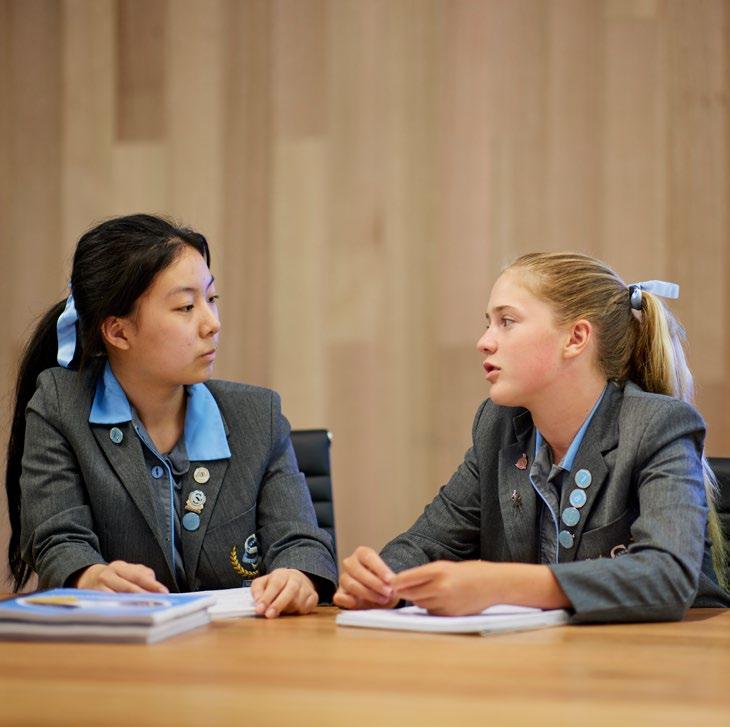
Name: Ms Karen McArdle Title: Head of Junior School
Date: 11 March 2022 Strategic Intent: Academic Achievement

What will the world be like when my daughter graduates?
I am sure this is a question all St Catherine’s parents regularly ask themselves and was definitely what many families were pondering as they joined us today as St Catherine’s welcomed over 40 families onto our School grounds to tour our campus and see, first-hand, what life at St Catherine’s could look like for their daughters.
Over the past two years our Open Mornings and Tours have been limited or cancelled due to COVID restrictions. Whilst we pivoted marvellously by offering online tours as the next best alternative, the chance to once again open our School to families, and share our learning culture, enthusiastic students and teachers, and wonderful facilities was a joy.
During events such as these parents are able to seek information about our School direct from our student leaders and staff, and discover how our School will educate and equip their daughters with the capabilities and skills they need to thrive in the world, post-school.
Using our current Prep students as an example, by the time they graduate in 2034 and commence life outside of St Catherine’s, the world in which they operate will be drastically different, with the pace of technological innovation continuing to evolve the world of work, and how we live at exponential rates. Some futurists predict by 2034:
• Every individual will be connected to 16 devices;
• Trains will travel three times the speed of airplanes;
• The majority of vehicles will be enabled with vehicle-to-vehicle communications; and
• Artificial Intelligence and automation will reduce the number of human-only jobs
In the recent, The Future of Jobs Report 2020, the World Economic Forum predicts by 2025, “85 million jobs may be displaced by a shift in division of labour between humans and machines, while 97 million new roles may emerge that are more adapted to the new division of labour between humans, machines and algorithms.”
In line with the changing landscape of human-only jobs, the skills required within these new and emerging roles include, “critical thinking and analysis…problem-solving, and skills in self-management such as active learning, resilience… and flexibility,” according to the WEF.
As a School it is essential we continually adjust our educational offerings to ensure we are preparing the young girls in our care for what their futures will look like. For our Class of 2034, it is clear they will be required to be agile and critical thinkers, and possess higher-order thinking skills to be successful in a world of work which sees humans and machines working side-by-side.
In Barbreck, our Thinking Classroom approach prepares your daughters for their futures. Our girls are taught to question, interpret, analyse, reason, evaluate, explain, hypothesise, and appraise across all subjects. They are taught complex thinking routines and strategies on how to approach their thinking, how to apply diverse ways of thinking to tackle problems and new information, and how to critically question what they see and hear.
Through this deeper learning, students can articulate their thinking, establish intellectual connections between concepts and across subjects, and better appreciate the bigger picture, all essential skills for life in the 21st Century. Within Barbreck we envision our graduates to be the minds of the future, the builders of these great future technologies, the collaborators and the problem-solvers.
These higher-order thinking skills take time to develop. With this in mind the focus of our teaching in Barbreck ensures thinking skills and routines are integrated across all subjects, and are built upon as the girls progress through St Catherine’s – from our Early Learning Centre through to Year 12 in our Senior School.
Our focus is informed by the Australian National Curriculum, and extended through St Catherine’s signature programs including Project Zero, a Harvard Graduate School
of Education resource, and our partnership with the University of Queensland’s Critical Thinking Project.
One of the thinking routines implemented within Barbreck from Harvard University’s Project Zero is See, Think, Wonder. Students are asked to think deeply about what they see, what they think, and what makes them wonder? Girls are asked to think carefully about why something looks the way it does or is the way it is. This helps stimulate the girl’s curiosity and sets the scene for inquiry. This thinking routine provides significant depth to a student’s approach to learning and can be applied across numerous subjects, such as STEM or HASS (Humanities and Social Sciences).
Recently in STEM, the girls utilised See, Think, Wonder when experimenting with detergent, oil, and water –analysing, hypothesising, and communicating their observations as they combined the differing liquids. In HASS, our Year 5 Study Tour to Sovereign Hill presented an opportunity for the girls to really think about what they
were seeing, linking it to their prior knowledge, and then wondering about many aspects of life at that time.
To think is to learn, and the quality of one’s thinking processes impacts the quality of their learning. At Barbreck, we work to ensure girls are taught how to think deeply and how to think well. They have opportunities in every subject to use and apply their cognitive skills productively, intentionally, and purposefully so they can thrive and contribute meaningfully to the world in which they find themselves.
References:
https://www.quantumrun.com/future-timeline/2035/future-timeline-subpost-technology https://www.weforum.org/reports/the-future-of-jobs-report-2020/digest
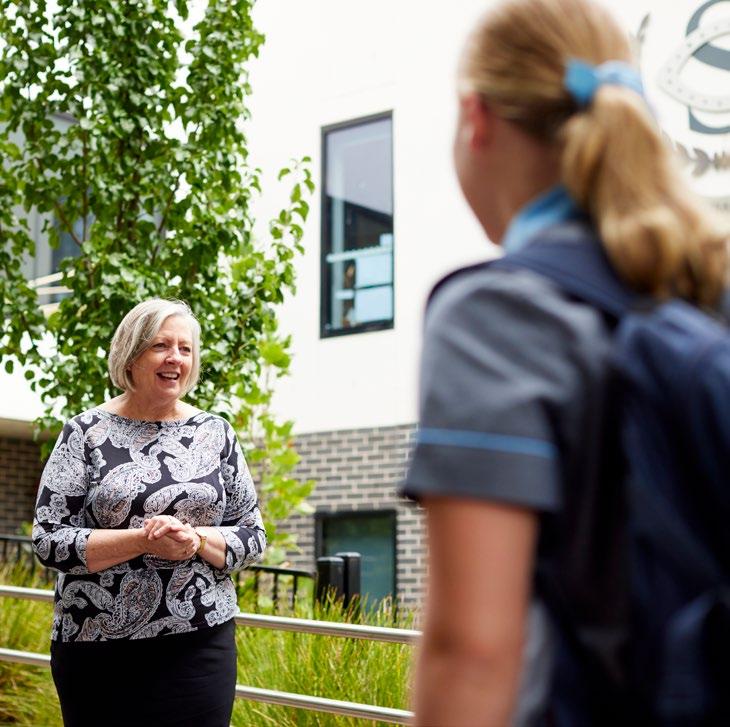
Name: Michelle Carroll Title: Principal
Date: 11 March 2022 Strategic Intent: Embrace Community
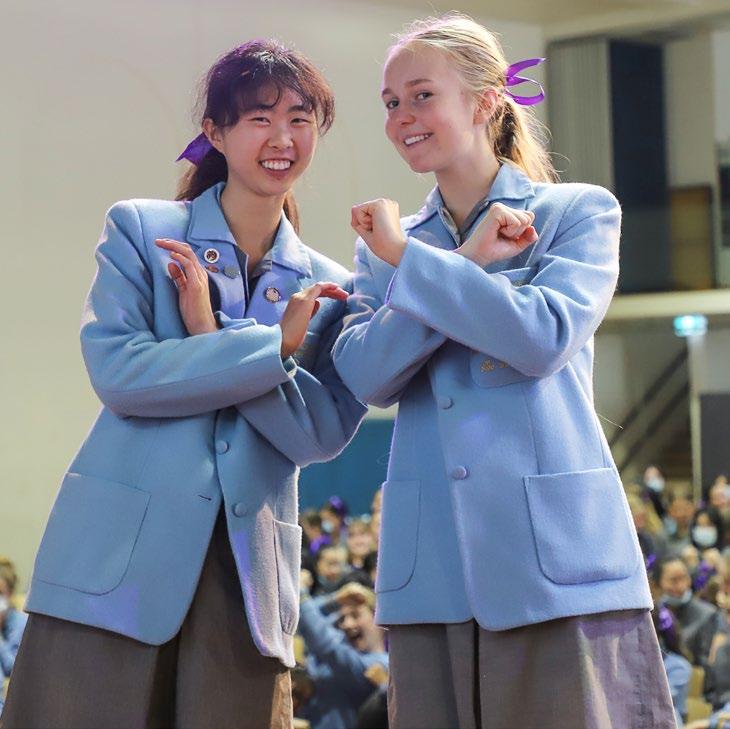
The annual celebration of International Women’s Day took pride of place at St Catherine’s this week with purple ribbons shared at Assembly, and our Senior School students and staff repeatedly singing Girl on Fire following Charlotte Myer’s stunning performance.
This year, the IWD theme is #BreakTheBias aimed at promoting a world free of bias, stereotypes and discrimination. As part of the theme, people are being encouraged to strike a #BreakTheBias pose, which involves crossing your arms in front of your chest.
At St Catherine’s, the achievements of many wonderful role models contribute to our School’s rich culture of female empowerment. Some examples below from just the past two weeks alone are highlighted below.
St Catherine’s Physics teacher, Ms Clare Haysom, is one of Victoria’s emerging elite Cricket umpires. Last weekend, Clare debuted as a Premier Men’s 1st XI Umpire. Clare wears Cap No. 604, but most notably, she is only the third woman ever!
Year 12 student and athlete, Olivia Nigido-Scott has once again qualified to represent Victoria in her 11th Australian Track and Field Championships. At 17 years of age, earlier in the athletics season, she threw an Under 23 national qualifier in the Hammer. She also recently competed in the South Australian Track and Field Championships, receiving a silver medal in the Under 20 Discus and a Bronze in the Hammer. Upon returning to Melbourne, Olivia threw a personal best performance to place third in the Under 20 Hammer at the Victorian Track and Field Championships. This is her first season throwing a 4-kilogram Hammer (Under 18 women throw 3 kilograms) but with another year in this age group, she is looking forward to improving on her recent performances.
Rhea Werner (Year 10) was recently selected as a City of Boroondara, 2022 Australia Day – Young Citizen of the Year Award and was presented with the Award by the Honourable, Josh Frydenberg, Australian Federal Treasurer.
The Award was presented in recognition of Rhea’s passion for nutrition, specifically relating to eating-disorder conditions for young women. Through her determination to highlight the issue and drive change, she was invited to join Harvard STRIPED – a public health initiative focussing on eating disorder prevention, led by Professors and Clinical Practitioners from Harvard University and the Boston Royal Children’s Hospital in the US.
Through her active involvement, Rhea played a crucial role in the adaptation of the Senate Bills H.2331 and S.1525 in Massachusetts, which aimed to restrict adolescents’ access to muscle building supplements and diet pills. Her invaluable contribution was recognised in Australia as she was asked to become the founding member and Co-Chair of the Body Confident Collective – a national youth advisory council focussed on eating disorder education and prevention, as well as establishing a nation-wide youth advocacy movement for nutrition-awareness, led by researchers from Melbourne, Victoria and Monash Universities.
Currently, Rhea is leading the adoption for similar legislative policies to be rolled out in Australia through different avenues to create awareness. Rhea is also an avid member of the Boroondara Youth Council and is leading the formation of a legislative event at Victorian Youth Week, backed by Harvard STRIPED and the Body Confident Collective. She is a Youth Squadron member for the St John’s Youth Division, in which she is currently working to implement nutrition education into St John’s international curriculum, and establish greater awareness.
Year 12 student Lan-Tian Yen-West was successfully awarded a 2021 inaugural Menzies Foundation Emerging Leaders Fellowship. Lan-Tian was one of only 11 who were selected to take part in the program, Australia-wide.
This week, Lan-Tian’s achievement was highlighted in The Age, International Women’s Day article highlighting women in leadership. The Emerging Leaders initiative aims to understand young people’s responses to various ethical challenges and see how they would raise peer awareness of these issues and play a role in contributing to the greater good of society.
Lan-Tian’s answer to the question asked of applicants –What does inequity mean to you? – coalesces with the theme of this year’s International Women’s Day #BreakTheBias, Lan-Tian’s response, “Inequity is when women like me are silenced.” Lan-Tian has Chinese-Australian heritage. “In Australian history, far too many women have been silenced, especially women who come from minority backgrounds.”
International Women’s Day has been recognised since the early 1900s; a period of great expansion and turbulence in the industrialised world. In 1908, 15,000 women marched through New York City, demanding improved pay, better working conditions and voting rights
for women. Two years after this march in New York, the ‘rights of women’ gathered momentum across Europe and the first IWD was recognised in 1910. And whilst IWD was born out of a ‘call to action’ and a greater need for equality for women, it is also a joyous time to acknowledge the achievements and potential of women and girls.
Many women from younger generations may feel “all the battles have been won for women.” Clearly, much progress has been made since the early 1900s; we have female astronauts, prime ministers, school girls are welcomed to university, women can work and have a family. Women have real choices, this is certainly evident in Australia.
Building self-worth and encouraging young women to trust their own capabilities enables them to develop a healthy self-confidence. Encouraging girls to be mindful of their language and to accurately articulate goals, opinions, impressions and ideas, both large and small, is empowering.
Providing high-quality connections with adults, being part of a community with a shared purpose, and involvement in service to others, can also help create a greater sense of self. At St Catherine’s we connect our girls with a broad and diverse community of women, providing them perspective and clarity, along with a multitude of inspiring role models.
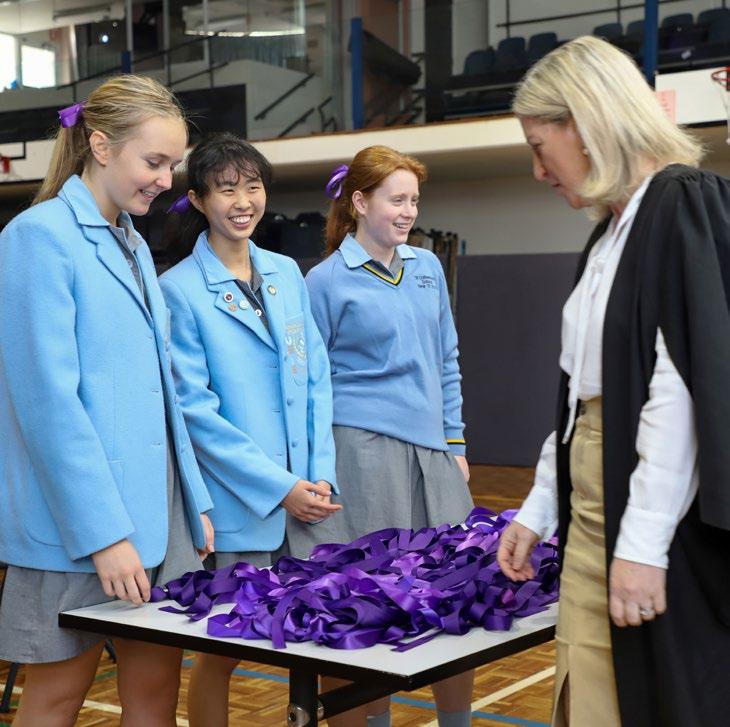
Name: Ms Anna Pianezze Title: Head of Languages
Date: 18 March 2022 Strategic Intent: Academic Achievement
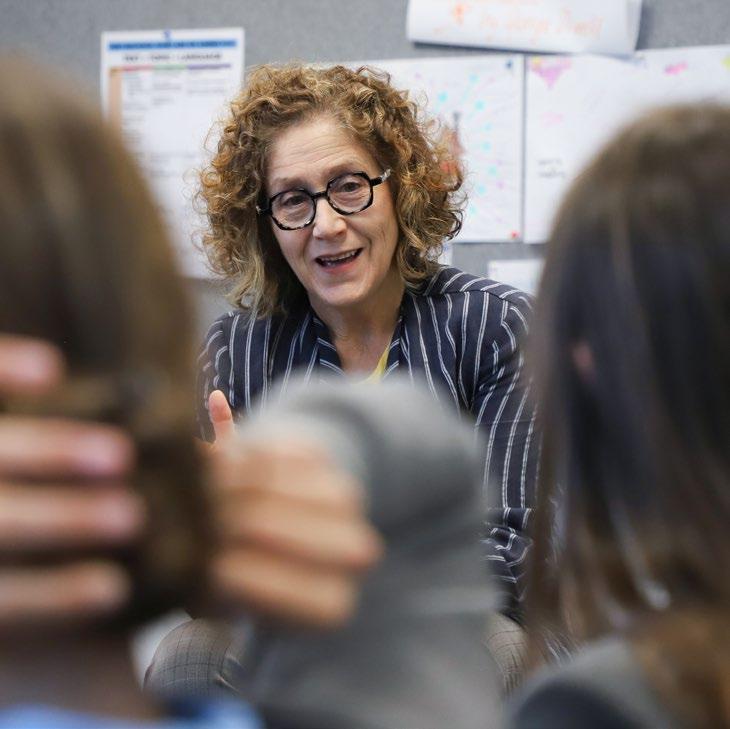
In 2022 our teachers of Languages are embarking on a professional learning journey to build the learning dispositions of the language learner in each St Catherine’s student. At each Year level, in each Language, and in each lesson, we seek to develop students’ agency through metacognitive practices and to embed their linguistic knowledge through deliberate practice.
For second language learners these dispositions are reflected in the Australian Curriculum for Languages, which articulates the goals for all Australian students through the Strands of Communicating and Understanding.
Menzies Foundation Emerging Leaders Fellowship recipient, Lan-Tian Yen-West studies both Chinese and French. Having already visited Hangzhou in 2019, she spent the 2021 holidays at our Sister School, the Cours Fénélon in Toulon.
“You realise how cool communication is. I was sitting beside a Brazilian man on the plane who travels the world with his pharmaceutical company. He was fluent in seven languages. We started conversing in English and swapped into French when he told me he speaks French. We talked the rest of the way in French.” Lan-Tian Yen-West
Students’ capacities for success in a second (or third) language requires deep engagement, not only with the language as a system, but how that language is reflected in its cultural norms and practices. Our curriculum constantly creates these links between Language and Culture. Classroom activities support students’ growing understanding of the dynamic nature of language, which changes according to region, context and purpose. I can commend to you the current NGV Exhibition on the legacy of couturière Gabrielle “Coco” Chanel to develop students’ intercultural understanding.
St Catherine’s provides a range of resources to enable students to build their linguistic and cultural knowledge. Ask your daughter whether she regularly practises her skills using her Language Perfect subscription, YABLA, News in Slow French or Blooket? Mastery in a second language requires deliberate practice of reading, writing, listening and speaking skills. Our high achieving alumnae of 2021 exhibited the dispositions of agency and deliberate practice in different ways:
“For me, I found consistency to be my best friend throughout VCE French. Every night in the latter half of the year, I would speak for 20 or so minutes in French with a friend from class. No exceptions, as tempting as it is to procrastinate. On my way to School most mornings, I would listen to a French podcast, in lieu of French music, as I tended to focus more on the words and conversation than musical rhythm. Finally, if I learned a new word, I would make an effort to use it twice more naturally that week, so I used new terminology in an array of circumstances.” Ruby Moir, Class of 2021
Acquiring a second language involves making connections, both linguistic and cultural between the Australian context and the second language. 2021 alumnue Tingquan (Gloria) Meng (’21) achieved outstanding results in Japanese. She identified metacognitive practices which supported her second language acquisition. She recommends that students:
“Understand your own language before learning a new language, so that you can find the similarities and differences between languages, which can help you understand more about new languages, for example, how are the sentences structured? How do you change tense? Is there a similar concept in another language?”
In Year 11 French this week, students were able to read about Putin’s policies in the Ukraine on the website 1Jour 1Actu. Students then compared perspectives between Australia and Europe and how current events reflect differing historical, cultural and political perspectives.
Our Senior Years Independent Learning Tutorials support students’ agency and give them a structure to direct their own learning. After her return from France, Lan-Tian reflected on the way agency is important for her VCE studies:
“My exchange experience has made me more able to manage the stresses of Year 12 because I’ve been operating independently in France. I travelled independently between countries, so balancing my studies seems really manageable. I haven’t been stressed so far this year. I’m not relying on others. I’m taking more control of things because I’ve learned to do so. There is nothing VCE can throw at me that I won’t be able to manage.”
Clearly one of the most powerful learning experiences is an immersion exchange. There is strong pent up demand, with over 20 St Catherine’s students having registered their interest. We hope to support all these students of Languages build their linguistic and cultural understanding. Lan-Tian explained how her own exchange has enhanced her language learning.
“I started the year snowboarding in the Alps. At the airport, in Paris I was asking people for help in French and negotiating everyday transactions. Basically, I have been totally immersed and I have returned immersed. It’s now natural to watch a TV program or read a book in French. It’s natural and I don’t have to think about it. This is obviously the ideal way to embark on Year 12.”
The above reflections on learning from current and past students highlight the School’s commitment to developing St Catherine’s students who are Bold, Resilient, Creative and Independent.

Name: Miss Kristy Forrest Title: Pedagogy Coach, English Teacher
Date: 18 March 2022
Strategic Intent: Exemplary Staff
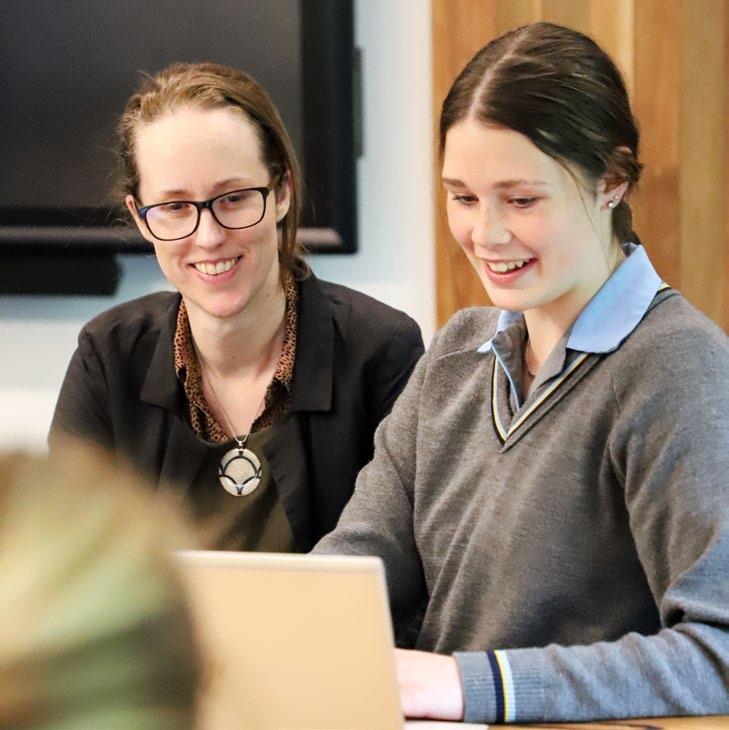
Since 2018, as part of our Towards 2025 Strategic Plan, to cultivate the ‘Thinking Classroom’, the staff at St Catherine’s School have focused on building our capacity in current thinking pedagogies.
A thinking pedagogy seeks to make the intrinsic connection between thinking and learning explicit in classroom practice, rather than something assumed to be taking place as part of regular instruction. It requires teachers to make the cognitive elements of an academic subject visible to students, so they are then, in turn, able to monitor and regulate their thinking and thus, improve their learning. It involves shifting away from the mere transmission of content knowledge to a recognition in the words of Harvard University’s Project Zero, Director, Ron Ritchhart, that ‘true understanding of a discipline involves learning its processes and ways of thinking’. [1]
In 2019, to support our approach, we commenced a partnership with the Centre for Critical and Creative Thinking at the University of Queensland. The Centre’s projects are based on the doctoral work of its director, Dr Peter Ellerton, who is one of Australia’s leading experts in critical thinking education. In developing teacher expertise, the Teaching for Thinking approach begins with three central provocations:
How do you know students are thinking in your classroom?
How do you plan for student thinking?
How do you provide feedback on student thinking?
Throughout the past three years, Dr Ellerton and his colleague Adam Kuss have regularly addressed the teaching staff and academic leaders of the school, on such topics as: planning in the language of student cognition; creating meaningful collaborative opportunities in the classroom and developing thinking dispositions in students and staff. The result has been a shift in methodology towards the cultivation of student thinking capacity, which has resulted in some exemplary models of practice from our highly skilled staff.
Last week, Dr Ellerton delivered his first on site address in two years, on how to leverage the power of the ‘Golden Tetrad’ of the cognitive skills of explanation, analysis, evaluation and justification, through assessment tasks, questioning and learning opportunities. It was a timely reminder of the need to insert cognitive complexity in all of our lessons to ensure that our students develop the intellectual traits needed for academic success.
The partnership with the University of Queensland also ensures that St Catherine’s maintains strong links with academia, meaning that we can respond to the latest educational research and incorporate it into our practice. With the launch of our new Learning Framework in 2022, we have been able to adopt our learnings from Teaching for Thinking over the past three years, and place it as the core pedagogical driver in our new, wholistic model of learning. We look forward to actioning this model throughout our Professional Learning Teams and Faculties as we continue to refine our practice in the years ahead.
[1]
Ritchart, ‘Creating Cultures of Thinking’. JName: Michelle Caroll Title: Principal
Date: 25 March 2022 Strategic Intent: Co-Curricular Opportunities

It was a triumphant performance by our Rowing crews last weekend at the annual Head of the Schoolgirls (HOSG) Regatta on the Barwon River, Geelong. The Senior Division One Crew, rowing in the MMXXI, otherwise known as Maxxi, were victorious in the A Final for the second year in a row.
Winning through their Heat on Friday, and Semi-Final on Saturday assured the Crew of an ideal middle lane, and as the footage reveals, the Crew took an early lead in the race and did not let the go.
Congratulations to our Rowing Captains, Zara Bongiorno and Bronte Cullen, Cox Summer Balla-Kellett, Sarah Marriott, Zara Peele, Sienna Darcy, Jemima Wilcox, Lucy Green, Chloe Nevins and Coaches, Mr John Saunders and Brigette Carlile. A fine history-making performance of back-to-back wins for St Catherine’s School.
Our Senior Division Two Senior Crew were also highly competitive in their A Final, being narrowly defeated for the title. They have enjoyed a competitive tussle with Geelong Grammar for first place at each regatta this season. Needless to say, the girls were most deserving of being on the dais for their valiant effort, and receiving the Silver Medal holds much pride.
Our Years 9 and 10 Crews relished the opportunity to participate in such a large regatta, performing across the weekend in heats, repechages, and finals. The support and cheering of all crews were notable across the weekend, albeit led to some very hoarse voices for our members of staff and students on Monday.
Thank you to the Heyington Club and committed parents for hosting the St Catherine’s community at their superbly decorated marquee. Their enthusiasm for being part of the weekend and supporting ‘girls sport’ was tremendous with their presence, which was one of excitement and anticipation. This visibly speaks to the unity of the St Catherine’s community.
With the Black Box Theatre nearing completion, we now turn our focus to the next phase of the re-development of the Dorothy Pizzey Centre, which will include a contemporary indoor sports court, a dedicated High-Performance Training Studio, inclusive of a fit-for-purpose ergometer training area, and Little Gym housing our PMP and Tumbling programs for the enjoyment of our younger students.
This week, I have undertaken research regarding the unique opportunity girls’ schools have to create a culture in which being active is valued and admired. Creating a culture of participation is instrumental to the success of St Catherine’s Sport Programs, with no better example than our winning performance over the weekend in Geelong. We know if girls are physically active, they will be healthier, happier, have higher self-esteem and body confidence.
Overall, research finds that although families are the most powerful influence on a child’s activity levels, schools are seen as the most important sites for change. This is often associated with the staff that engages and enthuses girls to ‘stay in the game’.
Member of the winning Senior Division One Crew at HOSG, Sarah Marriott, credits her teachers as being most influential in her sports participation last year:
“I definitely would not have been able to stay motivated without the help of the STC Sports staff (Mr Racina, Miss Carlile, Ms Hobson, Lloyd Knight, John Saunders and Kemble,) as they were continuously running virtual sessions to help us stay connected, as well as interim STC challenges and competitions. This also motivated me to manage my time to exercise and work hard in my academic studies. This year, I have been involved in many School Co-curricular activities, both physically and virtually, including Rowing, Athletics, Cross Country and Duke of Edinburgh.”
This week, Sarah shared with me that our Head of Rowing, Brigette Carlile is, “definitely an incredible role model to us girls, and her organisation, composure, and commitment inspires us in more than just Rowing.”
Indeed, schools have a unique opportunity, not just to deliver physical education and school sport well, but to also create a culture in which being active is the norm.
Despite Sarah and her Senior Crew members’ eagerness to be active, the research tells us that not all girls enthusiastically get involved, or want to make the team, be the best, or commit to training. For a whole range of reasons, we know that girls drop out of sport.
Having worked in girls’ education for 30 years, I have witnessed time and again that ‘making active attractive’ in school is not always straightforward when the barriers can be so varied. Tapping into their sporting enthusiasm can be tricky and requires offering a range of sports, a range of clothing, a balance between highly competitive activities and just playing for fun, and importantly, bathrooms they feel comfortable changing in; the gender differences I suspect are stark! Research also suggests as girls grow,
they begin to place greater emphasis on appearance over health and feel it is more important to be thin than fit.
Our own sports participation data in Term 1 reveals that approximately 85% of Years 7 and 8 students are engaged in at least one form of St Catherine’s Sport. This includes GSV, Run Group, and/or the STC Netball Club and approximately 80% of Years 9 and 10 students are engaged in at least one form of St Catherine’s Sport that includes Rowing, GSV, Run Group, Yoga, and/or the STC Netball Club.
Yet after this, we experienced a drop off in Term 1 to 35% for our Years 11 and 12 Cohorts, as academic loads increase and part-time jobs also require a commitment of time. I am keen to explore this age group further, and that of the 15% in our younger Cohorts who are not participating. What do we need to do, as a school, to ensure these girls graduate with a pursuit of an active adult life?
While influences can be deeply entrenched, schools have a fantastic opportunity to ‘buck the trend’ and create a school-wide culture of fit, healthy young women, who retain their love of fitness and activity throughout their lives.
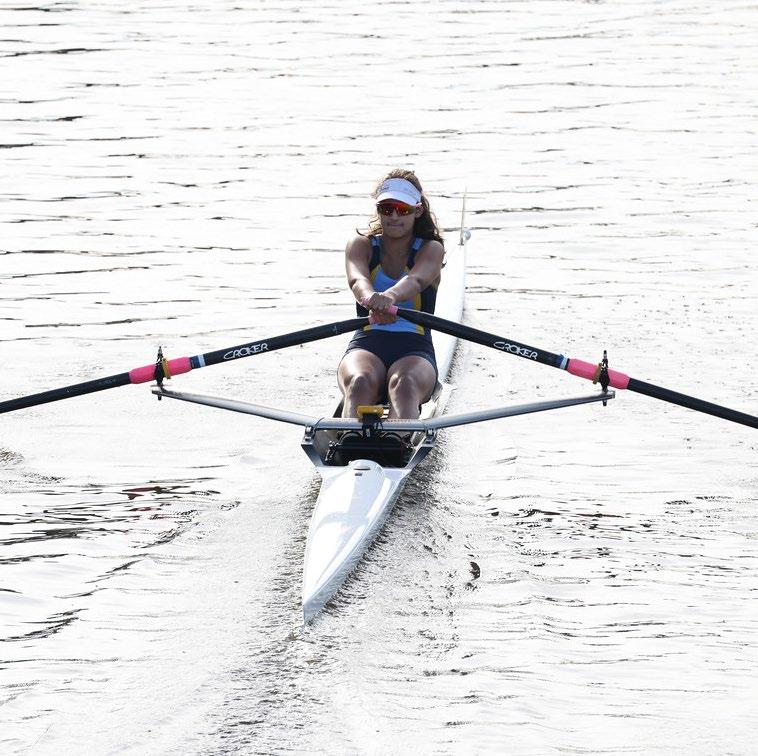
Name: Mr Robert Marshall Title: Deputy Principal – Strategy & Culture
Date: 25 March 2022 Strategic Intent: Academic Achievement

Earlier this year, a major bridge collapsed in Pittsburgh, Pennsylvania. Fortunately, there was no loss of life, however news reports suggested there was a lack of maintenance over the years, and the foundations were deemed to be in a poor state despite the bridge only being 50 years old.
By contrast, the Millau Viaduct, constructed in 2004 in France, is a wonder of modern engineering. Standing at 343 meters tall it is most famous for being the tallest bridge in the world. The complex bridge has extremely robust foundations which, will ensure this elegant structure stands for many years to come.
The importance of building solid foundations is also of great importance in learning. In Barbreck, a great deal of time and planning has gone into the provision of essential education foundations. In doing so, a firm base for learning, conducive to our students becoming strong and capable learners, is achieved.
Literacy and numeracy are the two giant building blocks in our learning program. These educational pillars receive 50 per cent of classroom time allocation. Numeracy curriculum involves problem solving, identifying patterns, thinking logically and making predictions. Numeracy also requires students to be precise, accurate and coherent. The skills and knowledge in numeracy are important, not just in Mathematics, but across other academic demands in school and beyond.
Our literacy program is equally important for our girls. Literacy skills in reading comprehension, writing with fluidity and clarity, communication through the written word and verbally are all essential if students are to enjoy a successful academic life at School.
The Barbreck Academic Program is one which emphasises a rigorous curriculum, is intellectually demanding and requires students to constantly strive in their learning. We aim for our students to achieve at the highest level possible.
A case in point is our 2021 NAPLAN results. Our NAPLAN averages exceed State and National averages by a significant margin. For example, our average Year 5 NAPLAN score is above the State Year 7 average. Also, our Year 3 average NAPLAN score is equal to the Year 5 National average, and only marginally below the State Year 5 average. Likewise, our Year 7 average NAPLAN score is above the Year 9 State average. Our excellent NAPLAN achievements are the result of well planned and implemented learning programs, delivered by skilful teachers.
It is no coincidence our 2021 VCE results rank us as the number one girls school in Victoria. A strong Year 12 result can only occur because of the strong foundations laid in earlier years. The learning which occurs in Barbreck, year in and year out, lay a strong foundation for the senior years of school.
Strong bridges need strong foundations. Our Academic Program in Barbreck is much like a bridge. Literacy and numeracy are the two big foundation stones and like a suspension bridge, all other subject learning is supported by them.
Just as bridges require continuous monitoring, so to do schools and their learning programs. Barbreck teachers constantly monitor the performance of our students so their changing needs can be addressed and the greatest progress can be made.
The Millau Viaduct is a fine example of where careful planning, successful design, skilful implementation and delivery, have produced an outstanding and beautiful structure. Our Academic Program in Barbreck has many similarities. Strong foundations = strong bridges. In schools, strong learning foundations = strong and capable students.
Name: Ms Sarah Bethune Title: Head of ELC
Date: 1 April 2022 Strategic Intent: Academic Achievement

Communication is an integral part of our Early Learning Centre curriculum. From birth, children begin to learn to communicate with others for a range of purposes. They are intrinsically motivated to share their ideas, thoughts, questions, and feelings and to use a range of tools and media to express themselves and connect with others.
When children become part of a languagerich, group learning environment, they begin to implement all aspects of their communication.
Through our Early Learning Programs, we aim to work towards developing the children’s communication skills and understandings and assist them to become effective communicators in a range of contexts.
Learning Outcome
5: Children are effective communicators
5.1 Children interact verbally and non-verbally with others for a range of purposes
5.2 Children engage with a range of texts and gain meaning from these texts
5.3 Children express ideas and make meaning using a range of media
5.4 Children begin to understand how symbols and pattern systems work
5.5 Children use information and communication technologies to access information, investigate ideas and represent their thinking
Literacy and numeracy capabilities are important aspects of communication and are vital to successful learning across the curriculum. Literacy and numeracy experiences are richly embedded in our Early Learning Programs. It is critical that these experiences are relevant and meaningful in the context of the children’s lives.
“Positive attitudes and competencies in literacy and numeracy are essential for children’s successful learning.
The foundations of these competencies are built in childhood.” Early Years Learning Framework for Australia
Literacy is the capacity, confidence, and disposition to use language in all its forms. Literacy incorporates a range of modes of communication including music, movement, dance, storytelling, visual arts, media, and drama. It also includes electronic and print-based media.
Children are exposed to a range of books and texts within the Program. Print is displayed within the classroom learning environments and children have opportunities to engage with stories, learn songs, rhymes, poems and play with words. Children engage in regular conversation and discussion with their peers and educators. They learn the roles of listening and speaking and develop an understanding that conversation is a reciprocal exchange. Numeracy is the capacity, confidence, and disposition to use mathematics in daily life. Children are provided with play and inquiry-based opportunities to explore and learn more about the concepts of numbers, shapes, patterns, measurement, classification, time, currency, and space. It is important that children have opportunities to apply these understandings to everyday contexts so that they learn how these understandings apply to daily life.
Technology is integrated into the children’s play, experiences, and inquiries. The children learn new skills and techniques on how to use technology and develop an understanding that technology can be used for exploring new information. The use of technology is not isolated, it is interactive as small groups of children and educators collaborate. Technology is integrated into the Program for a specific purpose or a specific inquiry.
The frequent conversations and discussions echoing from the ELC classrooms are testament to the richness of the opportunities that are designed to enhance their children’s communication and assist them to become effective communicators over time.
Name: Mrs Gina Peele Title: Deputy Principal – School Operations
Date: 6 May 2022 Strategic Intent: Co-Curricular Opportunities
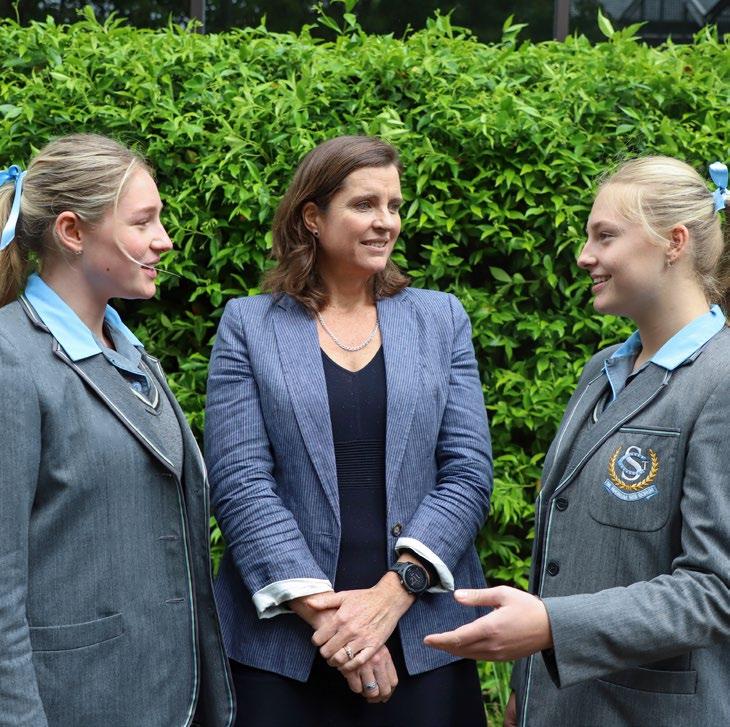
“Innovation is the specific instrument of entrepreneurship. It is the act that endows resources with a new capacity.”
Peter Drucker, Management Consultant, Educator, Author
This week many St Catherine’s students from both our Junior and Senior Schools, along with their mothers and grandmothers enjoyed our Mother & Daughter Breakfast in the lead up to Mother’s Day this Sunday. Guest Speaker at the event was St Catherine’s Alumnae and successful entrepreneur, Georgia Beattie (’04), CEO and Shareholder of Bulla Park, Australia’s largest organic mushroom farm.
During the breakfast event, Georgia shared memories of her time at St Catherine’s and provided the audience with insights into her entrepreneurial journey, even whilst at School, commenting that she always challenged the status quo, often finding her approach was different from other students around her. It was indeed her innate observations and continual drive for change that became her greatest strength in the commercial world.
Post-School, Georgia enrolled in the RMIT Entrepreneurship Program and was soon offered a scholarship to Babson College in Boston. During this experience, Georgia learnt to take an idea to market, from some of America’s most successful entrepreneurs.
During a music festival, where she experienced the limitation of being unable to purchase glassware to drink from, Georgia raised the venture capital to create the business Lupé, an fully recyclable single-serve, shatterproof wine glass. This product revolutionised how festival-goers purchase their drinks.
From here, Georgia moved to Bulla Park, where she has innovated and shifted the landscape in mushroom farming, creating clean food via environmentally clean agriculture practices. Bulla Park is now Australia’s largest organic mushroom farm, turning over 15 tonnes of mushrooms per week, with the goal to double in size each year through the use of high-performance farming technology to achieve fast growth and scale.
As Georgia described to our breakfast guests “the entrepreneurial journey is a choose your own adventure,” where you can “think differently, constantly.”
St Catherine’s Finance, Business and Entrepreneurship Elective in Year 9, supports our students to innovate and think boldly and creatively as they develop their own entrepreneurial adventures. Through product and idea development based on pain points they experience in everyday life, our young entrepreneurs expand their creative thinking, collaborate with their peers, reflect and reset their own thinking to new and broader pathways, inquire deeply into the needs of consumers, all whilst sharpening their higher-order cognitive skills and metacognition.
As Drucker comments, “Innovation is the specific instrument of entrepreneurship.” Our Year 9 students discuss different innovations that have occurred over the past centuries. An example our Year 9 students understand is the change in the way we listen to, and play music, with the changes from the phonograph (1877), cassette player (1932), CD player (1980), MP3 Player, smartphone, and cloud service. This innovation has occurred over a century through the use of technology and adapting to the needs of consumers.
St Catherine’s Learning Framework focuses on providing every student with a strong foundation to reach their aspirations in learning and in life. The Finance Business and Entrepreneurship Elective offers our Year 9 students the opportunity to be bold and adopt a fearless mindset, develop the courage and confidence to take risks in learning, and strive to grow through the collaboration of ideas and enhanced development of their innovations.
I am excited about the opportunities and creations this year’s students will bring to the table and the future St Catherine’s entrepreneurs who will change the world we live in, just like Georgia Beattie.
Name: Mrs Elka Gaensler Title: Head of Learning Plus
Date: 13 May 2022 Strategic Intent: Academic Achievement
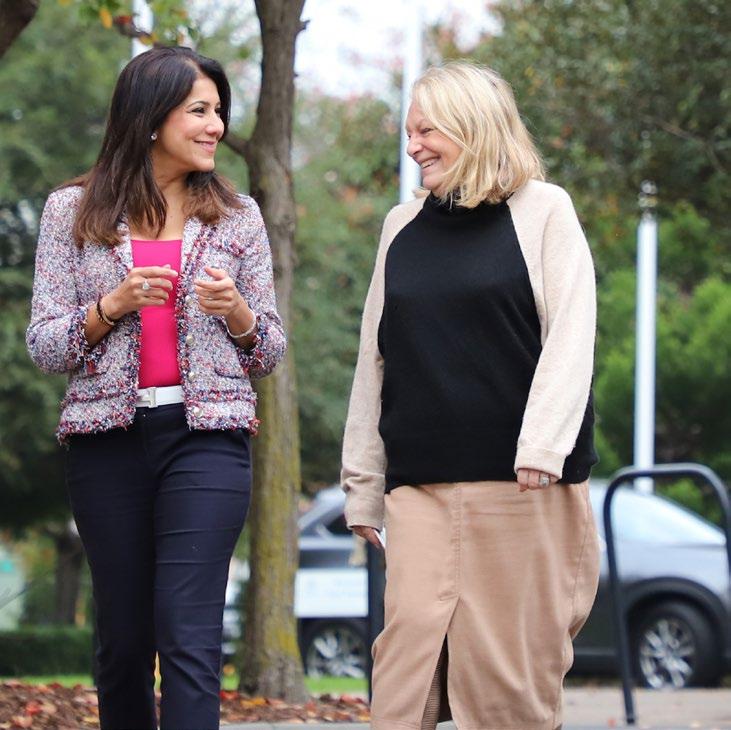
Education is relational. A partnership if you will.
In Education, there are a number of partners in this relationship, all vital to the success of all our students. In order to best support our girls, it is crucial that the partnership between home and school is characterised by mutual respect, trust, and open lines of communication. This is the foundation for enabling us to concentrate on maximising your daughter and our students’ progress and development.
Some years ago, I came across a simple but effective analogy to reflect the importance of the partnership between home and school. Picture if you will a triangle.
Imagine the point where two sides of a triangle meet: the student. The other two sides are the parents and the school. When all three points meet, the foundation (base) is solid, however, when one or the other side does not meet, we have dissonance.
In educational terms, we are limited in what we can do to attain the ‘apex,’ (best student learning outcomes). Naturally, we have individual learning plans in place, and they go far to enable students with learning challenges and gifts to engage with the curriculum. However, without a harmonious partnership, we cannot and will not achieve the potential for our students. We depend on you.
Underpinning all we do is value the importance of student wellbeing. This focus runs in tandem with our academic
care. Our teachers place an emphasis on nurturing our students. This is not merely a platitude but has been played out in a recent survey by Swinburne University which found over 80% of our students feel nurtured at St Catherine’s School. Many schools reported that only 60% of their students felt nurtured, a significant difference.
As parents, the areas of learning difficulties and giftedness can be daunting. Sometimes asking about particular concerns can be onerous. But we, as your partners, are here to support you and your daughters.
We are excited to share our Parent Hub which provides resources that may assist you in a journey to reach an understanding of the academic, social, and emotional factors that may be impacting your daughters’ learning development. There is a caveat on this, however. We certainly do not want you to take to diagnosing or identifying particular learning challenges, but rather share your concerns with us. As educators, we are not Allied Health providers who are the only individuals that can diagnose a particular disability or gift. However, we can guide you and make recommendations based on our expertise in education, and when designing individual learning plans, based on allied health professionals’ recommendations, and in consultation with your daughters where it is appropriate, and of course yourselves.
We value your partnership and look forward to closing the triangle.
Name: Mr Robert Marshall Title: Acting Principal
Date: 20 May 2022 Strategic Intent: Embrace Community
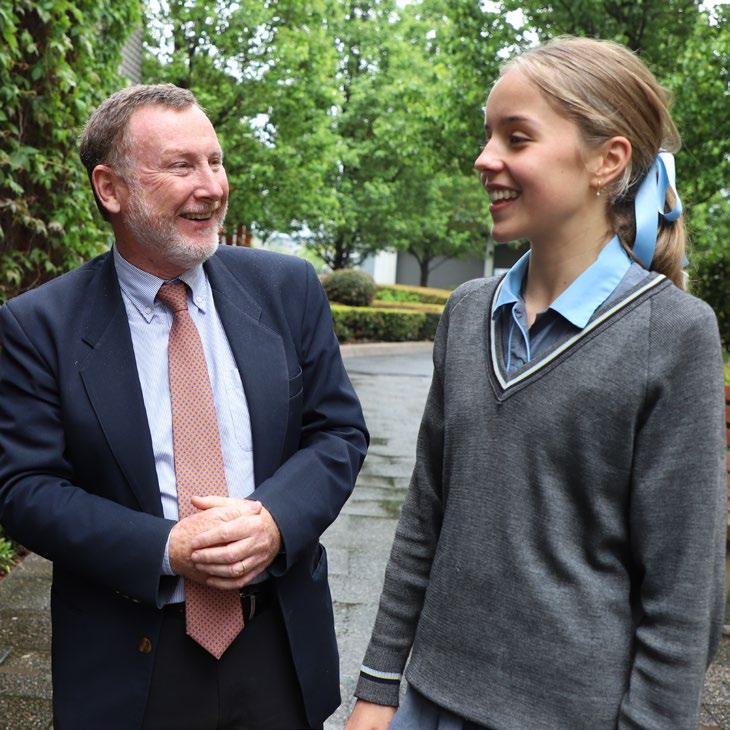
Last week I saw our students perform in the musical Urinetown, in the new and amazing Black Box Theatre.
I have seen many, many school productions in nearly 40 years of teaching, and Urinetown was simply stunning by any criteria. The acting, the dancing, and the singing were all of an extraordinary standard. Being the first production in this new space, the girls rose to the occasion with a performance to remember. I attended the opening night last Thursday and then on Friday I saw the muchacclaimed production of Hamilton in the city. I may not be a theatre critic, but it was our girls’ performance, rather than the extravagant professional production, that will stay in my memory for a long, long time.
By any measure, this performance by our students is the mark of a great school.
Following the production, I contemplated what makes a great school, and if St Catherine’s is indeed a great school. This may seem a straightforward and even a simple question. It is, I believe, an accurate statement to say we are an excellent school but are we great?
Does greatness come from achieving great academic results? Is it being successful in significant sporting competitions? Is it about creating a wonderful play or musical production? Is it about having a culture where positive, respectful relationships are an absolute priority?
The answer is not that simple. Of course, a strong academic program is central to the way in which you would measure school performance. So too is doing well at sport and the other areas I have just mentioned. The list of priorities and performance indicators for a school is long and varied.
Our School Motto, ‘Nil Magnum Nisi Bonum’ – Nothing is great unless it is good, implies there is a condition to achieving greatness. The goodness of intent, spirit, heart, and mind are essential components. Last week I wrote about the beautiful email from another school thanking us for the amazing sportsmanship displayed by our students. This outstanding demonstration of character is certainly what the orchestrators of our School Motto had in mind when they demanded we cannot be great without being good.
There are indicators which suggest we are indeed a great school. This week the highly coveted Australian Education Awards announced the 2022 Excellence awardees. In 2021 our School Principal, Michelle Carroll, received an Excellence Award within the Principal of the Year Excellence category. She was one of only six nominations across Australia. This public acknowledgment of the calibre of our Principal is recognition of her and St Catherine’s standing in the wider community.
For the 2022 Awards, St Catherine’s has been nominated in two particularly important categories.
• Best School Strategic Plan: recognises the best strategic plan developed by a school in Australia.
• Innovation in Learning Environment Design: recognises the best innovation in learning environment design developed by a school in Australia.
Mrs Carroll’s Excellence Award in 2021 was very much an individual honour, although I know Michelle would attribute her Award to the great team behind her. The categories we have been nominated for in 2022 are certainly about the work of the team.
Our Strategic Plan, Towards 2025 was the culmination of inputs from the whole School community, crafted over a period of time. It brings together the commitment to preparing our girls for the future. We strive for our girls to be Bold, Independent, Resilient, and Creative. These are not mere words. They have been developed through many conversations and through deliberate intent to make St Catherine’s the best it can be.
The Award for Best Strategic Plan considers the following criteria:
• Consultation and engagement with the school community
• Demonstrated strategic development of the plan to ensure it meets defined school needs and business objectives
• Implementation process that includes clear priorities and goals in defined timeframes
• Results and progress to date
Jim Collins, in his hugely popular and influential book Good to Great, comments that “greatness is not a function of circumstance. Greatness, it turns out, is largely a matter of conscious choice, and discipline.”
The Towards 2025 Strategic Plan deliberately and consciously sets out Six Strategic Intents. It guides the School’s vision for our teaching and learning agenda, which is our absolute focus.
As part of the Towards 2025 Strategic Vision, value statements have been developed to align our School Values with tangible actions, providing shared meaning, relevance, and accessibility to all students. These Values are Integrity, Empathy, Perseverance, Curiosity, and Gratitude. Each Value is fundamental for each person and indeed a school to be considered good.
The second Excellence Award is for Innovation in Learning Environment Design. This Award recognises excellence in the design of a student learning environment in an Australian school.
The following criteria were considered:
• Consultation and engagement to determine the need for innovation
• Stakeholder engagement and school community consultation in the design process
• How the learning environment reflects pedagogy
• Change management and implementation process to transition into the new space
• Evaluation of the effectiveness of the learning environment
During the numerous lockdowns when schools were closed due to the pandemic, our teachers and students had to adapt. The result of this experience over the last two years and our learnings from it has resulted in an innovative, creative and, some may say, a bold model of learning. Our hybrid model of teaching and learning for our Years 10 and 11 students involves a combination of synchronous and asynchronous teaching. In other words, some face-to-face and some online learning. This transformation has been the culmination of research, learning from our experience, and designing a learning model which suits the complex and contemporary demands of today and tomorrow.
When discussing change in organisations, Jim Collins remarks “lasting transformations from good to great follow a general pattern of build-up followed by breakthrough.”
Over several years this is exactly what St Catherine’s has done and continues to do. Our teachers and students, with the support of parents, have been working hard to produce the St Catherine’s we see today. The development of the Black Box Theatre is an obvious example of our School striving for greatness.
I may be biased, but our girls who performed in Urinetown are an example that St Catherine’s is a great school.
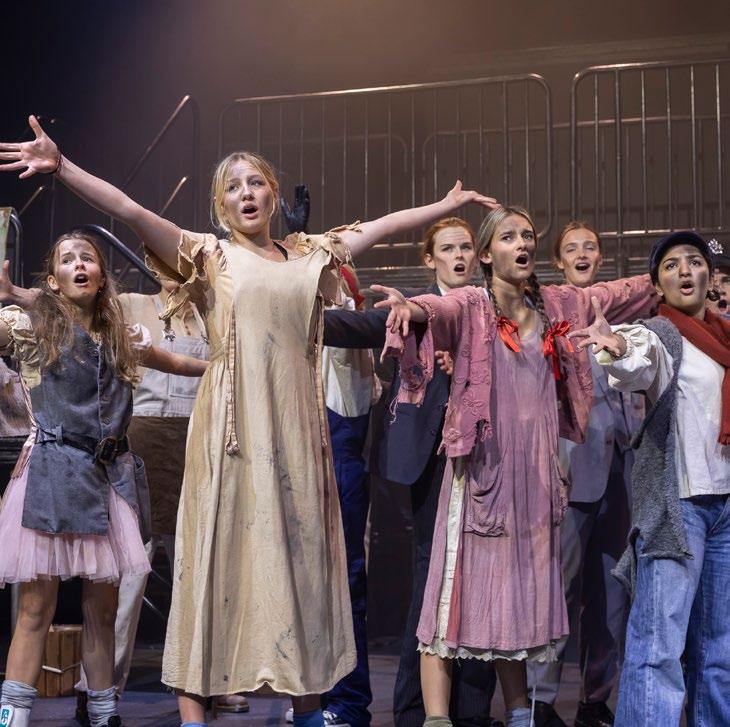
Name: Ms Zoe Poulson and Ms Kristy Tine Title: Careers Practitioners
Date: 27 May 2022 Strategic Intent: Academic Achievement
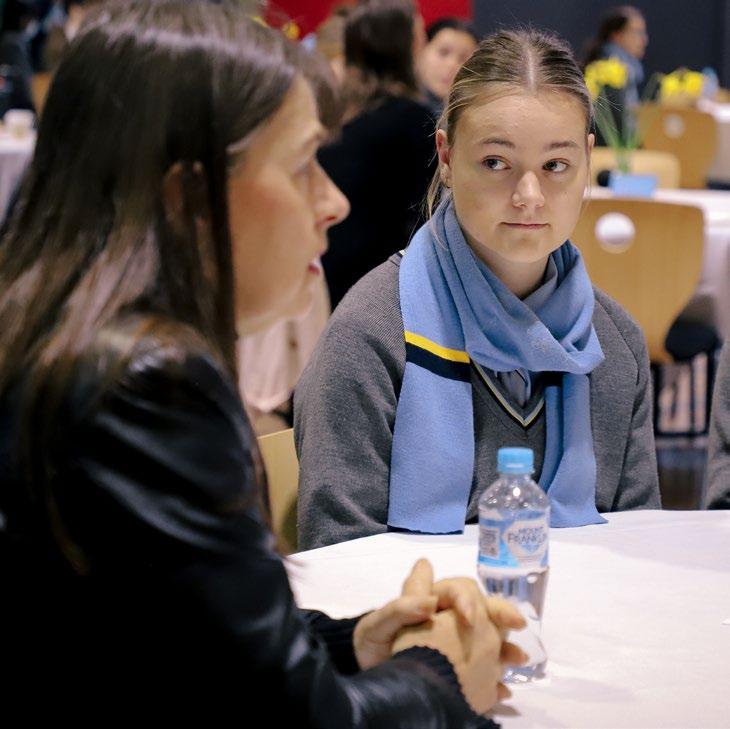
As St Catherine’s Careers Practitioners our role within the School is to assist Senior School students in managing their career pathways through:
• career education
• subject selection
• tertiary applications and beyond
At St Catherine’s, students are provided individualised learning programs which best suit their learning styles. With the guidance of the Careers Department, students are encouraged to explore many facets of the world of work through an extensive range of lessons, programs, information sessions, webinars, publications and resources, and counselling sessions we facilitate.
Over the last two years, career education has evolved to reflect the dynamic and rapidly changing world of education, work, and social interactions. Last year, tertiary institutions provided early offers to some of our Year 12 students who applied for particular courses, while Year 10 students were offered the opportunity to complete work experience online. The pandemic facilitated incidental learning, with families being at home together, with many students observing (somewhat altered) daily tasks undertaken by their parents and carers at home!
This year, we are thrilled to be attending many onsite Careers Practitioner days and sessions run by tertiary
institutions to inform, and indeed promote, a wide variety of courses and pathways. What is particularly interesting is the way many tertiary institutions are responding to the changing landscape of the workplace. They are moving to meet these demands so there will be many opportunities for skilled and educated workers to take up these roles.
Graduating secondary students may also face some hurdles brought to bear by COVID. As our students move from our School setting to tertiary institutions, we want them to be properly equipped to make decisions on what courses best suit them. St Catherine’s also emphasises the importance of being open to all possibilities. There are many pathways to choose from. This term, we have run lunchtime sessions on:
• Early Entry Schemes
• Tailoring your Personal Statements
• UK and USA applications
• ANU Early Offer Scheme
As well as presentations from tertiary institutions such as ANU, RMIT, ACU and Bond University. These sessions have been well attended by Years 11 and 12 students. We encourage all our Senior students to keep up to date with University Open Days which are currently being published by the institutions themselves.
Name: Mr Robert Marshall Title: Acting Principal
Date: 3 June 2022 Strategic Intent: Embrace Community
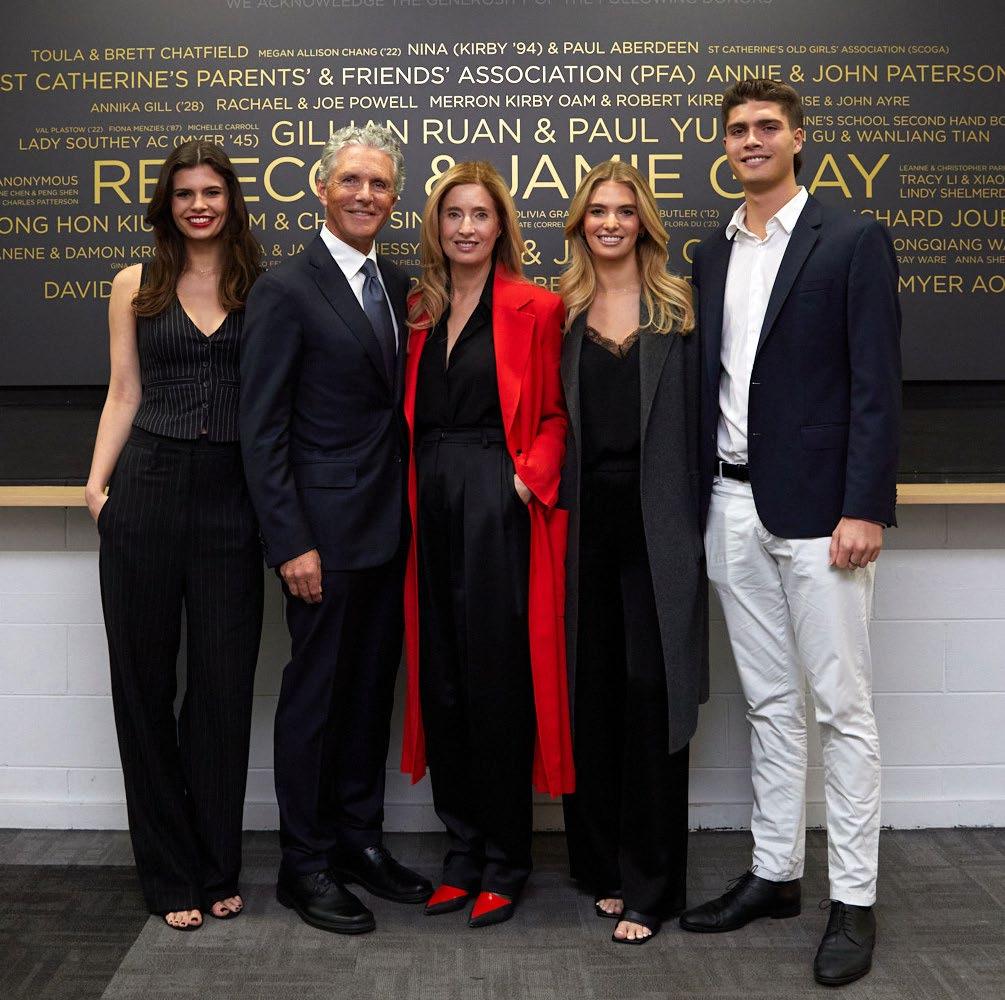
One of the things I enjoy most about St Catherine’s is the strength of our community. It is embedded throughout our School.
Even simple things such as taking a walk through the School grounds reveal the strong relationships which are a defining feature of St Catherine’s. I find that students are always happy to have a chat. Often, the conversation is not about anything of great substance. We chat about the weekend, how did your football team go, what you will be doing in the holidays and other serious matters! However, I always ask how their day is going. How is the study going and so forth. The conversations can be quite revealing, and they can very quickly give me a sense of how students are travelling and the whole student Cohort for that matter. A simple conversation helps make a connection, embeds relationships, and strengthens a sense of community. Recently, we had an outstanding example of how wonderful and strong the St Catherine’s community is. The Jamie & Rebecca Gray Theatre (previously known as the Black Box Theatre) was officially opened on Thursday 19 May by the Hon. Julie Bishop.
Ms Kathy Hines, St Catherine’s Advancement Manager, recently wrote of Jamie and Rebecca Gray in her Blue Ribbon article:
“This naming honour recognises the Gray family’s long association with St Catherine’s School and their philanthropic contributions over many years. Both Jamie and Rebecca have deep connections to our School community. They are parents to Sophie who graduated from St Catherine’s in 2012, Annabelle in 2015 and Hugo, their son, who attended St Catherine’s Early Learning Centre.
Jamie Gray is a long serving Member of School Council having joined in 2002. Additionally, he is Chair of the Building & Property Committee and a Member of the Hardship Fund Sub-Committee. He and Rebecca are great supporters of student scholarships, in addition to Jamie’s generosity for all capital campaigns. They have been strong supporters of the School for many years, with family connections dating back to 1949 with Jamie’s mother, aunt and sister also having attended St Catherine’s School.”
The evening of the opening epitomised everything that is good about our community. The guests gathered represented many generations of connections to our School and we were treated to outstanding performances by our talented students, supported by our wonderful staff. In an earlier Blue Ribbon article, I commented on the Musical, Urinetown and other performances in this wonderful new space. With the development of The Jamie & Rebecca Gray Theatre we now have a place where our community can join together, connect, and celebrate the joy of people working and being together. Another community event held just last week, was the Sports Auxiliary’s Father and Daughter Dinner, held in the Long Room at the MCG with Dr Richard ‘Harry’ Harris, SC, OAM.
Dr Harris is an Australian anaesthetist and cave diver who played a crucial role in the Tham Luang cave rescue in Thailand a few years ago. One of our St Catherine’s parents, Mr Andrew Demetriou, was emcee of the evening and did a wonderful job of coordinating the night as well as introducing Dr Harris.
The evening was a time for dads to enjoy time with their daughters and hear an extraordinary Australian share his experiences of an equally extraordinary
event, which captured the attention of the world. The evening was just delightful. Talking to the dads and their daughters during the evening it was so obvious how enjoyable it was to gather as a community.
Connecting with people is vital. For our School it is important that our staff continue to have conversations with our students and parents. This week, I sat down over breakfast with a small group of Barbreck parents to hear what they think about St Catherine’s. Primarily I was interested in their perspective on the education we are providing for their daughters. For a little over an hour, I asked questions and listened intently to what they had to say. Apart from the obvious conversations about teaching and learning such as reading, writing and math, the discussion kept coming back to the fact that St Catherine’s is a school which nurtures and supports the girls. The word ‘community’ was mentioned time and again.
For communities to thrive, relationships are key. In fact, just as I am writing this paragraph, one of our Year 11 students Mietta Passon, who is selling ‘Big Freeze’ beanies and organising a dunking machine next term to raise money in the fight against Motor Neurone Disease (MND), has walked into the Principal’s Office hoping I would purchase a beanie. Of course, I did buy one, but she then stayed, and we had a chat. What did we talk about? The football, what is happening in the holidays and of course… how she was feeling about the upcoming exams, especially English. In the space of a couple of minutes I was able to connect with her and understand how she is travelling and share in her commitment to our community by selling beanies for a cause greater than herself.
St Catherine’s is a great community, and it is students like Mietta who make me feel connected and proud to be a part of this school.
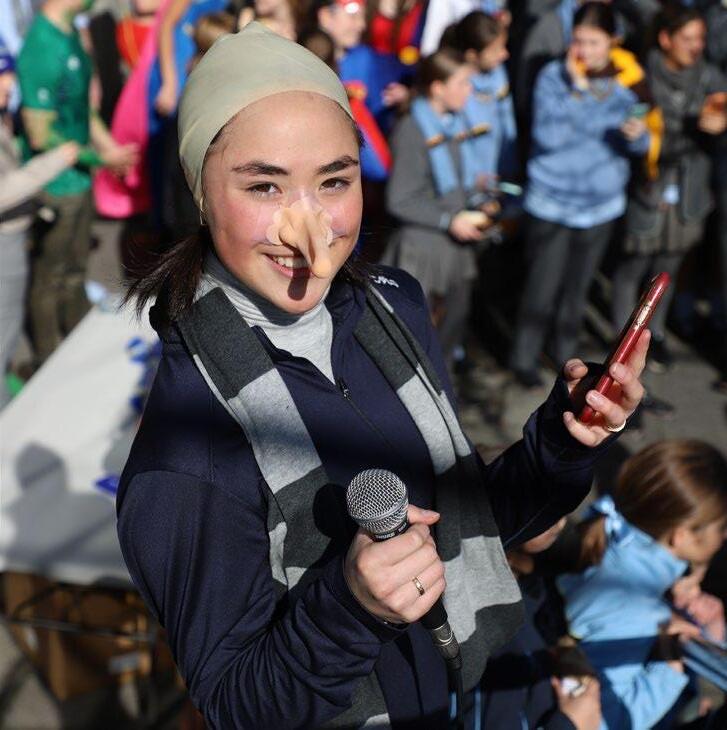
Name: Miss Kristy Forrest Title: Pedagogy Coach, English Teacher
Date: 3 June 2022 Strategic Intent: Exemplary Staff
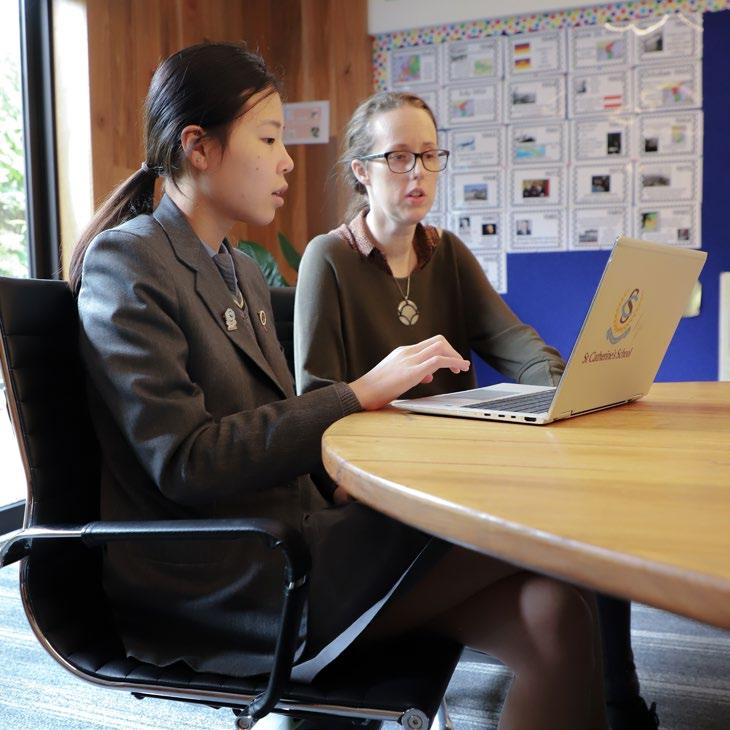
There is a significant body of research that links effective teaching to the reflective capacity of a teacher. In drawing a distinction between experienced and expert teachers, Hattie (2003) explains how an expert teacher:
1. Adopts a problem-solving stance to their work.
2. Are more opportunistic and flexible in their teaching, always seeking to take advantage of new information and seeking new interpretations, rather than relying on previous knowledge or experience.
3. Carefully monitor their ongoing solution attempts in the classroom, checking for accuracy and updating their approach, as necessary.
Thus, while time spent in the classroom is necessary for building expertise, it is not sufficient. Indeed, it is the critical reflective time outside of the classroom, in discussion with knowledgeable peers and coaches, which allows teacher expertise and collective efficacy to develop. The Grattan Institute (2022) has identified the provision of teacher time for collaboration as integral to making gains in student learning outcomes.
Throughout 2021 and 2022, our professional learning has focused on the development of reflective practice in our teaching staff, in line with our Teaching for Thinking project, the development of the Senior Years Learning Model and whole School Learning Framework. Teachers reflect, design, and collaborate with reference to our new learning competencies and dispositions, which ensures that our strategic plan can be actualised in the classroom.
Throughout the academic year, staff meet regularly in crossfaculty teams (led by a learning coach) focused on a specific Year level, as part of a purposeful effort to work collaboratively to improve the learning competency of the students in that Year level. From these discussions, staff then engage in reflective practice, identifying an area for development based on their knowledge of the students and linked to
our School learning competencies. From this point, they design an action plan around the pedagogical imperatives of modelling, scaffolding, and coaching, and then seek to implement it in their teaching. Later, they collect evidence of student learning and reflect on the impact of their project, often making small adjustments for further improvement.
In 2021, such collaborative work resulted in some terrific initiatives and learning outcomes from an expert staff. We were spoilt for choice in sharing practice, and able to open our academic year with two outstanding projects from Head of English, Ms Mary-Anne Keratiotis and Dean of Academics Mrs Alison Cassidy, who generously shared their process with their colleagues, demonstrating the open-minded, critical stance to their own practice that is so necessary to teacher expertise.
This year in our professional learning teams, the ideas have already been impressive, with teams of teachers working together on designing projects around imperatives such as:
• Increasing the metacognitive capacities of senior students to assist them in acting purposefully on feedback and improving deliberate practice.
• Developing independence in Year 9 students through faculty-focused signature programs, to equip them with the skills necessary for transition into the senior years.
• Using scaffolding tools such as thinking routines and online tutorials in Year 10, to improve student self-efficacy.
I look forward to reporting back on the continuously amazing and professional work of my colleagues as the year progresses.
Hattie, J.A.C. (2003, October). Teachers make a difference: What is the research evidence? Paper presented at the Building Teacher Quality: What does the research tell us ACER Research Conference, Melbourne, Australia. Retrieved from http://research.acer.edu.au/research_conference_2003/4/ Hunter, J., Sonnemann, J., and Joiner, R. (2022). Making time for great teaching: How better government policy can help. Grattan Institute
Name: Dr Lee Naylor Title: President, Sports Auxiliary
Date: 3 June 2022 Strategic Intent: Embrace Community
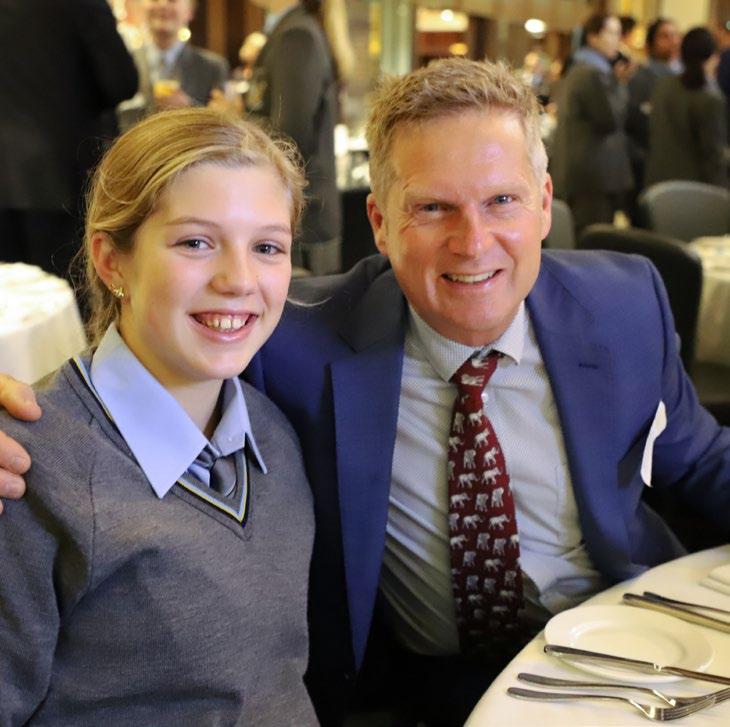
On the evening of Thursday 26 May, in the Long Room at the Melbourne Cricket Ground, St Catherine’s fathers and daughters enjoyed the privilege of listening to the humble success of Dr Richard ‘Harry’ Harris SC OAM, who played a crucial role in the Tham Luang cave rescue in 2018 as a cave diver and anaesthetist.
During the evening Dr Harris outlined his journey towards being a pivotal member of the global recovery effort that saved the lives of 12 Thai junior soccer players and their coach from a Thai cave after monsoonal flooding. Dr Harris intoxicated the audience as he detailed being drawn to photography, deep sea diving and anaesthetics as his medical specialty, which combined have made him a household name.
“Following your passion” was certainly Dr Harris’ message as he generously shared heartfelt information to the audience. His impact was felt so much that in a nod to how emotional and warm the evening was, the Walkinshaw Hot Lap auction item from the night’s auction, was generously donated to Dr Harris, who had earlier disclosed his love of car racing, by auction winner, Mr Phil Dreaver, Father of Sophie in Year 10 and Carys in Year 5. Thank you, Phil.
A special thank you to current and past parent, Mr Andrew Demetriou, Father of Mattea in Year 10 and Alexandra and Francesca (‘21) who emceed the evening and provided a sense of sporting romance to the event, transporting the audience through the journey of the MCG and marking the spot as a teenager where he was startlingly tackled by the great Leigh Mathews!
The Sports Auxiliary was fortunate to provide, and benefit from, auction and raffle items. A special thank you to Mrs Symone Demetriou, Mother of Mattea in Year 10 and Alexandra and Francesca (’21) and Mrs Fleur Heidenreich, mother of Fleur and Stella (’21) for their generous raffle ticket donations, along with Mr Dave Cohen, father of Milla in Year 7 and to Ms Georgina Handbury (Seccull ’86) who facilitated our Walkinshaw Hot Lap auction with Bathurst winning driver Chaz Mostert. Collectively the Sports Auxiliary raised $4,650 from the raffle and auction with proceeds ensuring our girls’ Sports Program is supported and celebrated with equipment and resources.
Name: Lan Tian-Yen West Title: Year 12 Student, Menzies Foundation Global Young Leader
Date: 10 June 2022 Strategic Intent: Student Wellbeing & Leadership
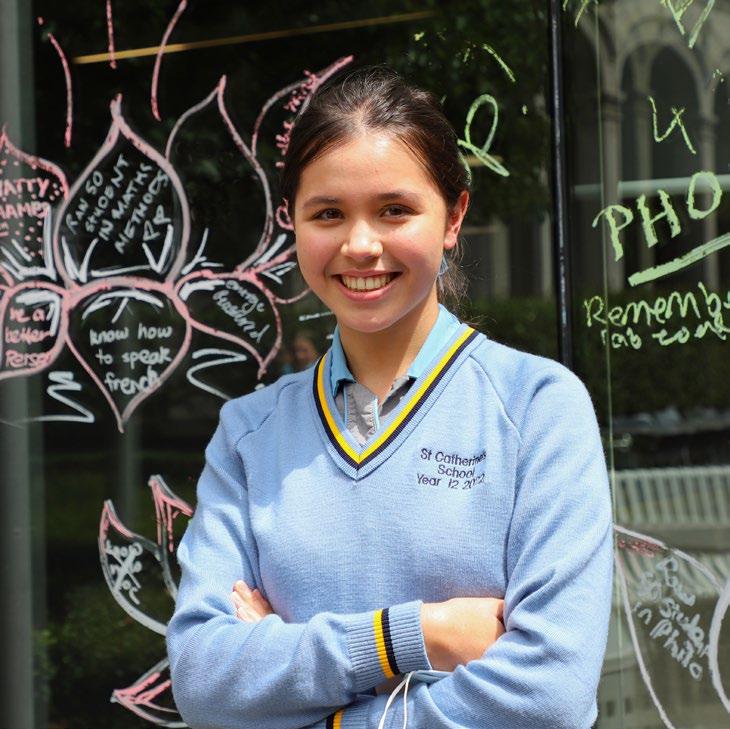
St Catherine’s Year 12 student, Lan Tian Yen-West, powerfully delivered this statement to the Menzies Foundation Emerging Leaders Program in 2021.
Her message, along with a determined vision to create “global connections with female leaders to dismantle a patriarchal system forcing women and minority groups to be silenced,” secured Lan-Tian with one of only 11 Menzies Fellowships in Australia, recognising her as an emerging leader in our nation.
Lan-Tian’s powerful statement recognises that in Australian history, far too many women have been silenced, especially those from a minority background.
As an Asian-Australian woman, Lan-Tian has been raised within both cultures, providing her with a firsthand appreciation for the value global citizenship plays in building personal leadership skills.
“I have a strong desire to have an impact on the world. I want to be bold and challenge popular thoughts and ideas when necessary. I want to be apologetically independent – staying true to my own beliefs and learning from others around me. I want to accept I am a constantly evolving creature – growing and improving through failures and resilience, and I want to express myself with creativity in all that I do, seeing things from different perspectives.”
Inspired by Alexandria Ocasio-Cortez, known for boldly and passionately addressing inequity at the 2021 MET Gala, wearing a dress emblazoned with ‘Tax the Rich’, Lan-Tian aims to model her own leadership project, utilising the $1,000 fellowship endowment from the Menzies Foundation. “I want to address inequity globally.
My aim is to use the financial assistance I received from my Fellowship to create real-world value through a global coalition of young female leaders, dedicated to creating a better tomorrow.”
With a strong sense of social responsibility, Lan-Tian wants to maximise the opportunities and experiences she has been provided to benefit, “my generation and those who have not been given the same tools as I have, such as my St Catherine’s education and opportunities such as the Menzies Fellowship.”
“St Catherine’s has developed an ethical depth within me. I believe you demonstrate who you are when nobody is watching, doing good because it is right, rather than to be seen, this guides my leadership approach.”
Discussing the emerging challenges for her generation, Lan Tian comments that climate change, social isolation as a consequence of social media, and fake news and censorship are pressing issues. There is no doubt Lan-Tian is emerging into her leadership potential and has an exciting future ahead.
Name: Mr Luke Russell Title: Deputy Head of Junior School
Date: 17 June 2022 Strategic Intent: Student Wellbeing & Leadership
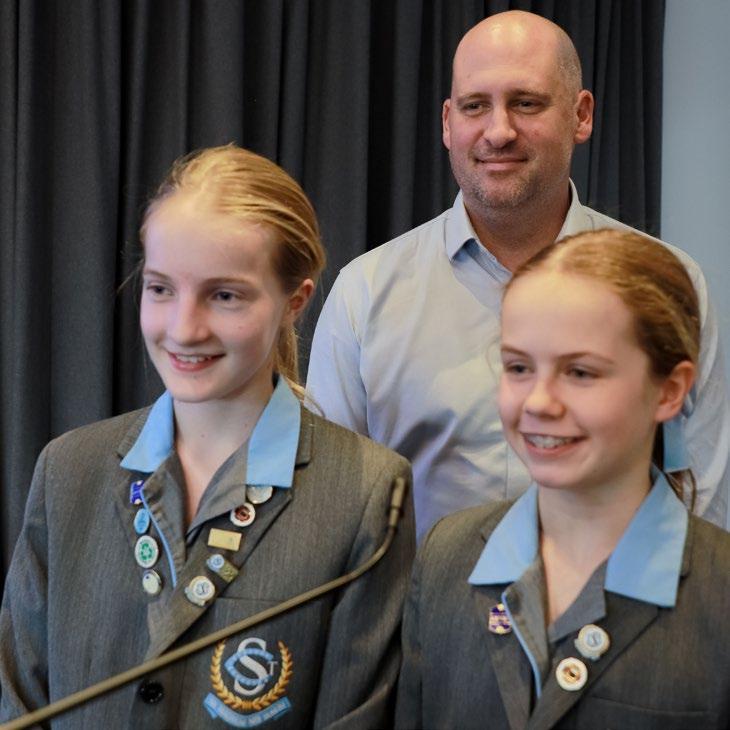
In Barbreck our weekly School Assembly is run by our student leaders. This has been a major focus in the Junior School over the past couple of years, whether that be recorded videos during lockdowns, live online or in-person in the Selina Yao Auditorium in Barbreck.
While teachers assist with planning the topics to be covered and help polish speeches, the voices heard on the day are that of the students, delivered to the students, for the students.
Our engaging Assemblies are run primarily by our Year 6 leaders. The wonderful Barbreck Captains Holly Farrer and Clara Barry are outstanding hosts and have grown into their roles throughout the year. Our Library Captains Olivia Batt and Alexia Chatfield and our Music Captains Annika Gill and Liana Lam have a regular segment, as do our House and Sports Captains. The girls share information, provide reports on events, and hold competitions.
Each week we showcase work from the classrooms in Barbreck and what students are learning about in our specialist classes – French, STEM, Art, Health, and Physical Education.
We regularly welcome Senior School students to our Assemblies. We have had our superstar rowers, famous actors from the Senior School production,
and most recently the Snowsports Captains attended to speak and inspire the Barbreck students.
The benefits of student-led assemblies are immense, building the following skills:
• Public Speaking
• Organisation
• Time management
• Speech preparation
• IT skills
As the year progresses, it is incredibly pleasing to see student confidence grow. Students have an opportunity to build their profile in the School by presenting or performing at Assembly. They can sing, play an instrument, act, or speak about a topic they are passionate about. Students love putting on a good show, and our Barbreck audience loves to be entertained. The Assemblies motivate younger students to contribute and engage in activities within the School and they look forward to their opportunity to present when they move into Year 6.
We think our student-run Assemblies are great and we are very proud of the contribution students make each week. Parents are welcome to attend, and I encourage them to attend whenever possible.
Name: Mrs Ceri Lloyd Title: Director of Teaching and Learning
Date: 23 June 2022 Strategic Intent: Academic Achievement
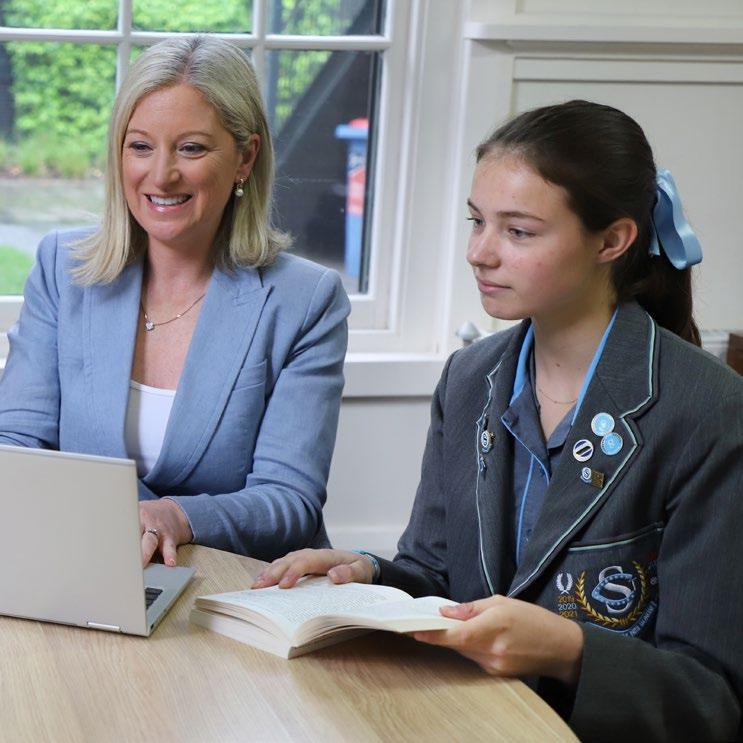
As we near the conclusion of Term 2 there is much to report on in the teaching and learning space as we continue to innovate and redefine our academic programs embedding our Teaching and Learning Framework across all subject areas.
I often focus on St Catherine’s character dispositions –Bold, Independent, Resilient, and Creative during my presentations. For me, these are not just words that you state and define, they must be visible in the programs and curriculum. As a school our academic programs must deliver on creating learning pathways that develop in students all these dispositions, for school and post-school pathways.
I am proud of the work we have done and the commitment of our Middle Leaders and teachers to enact change and create programs that engage students with rigor and positive outcomes which we review and evaluate consistently. I am always looking at how we can continue to engage and develop our academic care model for the benefit of all our students’ personalised learning pathways.
There has been ongoing work implementing strategies and programs that align with our Towards 2025 Strategic Plan. I am pleased to share that our new Learning Behaviours have been implemented across all Year levels and will be part of the Semester 1 reporting process. I have presented to all students and teachers how these learning behaviours align to our learner competencies and are written to clearly show students the key skills they need to develop.
Whether they are Emerging, Developing, Establishing, Proficient or Accomplished, the students now understand
that their learning is progressive and the acquisition of self-efficacy, agency, and inquiry (just to name a few), is directly aligned to their thinking. Our students can see that their achievements are not only measured by a grade, but importantly, the development of skills and a mindset around how they learn, and more importantly, think.
In all that we do our teachers work in partnership with our learners to create personalised pathways. Wellbeing, academic and careers teachers work together to support our learners and it is this feature that makes St Catherine’s so unique.
This term we have been focused on GAT (General Achievement Test) conversations with our Year 12 students leading into their Practice GAT. Discussions on careers with our Year 10s through Morrisby and presentations have commenced on subject selection and VCE acceleration for Years 9, 10 and 11 students. The consistent academic care model is applied across all Year levels and is one that I reference constantly with the Middle Leaders.
The Years 7 and 8 Honours program has provided a pathway for accelerating students in specific subject areas. In Mathematics girls work on the Maths Enrichment Series which is run by the Australian Maths Trust. In Humanities the focus is on the inextricable connection between historical events and politics – investigating and comparing six different global political systems and how they have been shaped and formed by history. In English, the focus is on creative writing with a view of building towards the Write a Book in a Day collaborative project. In Science the focus is on developing scientific thinkers who can raise questions and solve problems.
The Year 9 Harkness-inspired Critical Conversations Program has become a key feature of our Year 9 Signature program. This offering allows students to develop their thinking skills through developing curiosity in asking questions, solving problems independently, academic risk taking and developing persistence even when they are unsure. The learning model is unique and allows the students to lead the critical conversations in small classes with the teacher acting as an observer. I am excited about the deep-thinking taking place in these classrooms and the inquiry approach to learning that embodies our character dispositions.
It is wonderful to be recognised for our learning innovations and it is with considerable pride that I let you know we have been nominated in the Australian Educator Awards for an excellence award in the category of Innovation in Learning Environment Design.
This is for our Senior Years Learning Model, specifically the introduction of the Independent Learning Tutorials in Years 10 and 11 in 2021. There were hundreds of nominations across Australia, and we have been shortlisted with five other schools. The introduction of our hybrid learning model at Years 10 and 11 is another unique and innovative approach to learning at St Catherine’s. This model again demonstrates that like our learners, we are prepared to take a risk and be bold, independent, creative, and resilient.
I take this opportunity to wish you all a safe and restful holiday period and I look forward to seeing you all next term.
Student Care
Consistent & Supportive
Every Lesson – Every Day provided continuity, structure and routine of the school day.
Teacher Mastery
Outstanding teacher expertise in ICT skills, analyses of academic data and innovative curriculum design for learning online.
High levels of personalised student care by committed teachers with smaller class sizes that enable targeted teaching.
Intersection of syllabus content and student thinking with feedback and the evaluation of thinking to ensure girls use knowledge effectively.
High levels of personalised student care by committed teachers with smaller class sizes that enable targeted teaching.
Clarity of Learning
Intentions and explicit teaching of exam technique to ensure assessment readiness.
Intersection of syllabus content and student thinking with feedback and the evaluation of thinking to ensure girls use knowledge effectively.
Strong learning culture creating a trusting student-teacher-parent partnership.
Name: Mr Robert Marshall Title: Deputy Principal – Strategy & Culture
Date: 30 June 2022 Strategic Intent: Academic Achievement
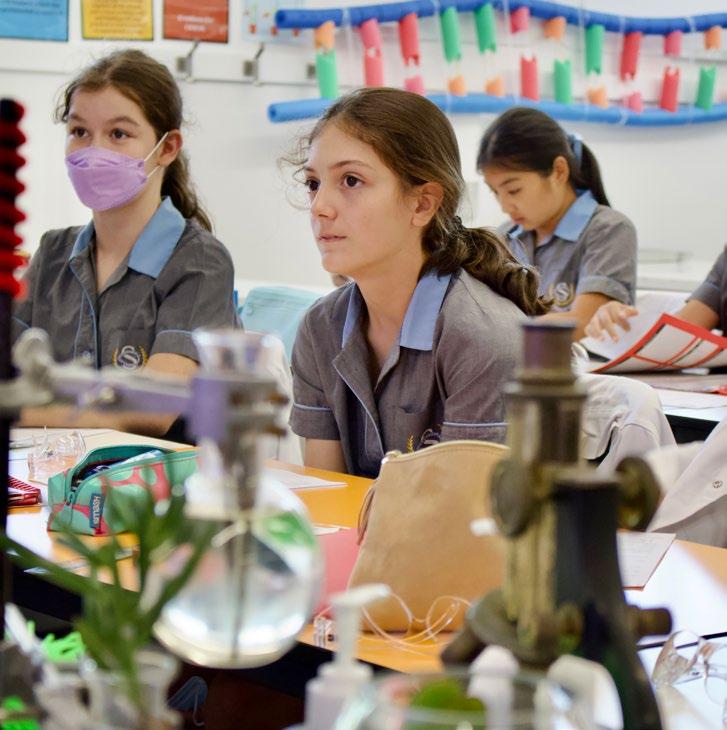
Featured in our latest edition of St Catherine’s News, Mr Rob Marshall, provides insights into the importance of transition in achieving educational success for our students.
Like many in football mad Melbourne, I watch with keen interest the rise and rise of the AFLW competition. Daisy Pearce, the Captain of Melbourne is probably the number one high profile player in the game. It has been interesting to watch the role Daisy has played in not only leading the team but assisting Tayla Harris since her move from Carlton.
Tayla, a bright young talent, burst into the spotlight beyond football after a photograph of her was published. The image of ‘That kick’ was a defining moment in women’s sport pushing back against the sexism which followed the photograph’s publication. Since moving to Melbourne, Daisy has assisted Tayla in her transition from a good, but inconsistent player, to the number one player for contested marks in 2022.
A child’s educational journey also needs effective transition at important times. The move from Year 6 to Year 7 is arguably the most important. At St Catherine’s, commencing in 2022, Barbreck Year 6 students will be involved in an Academic Transition Program within the core subjects of English, Mathematics, Science and STEM, and Health. The program aims to support students as they move from the upper primary years, through to the middle years of schooling in Years 7 and 8 in the Senior School.
For STEM classes, Ms Tori Shaw, Barbreck STEM Specialist and Ms Vanessa Jackson-McRae, Head of Science in the Senior School, guide our Junior School students. It is quite unique to have a Senior School Head of Faculty conducting classes with Junior School students. Ms Jackson-McRae’s classes are held in the Senior School Science Laboratories for our Year 6 students, which also assists and readies them for their transition to Year 7.
In addition to Science, our Year 6 teachers will specialise n their passion teaching areas, with Ms Sandra Ching teaching Mathematics across both classes, along with Senior School teachers working with our Years 5 and 6 Extension Groups, providing specialist expertise. In English, Mrs Jodie Bacon will teach across the two classes and in Health, Senior School Health a nd Physical Education teacher, Ms Samantha Basford, will teach the Barbreck Health program to both classes.
This Transition Program introduces the girls to Senior School facilities, engages them with expert staff in specialist fields of study and introduces Senior School practices prior to Year 7, ensuring they experience a smooth journey and strong academic bridge to Year 7 and beyond.
Just as Daisy Pearce made the transition of new players into the Club a priority, St Catherine’s transition program from Barbreck to the Senior School also needs to be one where the girls continue to thrive and grow –she who is well prepared, transitions well!
Name: Michelle Carroll Title: Principal
Date: 22 July2022 Strategic Intent: Co-Curricular Opportunities
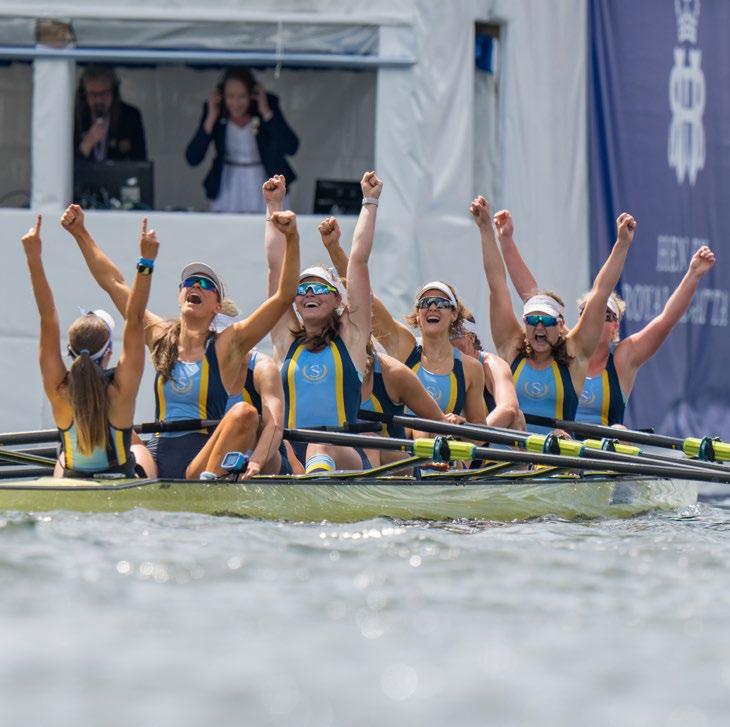
I have enjoyed the opportunity to reconnect with colleagues, students, and family members this week as we return to School for Term 3.
My highlight this week was our vibrant Senior School Assembly on Tuesday, that included the attendance of our bright and bubbly Barbreck girls, together with our Senior students, and teachers. We delighted in applauding our First VIII Rowing Crew for their tremendous win at the Henley Royal Regatta, a Crew now recognised as the fastest schoolgirl crew in the world.
The audience were keenly interested to hear of the stories behind this history making win, particularly, listening to the voice recording of the final 20 seconds of the race by the Cox, Summer Balla-Kellet… an almost unrecognisable voice from the Summer we know!
The Crew commenced their 6.00am pre-season training sessions during the Melbourne winter lockdown last year on ergos via MS Teams, whilst located at home. Witnessing their journey has certainly provided our students with a stunning lesson on perseverance and growth – realising that how we commence an activity does not always dictate the final outcome. It is evident that with determination, collegiality, strategy, and the guidance of key people, we can change our trajectory forever.
With a 12-week training period between winning at the Nationals in April, and competing at Henley in June, coaches Miss Brigette Carlile and Mr John Saunders, decided to re-build the stroke technique of the Crew through disciplined and repetitive drills completed at every on-water session. This culminated in the ‘aggressive’ stroke that was frequently commented on by the English commentators at the Henley Regatta “the Melbourne Crew has a very, very aggressive style, this is a style you don’t see from many men’s eights, let alone a women’s eight.” One wonders about the commentators’ reflections – women rowing aggressively?
Commencing in 1839, the Henley Royal Regatta is steeped in tradition. It is a significant annual event for the London Season – the (very) English social season. The strict dress code, observed by our Crew wearing long dresses and blazers at the trophy presentation, provided a colourful backdrop and a brilliant display of how old rules and traditions survive in modern days and perhaps, in an effort to keep the history of the Henley Regatta alive.
Housed together in Henley for two weeks, the nine girls and two coaches found a rhythm to their day that was respectful of each other as they navigated the chores of laundry, dietary differences and the highs and lows of such an emotional week – captured in a true and unique team experience. The girls drew inspiration from the 97 drawings gifted to them by our Barbreck girls on departure, with the pictures adorning the walls of their Henley home. The social media and mobile phone bans also left a few parents in awe of the pseudo-parenting by John and Brigette. Their care for each other was intentional and refined through weeks of deliberate team building conversations undertaken in Term 2, and despite the close living quarters, I was so proud to hear of the poise, grace, and humility in which the girls conducted themselves throughout their tour in the UK.
Indeed, the Henley Regatta winning experience has united and inspired the St Catherine’s community. And for every student, a lesson in dedication, striving for one’s goals, believing in oneself and the collective effort of a team is visible for us all.
Our pride in this achievement abounds.
Name: Michelle Carroll Title: Principal
Date: 29 July2022 Strategic Intent: Student Wellbeing & Leadership
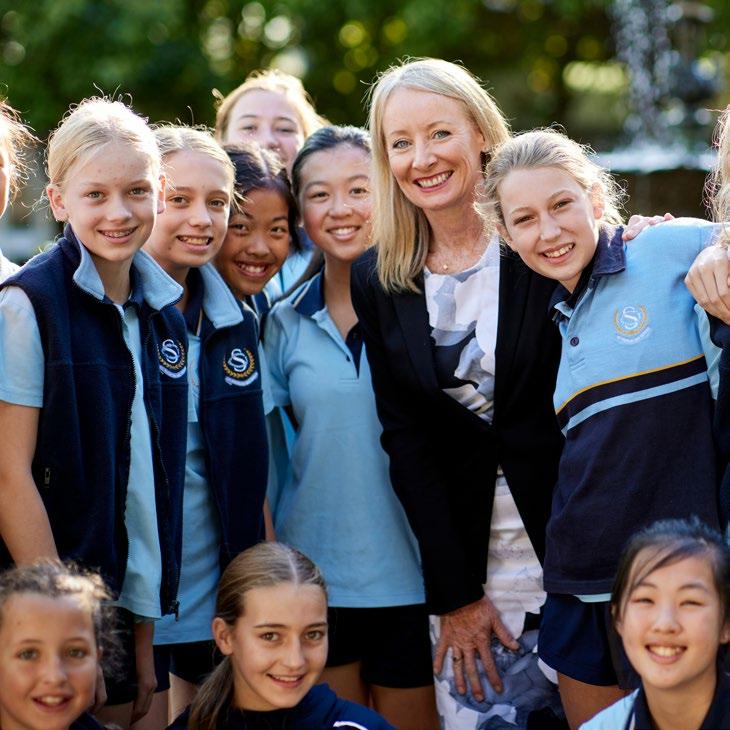
During my sabbatical, I enjoyed finding time for a podcast walk around 3.30pm each day when I would usually be found at the Heyington Gates. The beach stretch between Peregian Beach and Coolum was my favourite podcast stroll, but it is also hard to go past the colours of the Kimberley at Cable Beach, Western Australia.
I had previously not been accustomed to the world of podcasts; suffice to say I am now a convert. Leadership, girls’ education, and academics were my ‘go to,’ but I also extended to various Australian-based mysteries that can lead to interesting conversations with friends and family also sharing their favourite listening.
The Alliance of Girls’ Schools Australasia has recently released a series of podcasts with leading American Psychologist, Dr Lisa Damour, PhD. Author of two New York Times bestselling books: Untangled – Guiding Teenage Girls through the Seven Transitions into Adulthood and Under Pressure – Confronting the Epidemic of Stress and Anxiety, Lisa has led some refreshing thinking on our approaches to caring for girls post COVID, in particular, working through the challenges of anxiety disorders that arose during adolescents at this time.
In her podcast, Damour discusses stress, anxiety, and girls, highlighting the impact of the global pandemic and the opportunity for schools and teachers to normalise students’ experiences of stress and anxiety and in doing so, opening new paths for cultivating resilience.
Damour’s key discussion relates to how we take stress and anxiety and turn it into fuel for girls. What does it mean for everyone in the world to experience psychological distress, not equally distributed, but certainly a universal experience over these past two years?
Damour believes we need to change how we talk about mental health, how we talk about stress, how we talk about anxiety and how we make sense of it and make use of it. Damour considers our current language and approach to
mental health to be problematic – starting with the definition of mental health. A definition that suggests you are (only) mentally healthy when you feel calm and relaxed.
Whilst the belief that you are mentally healthy when you feel good is okay, this is a hugely problematic definition because it is not something that is ever fully attainable, nor is it something you can sustain for very long.
As such, Damour is keen to reset the definition of what mental health is today. Damour prefers to define mental health as when you have the ‘right feeling’ at the ‘right time.’
For example, if you lose someone you love, you feel sad and experience grief. During this time, we can learn how to manage that sadness and grief effectively. Another example is when someone crosses you, or if somebody does something awful – feeling angry is evidence of mental health. That is the right feeling at the right time, especially when it is paired with the ability to manage that anger effectively.
The current definition of mental health (feeling calm and relaxed all the time) seemed to gain traction alongside the growth of the ‘wellness industry.’ The commercialisation of ‘wellness’ with the sale of products that promise wellness sits alongside an extensive range of commercial products that ‘sell’ you wellness and are designed to help you feel good.
Over time, Damour has become increasingly suspicious about the ‘sale of the idea’ that we are supposed to feel good all the time. The reality is we have a wide range of emotions, some positive, some negative, some light, some dark.
Damour is encouraging educators to reset the definition of mental health with the notion of ‘right feeling at the right time.’ With this new definition, a new language and a new discourse can exist about anxiety and stress.
Psychologists have always considered anxiety to be a normal healthy emotion. It is a fundamentally protective emotion as it is an alarm that rings when something is not right. In essence, we should overwhelmingly frame anxiety
as a friend, the ‘right feeling at the right time’ is telling us something is off track, telling us it is time to pay attention.
For girls, we need them to also see their anxiety as normal and healthy. We want them to actually embrace it and recognise its usefulness as a signal that it is time to pay attention. Looking at anxiety through this different lens allows us to witness its benefits, that in almost all situations it is operating as a healthy signal to reassess, make adaptations and grow in capacity
Damour stipulates that to allow stress and anxiety to be ‘growth-giving’ girls must be provided with ‘restorative intervals,’ opportunities for them to socially connect with other people, participate in enjoyable distractions and enjoy moments of self-care, to help them grow and build their capacities after stressful or anxious moments.
Whilst young people can revert to social media to connect, this can be likened to a slot machine, where you are not always sure what you are going to receive back. What we hope for are connections that provide a more guaranteed return, authentic connections with their peers, families and teachers that reinforce to them that they are known, they are loved, and they are accepted.
Our Year 9 Cohort, currently immersed in camp life in Western Australia are enjoying the opportunity to make these real connections, and I to, am looking forward to reconnecting with the girls whilst on camp with them. I am curious to understand more deeply how they connect with each other, sans phones and social media, left with face-to-face conversations and restorative time to create enjoyable memories together.

Name: Ms Liv Cher Title: Acting Director of School Operations
Date: 12 August 2022 Strategic Intent: Student Wellbeing & Leadership

As a community we find ourselves at a time where there are increased rates of stress, anxiety, and depression amongst our youth.
In each of these areas, girls are represented at a much higher rate in comparison to their male counterparts. A recent report from the Australian Institute of Health and Welfare on Australia’s youth focused on people between the ages of 12 and 24 (AIHW, 2021). The Report found:
• 30 percent of girls have symptoms of self-reported anxiety, stress or depression compared to 14 percent of boys.
• 30 percent of young women as opposed to 21 percent of young men reported having a long term mental or behavioural condition.
• Anxiety followed by depressive disorders are the most common disorders amongst young women.
This gender imbalance is not limited to adolescents. Data retrieved from the American College Health Association from the National College Health Assessment shows 43 percent of young women in undergraduate courses are more likely than males to report feeling overcome by anxiety. They are more overwhelmed and exhausted, and experience higher levels of stress (ACHA, 2014).
Despite all this, psychologists continue to note that the mental states of both stress and anxiety have healthy forms (Wu et al., 2013). They believe them to be catalysts for the growth and development of humans. This is because the stress of operating beyond our comfort zone builds our capacity to cope with future challenges by developing our resilience. Similarly, anxiety, which produces emotional discomfort, alerts us to focus our senses to home in on our decision-making capacity in difficult situations.
As adults, we desperately want to help our young people navigate the challenges they face. When we see our teenagers experiencing emotional discomfort,
the temptation is often to remove the obstacle in their path, thus eliminating stress or symptoms of anxiety. However, in the long term this can prevent our young people from developing agency, independence, and resilience (Ashokan et al., 2016; Damour, 2017).
American clinical psychologist and author, Dr Lisa Damour specialises in the development of teenage girls. She suggests a better alternative is to empathise with your daughter and then to ask her what help she needs to ‘handle’ the cards she has been dealt. Not only does this generate acceptance, but also builds her sense of capacity to deal with the situation and develops ‘stress inoculation,’ enabling her to cope better in future moments of discomfort (Damour, 2017).
This Term, our Year 11 students have embarked on their 2023 Leadership journey.
By way of introduction to the process, 2022 School Co-Captain, Madeline (Maddie) Powell and Environment Captain, Arabella Llewelyn addressed the Cohort about their own journeys. From the outset, Maddie and Arabella were clear and open about the fact that the leadership process would, at times, be stressful. Both Captains believed that the best way to deal with this stress was to acknowledge and accept it, but to also embrace the opportunity before them to lead change at St Catherine’s. Arabella explained that regardless of what position you do or do not get, “every person here has the capacity to lead, and you will find that you will work as a Cohort to shape the way you want the School to be.”
The leadership process requires students to self-reflect, to recognise their skills, passions, and strengths. After watching others, year in and year out take up student leadership roles within the School, it can be challenging to find the courage to apply for a position. Often students feel uncomfortable recognising, recording, justifying, and revealing to others their ability and desires when in the pursuit of a position.
It requires courage to place oneself in a vulnerable situation, where they are chosen by their peers. Once elected to a position, there are, as Maddie explained, some rocky moments along the way. “You will encounter the storming, forming, norming process. Storming, where you encounter conflicts, you might initially find hard to navigate. Forming, where you develop your capacity and approach to dealing with adversity, and norming, where you finally get your leadership skills to a level where they become a part of everyday life.” Maddie explained that the difficult moments in the storming and forming phases built her capacity to lead and leave a better legacy than she would have otherwise.
As we wish all applicants well, we acknowledge that there is great learning embedded in this process. The students will most certainly encounter challenges along their journeys. This might happen when applying, through the voting period, when unexpected results occur or during their leadership tenure.
No doubt, there will be moments of emotional discomfort. As emerging leaders, with or without official titles, as difficult as these moments may be, if they are to grow from the experience, the question remains ‘how will you handle that?’
References
American College Health Association. (2014). American College Health Association-National College Health Assessment II: Reference group and executive summary. Hanover, MD: American College Health Association. Ashokan, A., Sivasubramanian, M., & Mitra, R. (2016). Seeding Stress Resilience through Inoculation. Neural plasticity, 2016, 4928081. https://doi.org/10.1155/2016/4928081
Australian Institute of Health and Welfare. (2021). Australia’s youth: Mental illness. Retrieved from https://www.aihw.gov.au/reports/children-youth/mental-illness
Damour, L. (2019). Under pressure: Confronting the epidemic of stress and anxiety in girls. Atlantic Books, London
Wu, G., Feder, A., Cohen, H., Kim, J. J., Calderon, S., Charney, D. S., & Mathé, A. A. (2013). Understanding resilience. Frontiers in behavioral neuroscience, 7, 10. https://doi.org/10.3389/fnbeh.2013.00010

Name: Mrs Angela Klancic Title: Head of Mathematics
Date: 19 August 2022 Strategic Intent: Academic Achievement
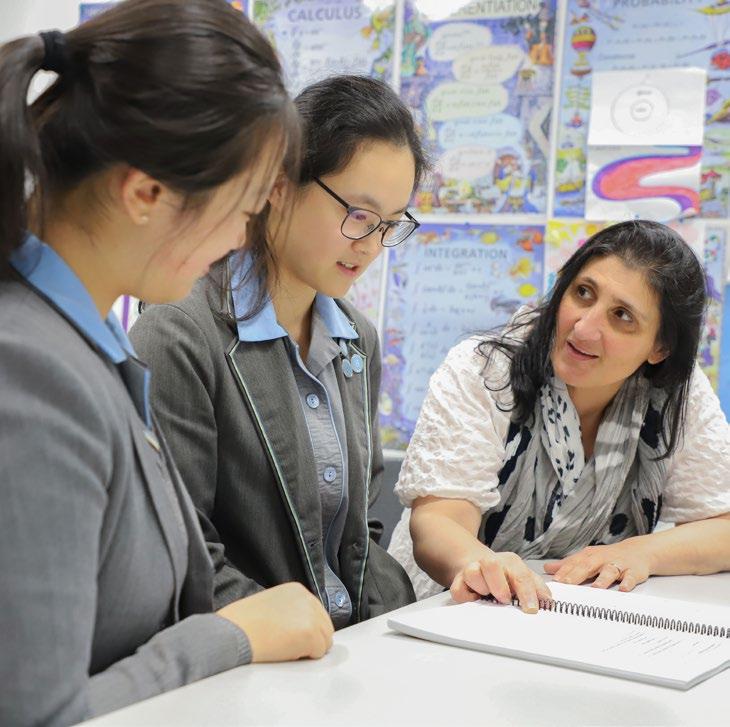
Problem solving is an essential skill set to have throughout life. At St Catherine’s we provide opportunities for our students to deliberately develop this capacity throughout all their learning.
Within Mathematics, students have had several opportunities to explore and enrich their mathematics education both in, and out, of the classroom. The curriculum is particularly designed to build a solid foundation of understanding in arithmetic, algebra, measurement, geometry, probability, and statistics. Which then opens the door to problem solving. As the girls transition into their senior years, they start engaging with more complex and abstract concepts, some of which are challenging problems and require multi-step processes to solve.
Problem Solving enthusiasts this year have enjoyed several opportunities to engage in their passion for mathematics. Students in Years 7 and 8 participated in the Mathematics Olympiad run by the Australasian Problem-Solving Mathematical Olympiad. Whilst some have also been involved in competitions run by Australian Mathematics Trust such as Kangourou sans Frontiéres, Computational Algorithmic Thinking and the Australian Mathematics Competition. All these programs are intended to stimulate and encourage our girls to become creative problem solvers and it also is quite entertaining!
Our Honours students have been extended outside the School curriculum in the Mathematics Enrichment Program.
Students in Year 6 completed problems that include estimation, polyhedra, divisibility, patterns (including Fibonacci numbers), networks and decision-making mathematics as well as base 5 arithmetic, whilst engaging in specific problem-solving techniques.
The Year 7 students tackle problems that involve primes and composites, least common multiples, highest common factors, arithmetic sequences, figurate numbers, congruence, properties of angles and pigeonhole principle. Year 8 students are challenged with activities that require an understanding of geometry with special reference to parallels, similarity, and Pythagoras’ theorem. They are also required to use spreadsheets, Diophantine equations, counting techniques and congruence.
St Catherine’s strives to challenge students, particularly in Mathematics. Problem solving and enrichment within our courses is a deliberate practice that encourages resilience and provides a rich platform for growth as a mathematician.
Students use and develop competencies when they encounter unfamiliar or challenging situations and in turn, they draw and build upon what they already know. In Mathematics, students develop and apply competencies via these experiences.
Problem solving demands us to infer, model, rationalise, reason, and apply knowledge whilst making links between existing information. It is also lots of fun!
Name: Michelle Carroll Title: Principal
Date: 26 August 2022 Strategic Intent: Academic Achievement
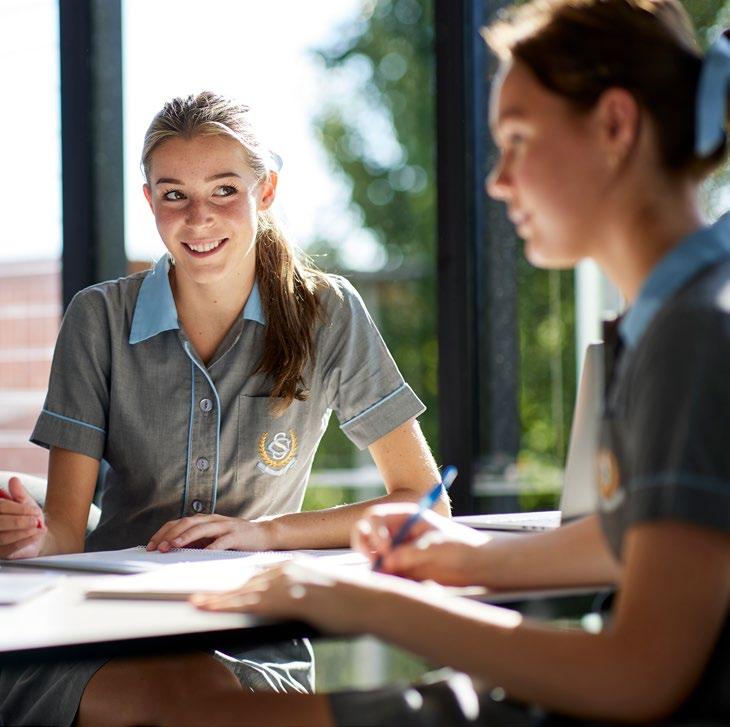
Interestingly, in 2013, 93% of employers surveyed by the Association of American Colleges and Universities agreed with the statement that a (job) candidate’s demonstrated ability to ‘think critically, communicate clearly, and solve complex problems is more important than their undergraduate major.’
In other words, ‘what you know’ is not as important as ‘how you know.’ This reveals the need to prioritise critical and innovative thinking over recalling content knowledge.
The question for educators is – how should we respond? How do we prepare our students to become the knowledge makers, the innovators, and the problems solvers of the future?
Ultimately, we need to make education more about thinking and intellectual challenge.
Questioning our approach to classroom thinking to enhance the student experience has shaped much of our Professional Learning Seminars over the past three years. Through our partnership with Dr Peter Ellerton, from the University of Queensland’s Critical Thinking Project, we have explored the following three questions:
How do you know students are thinking in your classroom?
How do you plan for student thinking?
How do you give feedback on student thinking?
St Catherine’s School’s Classroom Thinking Agenda deliberately moves our teaching and learning practices away from simple lecturing and the recall of memorised facts into a dynamic culture of continual learning, where students are asked to select, shuffle, justify, re-combine and apply existing knowledge to create innovative ideas and fresh solutions.
As we step forward each year with new VCE Study Designs, there are more frequent calls for students to have a stronger capacity for critical and analytical thinking. Of course, these thinking skills are also desired well beyond school as they shape much of the knowledge economy and the changing nature of the workforce. Students resorting to a learning approach captured in the sentiment of “just tell me what I need to learn” and simply memorising work is no longer considered a successful, nor an effective, learning option.
On Monday, our Senior School teaching staff continued their professional learning journey during a session with Dr Ellerton, focusing on the theme – Cultivating the Thinking Classroom.
During the session, Ellerton spoke of the importance of teacher intent in question design, narrowing this specifically to the language adopted within assessment tasks and classroom practice. Ellerton notes that through effectively opening the lines of inquiry, teachers can explore student interpretations, develop rigour in student reasoning, provide feedback and challenge thinking.
Through the effective development of questions by teachers, students are encouraged to challenge their thinking and explain and justify their responses. From this, teachers then have the power to activate many cognitive skills that shift students’ responses from guess work or speculation to considered judgments.
During a recent discussion with Associate Professor of Education and Enterprise, Dr Philip Cummins and educational thought leader, Mr Adriano Di Prato, on their Game Changers podcast, I share why our Year 9 Critical Conversations Program and Senior Years Learning Model, are platforms for the delivery of our Thinking Agenda and how St Catherine’s realises its vision of graduating women of the future through building the capacities of our staff.
Name: Mrs Linda Morgan Title: Head of Year 11
Date: 26 August 2022 Strategic Intent: Student Wellbeing & Leadership
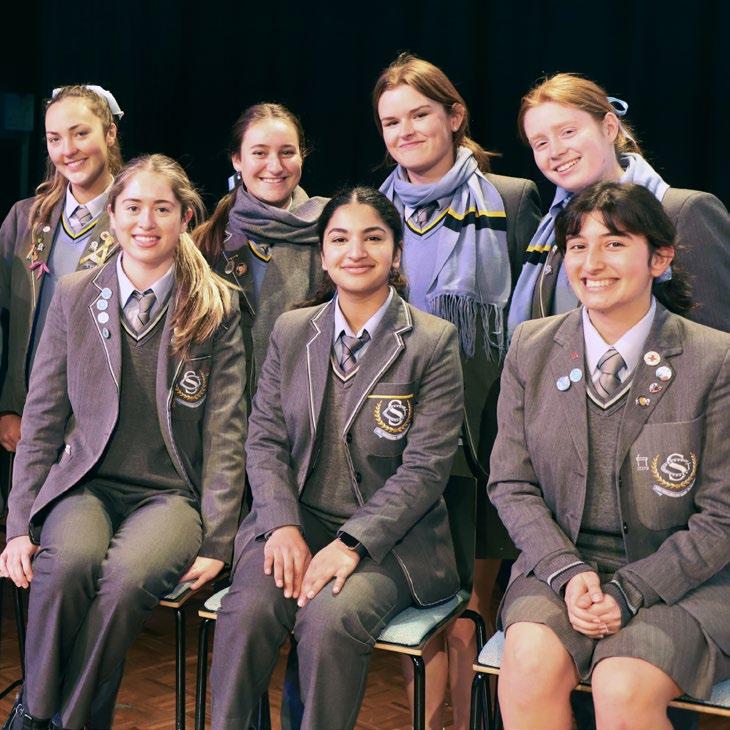
During the past few weeks, the theme of ‘strong women’ has been referred to in a variety of formats, in Assembly, during conversations with others and in the media.
Last week, our six elected Student Executive members for 2023 delivered their leadership speeches regarding ‘A Signature Moment at St Catherine’s School’. This was then followed by a number of questions put to them by our current Student Executive.
One question asked of the six young women was ‘who they saw as a strong female leader in their eyes.’
Our six Year 11 students answered this question with the following responses:
• Julia Gillard
• Monique Ryan
• Ash Barty
• Lauren Jackson
• Their sister
• Their mother
It was a refreshing question, with a refreshingly Australian focus, as I feel too often, we look abroad for inspiration. We have so many strong women in Australia, those well-known such as State and Federal politicians and those ‘quiet achievers’ who inspire others in an understated way. It was wonderful to hear our 2023 student leaders provide such considered and diverse examples of strong women whom they look up to.
I am sure we all have female role models that we gain wisdom and strength from. I too am inspired by a number of female politicians, athletes, colleagues, my mother and indeed our St Catherine’s students themselves.
Despite the challenging times we are all facing, I am inspired by the young women of today who will leave their indelible marks on the lives of all they interact with. I am inspired, knowing we have students at St Catherine’s
who will go on to achieve remarkable feats for their family, friends, the wider community, and Australia at large.
For those who had the opportunity to listen to the six speeches from our 2023 Student Executive members, I am sure you will join me in recognising that these young women will not only lead our School well but will also continue to do so beyond the Heyington Gates.
‘Knowing that you’re worthy of chasing your goals and dreams, regardless of whether you achieve them.’
Australian Tennis champion, Ash Barty is an extraordinary athlete and inspirational woman. Ash has spoken several times about the impact her Mindset Coach, Ben Crowe has had on her playing career and sporting success. Crowe defines success as ‘knowing that you’re worthy of chasing your goals and dreams, regardless of whether you achieve them.’
Crowe arrived at this decision after recognising a pattern in athletes and business people he coached. Many were struggling under the pressure of external validation. He saw that people were distracted by the result more than the process. They were craving from others what they did not give themselves; unconditional love. “You still go after the things you love to do; they just don’t determine your self-worth.”
It is important to focus on what we can control. It is important to “accept the uncontrollables” and be the “best version of yourself.” This is wise guidance from Crowe that Ash Barty listened to. It is guidance that we should all take on board.
Our 2023 Student Executive has drawn inspiration from those whom they admire. I encourage them to continue to strive and stay true to themselves. They will lead our School in 2023 and ensure all within the St Catherine’s community also strive to be the best versions of themselves.
I encourage all our Year 11 girls, as they step into their leadership roles in 2023 to lead by example and create bold and original ideas. In the words of Dr. Seuss: “You’re off to great places! Today is your day! Your mountain is waiting, so get on your way!”
Name: Miss Kristy Forrest Title: Pedagogy Coach, English Teacher
Date: 26 August 2022
Strategic Intent: Exemplary Staff
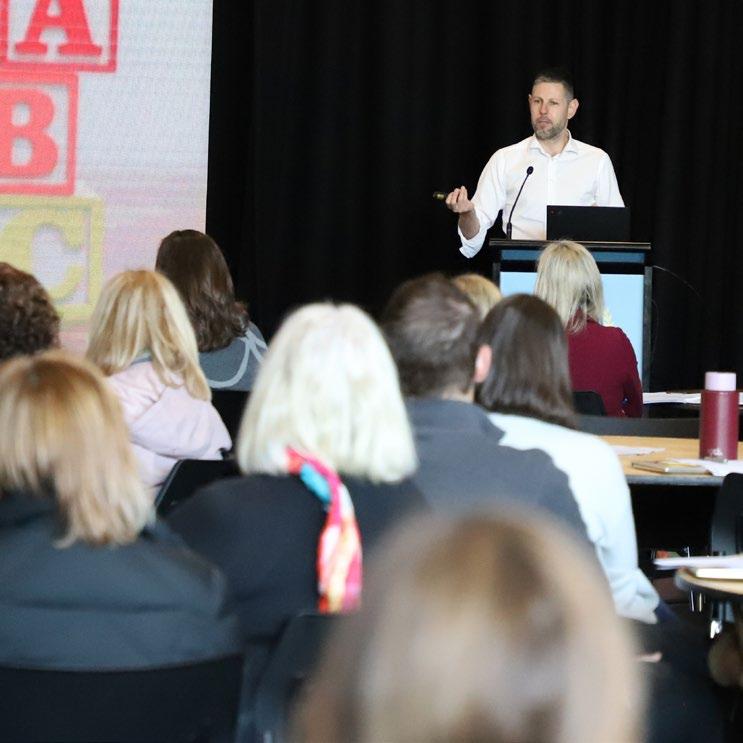
St Catherine’s School’s, Professional Learning Days provide ongoing opportunities for our whole-of-School staff to engage in collaboration and discussion whilst also learning from experts.
As a staff, we commenced Term 3 sharing inspiring practice presentations with each other. Our mid-term session, held on Monday of this week, offered us another opportunity to both reflect and plan for the next stage of the year.
This year, in line with our Towards 2025 Strategic Intent One: Academic Achievement, our theme for the day was ‘Cultivating the Thinking Classroom.’ This focus involved developing strategies which enable us as teachers to create the most optimal conditions for student thinking and learning competencies (such as metacognition and collaboration) to flourish.
Monday’s Professional Learning Day began with a Keynote Address delivered to all staff by Dr Tim O’Leary, an educator whose doctoral research was completed under the supervision of leading education expert, Professor John Hattie, and who now leads Educational Data Talks.
Tim’s theme focused on ‘Classroom Vibe,’ discussing the idea that cultivating a strong classroom culture (or ‘vibe’) is the key to impactful practice. Tim narrowed ‘vibe’ down to the key element of teacher clarity and credibility. He made fruitful links between his ideas and the work we have already undertaken as a whole staff within our new Teaching and Learning Framework.
The positive feedback to Tim’s address from all sectors of our School is testament to the
willingness of our staff to maintain a curious disposition and be reflective in their practice.
Following Tim’s Keynote, Dr Peter Ellerton delivered his Address and workshop on ‘The Importance of Teacher Intent in Questioning’ to our Senior School staff. This continued Peter’s three-year association with St Catherine’s as part of our partnership with the University of Queensland’s Critical Thinking Project.
Through differentiating question types based on teacher intent (rather than question structure, as is commonly the case) Dr Ellerton provided us with a powerful means of reflecting on our questioning strategies in both classroom discussion and in assessment. The primary goal of this practice is to create increased opportunities for cognitive rigour with our students.
The richness and ideas sparked by our two speakers were then taken into the afternoon collaborative sessions. Teachers worked in teams to plan their pedagogical approach and curriculum for upcoming units of work.
With significant changes to a number of VCE study designs, as well as a new Australian Curriculum, collaborative time such as this is integral. It ensures the relevancy and accuracy of our curriculum approaches and makes sure our students are participating in the necessary thinking activities that will result in academic success.
I look forward to sharing further successes as the year continues.
Name: Michelle Carroll Title: Principal Date: 9 September 2022 Strategic Intent: Student Wellbeing & Leadership
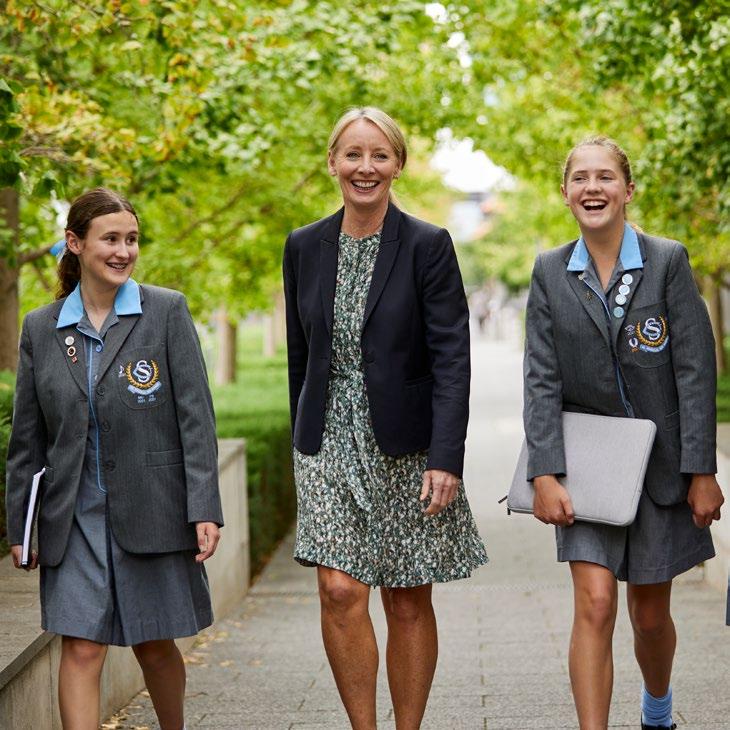
Author and journalist, Madonna King provides an insightful reflection into the complexity of educating and raising daughters in the post-COVID world in her podcast hosted by the Alliance of Girls’ Schools Australasia – recently, rebranded International Coalition of Girls’ Schools. Families may be familiar with the books Madonna King has released in recent years, Being 14, Ten-Ager and L-Plater.
Madonna King poses the question: Where do our girls sit in the post-COVID world?
From views on changing the culture of the Australian Parliament to outnumbering boys in university engineering courses, taking their place in political cabinets, and still being paid less, across the board, than men, King highlights a girl’s voice is indeed important, but is it loud enough and if girls themselves, think their voice is loud enough?
The normality of life came to a screeching halt for girls during 2020-2021. Calls to Kids Helpline over this period skyrocketed, with 70% of the calls coming from girls. The only recorded drop in terms of issues was in the category of ‘bullying.’
Following 3,000 interviews with students, teachers, parents and principals, Madonna King proposes five ‘ironies’ that teenage girls are currently experiencing, where they have been delivered enormous opportunity but perhaps not being able to make the most of them.
Irony One: Girls want ‘independence’ but find solace in a clearly defined and exclusive friendship group. That being, girls try to embrace their independence, yet land in a big ‘vat of group thinking,’ and whilst reorienting themselves away from their family during their teenage years, they want to look and think like everyone else.
King’s research highlights that girls strive too much for perfection, focusing on what they see as their own
imperfections. One example was found when interviewing 10-year-olds who want to change the things they cannot: the colour of their skin, curly verses straight hair or their height. The two most commonly mentioned words by 10-year-olds in King’s research were ‘fitting in.’ Girls want to look like the girl at the next desk with the same ponytail and the same height.
The question for parents and educators alike is how do we help girls stand confidently aside from the pack? Should we be celebrating their differences more to help them understand the individual journey? To illustrate this, King uses a swimming analogy:
At the age of seven or eight, girls are all on the same starting block and they are all going to finish that year at the end of the same pool. However, what they need to understand is how they get to the end of the pool is their decision – freestyle or backstroke, go like a ‘bat out of hell’ or dog paddle? Stop and chat with the girl in the next lane and swim together as a team? The one thing they cannot do is swim in the lane of the girl next to them. The biggest challenge facing girls, almost unanimously, was a lack of self-confidence. Why? King believes they are managing the expectations of parents and peers and most notably, navigating an online world where social media feeds are brimming with what they believe they are not.
Irony Two: Where girls can have 1,000 friends on social media and not a soul to talk.
Inspector John Rouse, Head of Taskforce Argos, responsible for the investigation of online child exploitation and abuse, suggests if you plan to have a pool party for your 14-year-old, and handed her the printed invitation, and then suggested she give it to her closest 1,000 friends, it simply will not happen. However, routinely girls in their mid-teens have 1,000 Instagram followers. If a teen has 650 friends on one social media app, and each of those friends has 500, that means conceivably 325,000 people can contact her!
King goes onto explain the existence of being ‘left on red’ – that being when a girl sends a text to a friend late at night, the sender sees the read receipt but does not receive a reply until morning. This delay in response might be because the recipient was half asleep or not allowed to answer or even a parent read the text; but she is deemed responsible for her friend being ‘left on red.’
The problem is not the phone, it is clearly how it is used or misused. What would our girls be doing between 7.00pm and 8.00pm tonight if they did not have their phone? The phone offers them the world, yet it steals so much from them. What would we all be doing if we were not on our phones?
Too often girls feel utterly alone. Irreconcilably smartphones have changed how friendship is navigated and the mass loss of socialisation skills, where so many young girls do not know how to be a friend. What are the tools and what is the language of friendship today? Girls can struggle with the crossover from being friendly, to actually being real friends. At 13, 14, 15 and 16 years of age, it is easier to send an emoji,
but much harder to navigate a bond and conversation that requires patience, forgiveness and understanding differences.
Girls need to learn how to not exclude others, and value forgiveness when one of their peers makes a mistake. We have all had arguments with friends, but the friendship survives because it is bigger than the argument. Girls need to understand boundaries better for what they will accept or what they will not accept in a friendship. They need to make that decision, away from their friends, in the cold light of day. Girls need to learn the language to communicate with their friends. They need to actually practise the phrases and learn to use them in those tricky moments.
In my conversation today with Junior School Psychologist, Dr Lena Wintermantel, we discussed the proactive wellbeing programs being conducted in Barbreck, starting with our Year 4 students. Learning the language of friendship, forgiveness, turn-taking and navigating conflict are all skills 10-year-olds are capable of understanding and learning, and can build upon in later years.
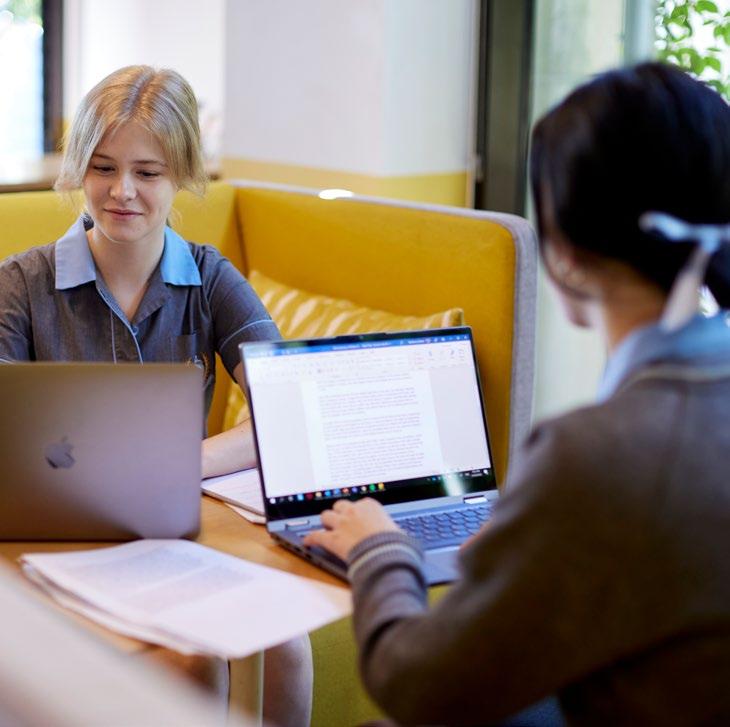
Name: Mrs Ceri Lloyd Title: Director of Teaching and Learning
Date: 9 September 2022 Strategic Intent: Academic Achievement
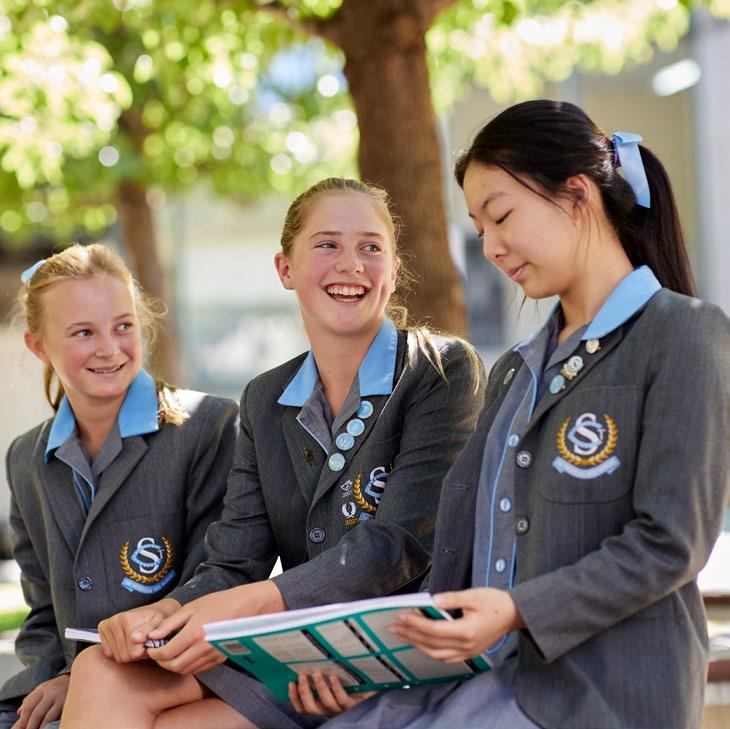
Novelist Mary Shelley (1818), wrote, “Beware for I am fearless, and therefore powerful.” Shelley was a British novelist who authored the classic novel Frankenstein when she was only 18 years old.
In her novel, she alludes to the idea that women are always in victimised positions in society. A plight she knew well living in the patriarchal world of the 1800s, but she refused to let her world define her. She rebelled against conventions, followed her heart, and supported herself financially by writing. Shelley refused to be restricted by her world and found her fearless and bold voice through her writing, more remarkable due to her youthful age.
These dispositions have not changed from the 1800s to today. We all need to find our fearless and bold voices. This is what we strive for as educators at St Catherine’s.
There has been much to celebrate at St Catherine’s in so many pursuits; our academic achievements, our co-curricular success across our many sports, the Arts through the Gala Concert, our international rowing success, debating and so many others.
As I contemplate our School’s many successes, I am often asked what is it about St Catherine’s?
This question is challenging to answer because so many factors come into play. It really does “take a village to raise a child,” but more specifically, it takes a community to raise a young woman, and not just any community, a St Catherine’s community.
Our partnerships with students, teachers and parents create the achievements that we see in so many of our girls’ endeavours. At St Catherine’s we dream big. Our small size does nothing to detract from our successes. As one of Shakespeare’s characters spoke, “Though she be but little she is fierce.” In fact, we all know “small” is an intrinsic factor in our achievements. We know every student in our care.
Furthermore, our academic care model develops this idea through our essential character dispositions that young women need for the 21st century world they will pathway into post school.
What I keep coming back to are our traits of fearless and bold. This is our ‘X Factor,’ the St Catherine’s superpower that our teachers capture, harness, and build in every lesson, every day. Our culture within and outside our classrooms promotes student thinking and allows them to develop these key traits.
At St Catherine’s we have spent much time reviewing our programs and developing the 2022 Teaching and Learning Framework aligned to our model of Academic Care. The research clearly shows that persistence and intellectual curiosity are determinants of academic success as well as the direct relationship between students’ wellbeing and skills. (OECD, 2021).
Student wellness is central to this model and just like our intertwined blue ribbon that binds all members of our community, student wellness is intertwined into every innovation and program. From our Critical Conversations Year 9 Humanities program, mathematical problem solving, science connections with Universities, artists-inresidence, English guest speakers and novelists, the list is endless. Every teacher works to develop their thinking classroom and these character dispositions in students.
It would be remiss of me not to state that being fearless does not mean one is without fears and emotions. Fear is a powerful emotion but if we use it to our advantage, it will drive us forward, allowing us to step into those challenges along the way.
Women who are fearless will use their voice, show integrity, believe in themselves, face their fears, encourage other women, and go beyond their comfort zones. Being bold and fearless are intrinsically linked, acting with perseverance,
strength, and grit, but not acting alone. Our achievements are built around teamwork, working together as one. Bronte Cullen, Year 12 student and rower, summed it up after our First Eight Rowing Crew won the prestigious Henley Royal Regatta in the UK, and became world champions, “We have the most amazing group of girls and just act as one.”
One, but always together as a team. Being the best, being number one means acting as a team. Those at the front and the many that stand next to them, supporting and working together. Our community stands together to create our successes. It is important to note that achievements can be big or small, such as having a difficult conversation, being honest with a friend or speaking with a teacher about work. All of these allow for a bold mindset, stepping into a conversation, bringing our voice to the table, and facing a fear.
When students leave St Catherine’s, I want them all to know that the Heyington Gates will forever be open, and the blue ribbon will always connect them to a community of bold blue.
I take the opportunity to wish the Year 12 students all the very best as they embark on their final assessments and move into trial examinations.
I thank our School community for assisting in raising our bold and fearless young women. All of them on their own unique journey, but forever connected to this small, fearless, and empowering school!
References:
OECD (2021), Beyond Academic Learning: First Results from the Survey of Social and Emotional Skills, OECD Publishing, Paris https://doi.org/10.1787/92a11084-en
OECD (2021), Social and Emotional Skills Well-being, connectedness and success. https://www.oecd.org/education/school/UPDATED%20 Social%20and%20Emotional%20Skills%20-%20Well-being,%20 connectedness%20and%20success.pdf%20(website).pdf
Shakespeare, W. (1605), A Midsummer Night’s Dream Shelley, M. (1818). Frankenstein
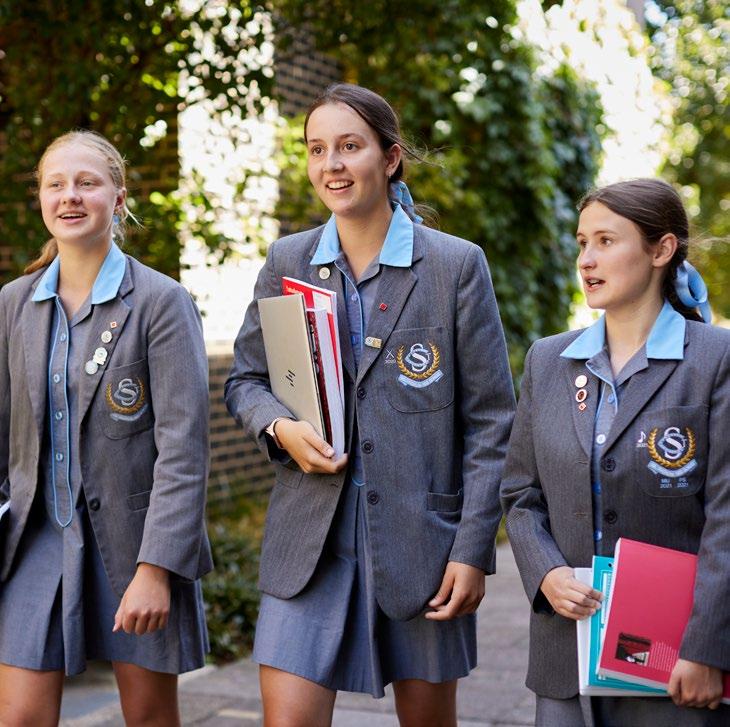
Name: Mrs Sue Collister Title: Head of Boarding Services
Date: 9 September 2022 Strategic Intent: Student Wellbeing & Leadership
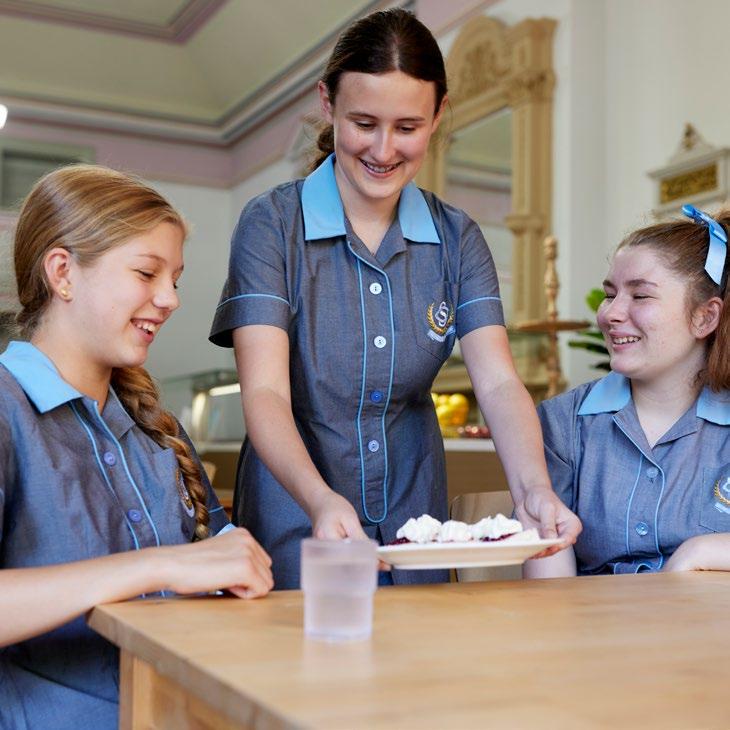
Leadership in a residential community can take many different forms.
In the past year, our boarders have been led by two supportive and empathetic leaders, Boarding Captains Annabelle Green, and Jasmine Glass.
Elected at the end of Term 3, 2021 when we were emerging from many months of lockdown, Annabelle and Jasmine’s goal was to create an inclusive and welcoming Boarding House environment for all our returning and new boarders.
Throughout their captaincies they have created many wonderful opportunities to make our boarding girls feel at home. This commenced with our annual Christmas Party at the end of last year, where they had everyone up dancing and feeling part of the Illawarra Family.
Early in Term 1, the Captains organised activities as part of our annual Closed Weekend, which created a special time for everyone to join as a new boarding community and have a role to play. Other activities throughout 2022 have included:
• Reconciliation Week yarning circle
• Boarders’ socials
• Op Shop Charity Fashion Show
• Birthday celebrations
• Easter egg hunt
• Dragon Boat Festival afternoon (organised and supported by the local Chinese mothers)
• Make your own cupcakes/pavlova afternoon teas
• Winter Night Market at Queen Victoria Market
Thanks to the generosity of our Boarding families and St Catherine’s Parents’ and Friends’ Association, the Boarding House is now equipped with a new table tennis table. It has been a wonderful addition to Illawarra for the girls, with more boarders sharing time together before and after dinner. To quote one Year 12 boarder, “it is my favourite thing at Illawarra.”
Last week the boarders voted for their 2023 Boarding Co-Captains. We congratulate Charlotte Rowe and Phoebe Russell on their election. The new leaders already have a number of ideas for activities during Term 4, 2022.
This year our boarders have also all had the opportunity to contribute their voice during our food focus groups. Through their ideas we have been able to introduce many changes.
Belonging is so important in a boarding community. Within Illawarra there are daily examples of older boarders supporting younger boarders. Friendships across Year levels are common and from comments from past boarders these friendships last well after departing Illawarra. Recently a number of past boarders have returned to Illawarra to visit and reconnect with an important part of their life. It was wonderful to hear them speak of our Boarding House as a place where they belonged and felt supported. To our wonderful Year 12 boarders, many of whom have been with us for a number of years, we say thank you for your leadership and support. We also wish you the best for your final exams and for your future endeavours.
Name: Ms Karen McArdle Title: Head of Junior School
Date: 7 October 2022 Strategic Intent: Co-Curricular Opportunities

Our girls love our Beyond Boundaries camps and the many activities on offer within them. The camps provide our girls opportunities to explore new ways of thinking, learning about different things, challenging themselves physically, emotionally, and socially and having loads of fun! For many, their memories from the Beyond Boundaries camps will last a lifetime.
Our Beyond Boundaries Program builds through the years, offering age-appropriate activities for the Year levels attending. A wonderful element of our Program is the cross-Year level interactions the girls gain, with the Program often having two Year levels attending together.
This week, our Years 5&6 girls are on camp together at Camp Jungai at Rubicon, about two hours from Melbourne. Next week, will see our Years 3&4 girls attend Camp Gundiwindi at Silvan. Our Year 1 girls will be staying late at School next Friday, with our Year 2 girls staying overnight in our Music Room.
While engaging in activities different to those offered at School, girls often see different qualities and interests shown by other girls, which often leads to girls developing a wider circle of friends with different shared interests. Our aim is for girls to have a wide circle of friends across a range of interests and activities.
The Program also encourages the girls to take greater responsibility for themselves, and their belongings, as well as developing their abilities in being conscientious and understanding of others. Sharing a cabin at camp is a perfect example. When in a cabin, girls learn to work as a team to keep the cabin tidy. They learn they need to be independent and are responsible for keeping their things neatly packed
at all times and not spread all over the cabin. There are no parents there to tidy up after them, they must do it themselves!
The girls learn to compromise, collaborate, and negotiate – skills that will stand them in good stead well into the future. They must change their thinking from ‘me’ to ‘team.’ For some, this might be a steep learning curve, but also a signal that these skills need to be developed.
The girls also learn to be organised. This means waking in time to get ready for breakfast and the day, bringing a hat, water bottle, sunscreen etc. To do this, they need to know and prepare for the day’s schedule and think and plan ahead of time.
Girls on camp quickly learn that they need to employ good social skills and understand the social settings of communal living. This is quite different from School where girls go home at the end of each day, breaking the social engagement. On camp, these skills are used from when they wake, until they go to sleep.
For our younger girls they learn from the older girls how to do things. They see how they lead and be role models. The older girls learn to lead and set standards, knowing the younger girls are watching. They develop patience and see their impact on those younger than them.
Our wonderful staff give their time to take the girls on these camps, often leaving their own families to do so. They demonstrate extraordinary care of our girls and are there to help them learn and develop the skills they need.
Camps are wonderful experiences.
Name: Miss Kristy Forrest Title: Pedagogy Coach, English Teacher
Date: 7 October 2022
Strategic Intent: Exemplary Staff
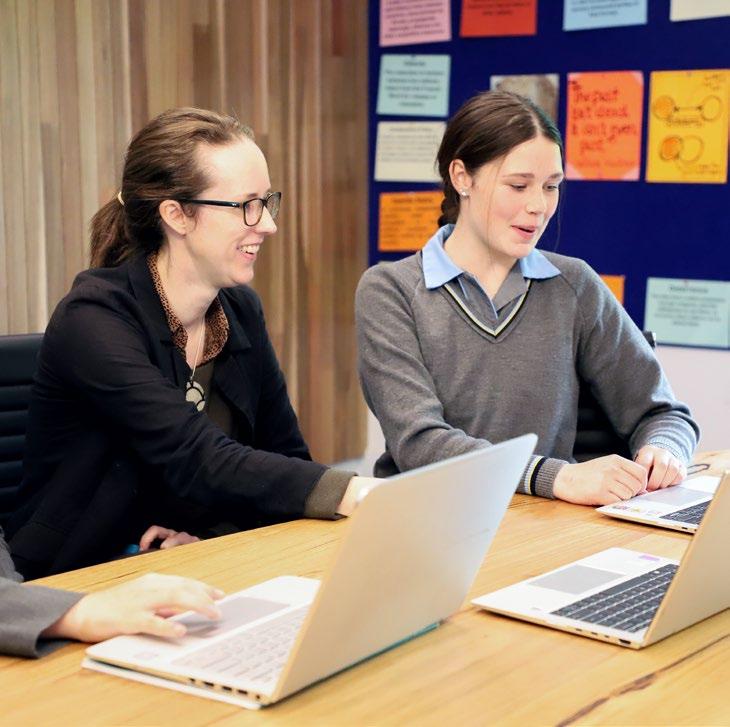
As part of St Catherine’s School’s Thinking Agenda and focus on academic care, we have recently run several sessions for our senior students on how to prepare for the upcoming examination period in an effective manner.
The sessions, undertaken during the students’ Academic Advisory Sessions, emphasise the holistic nature of academic care and draw from the work of Cal Newport and the Science of Learning, regarding how students can perform at their best.
During the sessions, the girls also respond directly to the advice provided across VCE Examiner Reports in all subjects regarding common student errors in thinking. Below is a synthesised summary of the guidance provided to students, which parents are encouraged to discuss with their daughters.
First, students were encouraged to make the organisation of notes and materials their first task, to be completed within one week, to enable them to study more effectively with the physical materials at hand. Second, to enable optimum cognitive performance and focus, students need to care for their body, brain and mind through prioritising nutrition, sleep, and movement throughout the exam period.
The girls were also encouraged to work pen-to-paper, as too much screen reading requires a style of reading not required for examinations.
They should also seek out a quiet place in which they can study and focus. Perhaps considering taking advantage of St Catherine’s Nicholas Library and the many university libraries open on weekends.
When revising, students need to concentrate on three broad areas for each discipline:
1. Knowledge, facts, and concepts (information recall)
2. Application and problem-solving (applied thinking)
3. Examination performance (timing and emotional regulation)
After an initial reflection stage, where the girls identify areas for improvement in each of the categories, they can then begin their study in a focused, targeted manner.
Core elements of successful, strategic learners include retrieval practice, chunking, deliberate practice, and metacognitive self-talk under timed conditions, which are all elements of our Teaching for Thinking approach.
For example, a highly strategic student would begin their examination period learning key information and building vocabulary using retrieval practice, before switching to spaced practice in the latter weeks. Meanwhile, they would be completing multiple applied questions (in practice exams) using thinking routines to familiarise themselves with unseen material and learn to manage any potential anxiety that may arise. Upon receiving feedback from their teacher, they should immediately seek to address this feedback as part of deliberate practice, so they can improve over the examination period.
Effective study is connected with good thinking and selfregulation. Therefore, there are common traps students must avoid. For example, students should be wary of ‘pseudo-study,’ whereby they devote hours of study time to easy, low-impact tasks (such as rewriting notes) rather than attacking applied questions (which is more challenging).
Students should also put in place a ‘distraction stopper’ action-plan to avoid having their concentration fragmented by electronic devices, procrastination, or socialising. Finally, they should practise ‘self-coaching’ through examinations, so they can prepare for the inevitable ‘curly’ exam questions.
From our collective experience from the previous two years of running this program, we know students who applied the advice during SWOT VAC found they were able to approach examinations with a sense of confidence, competency, and control.
We wish all our senior students the very best for their examinations and congratulate them on their remarkable persistence through the last three challenging years.
References:
Newport, Cal. Study Hacks Blog https://www.calnewport.com/blog/ McConville, A., Oakley, Bl, and Seinowski, T. (2018). Learning How to Learn.
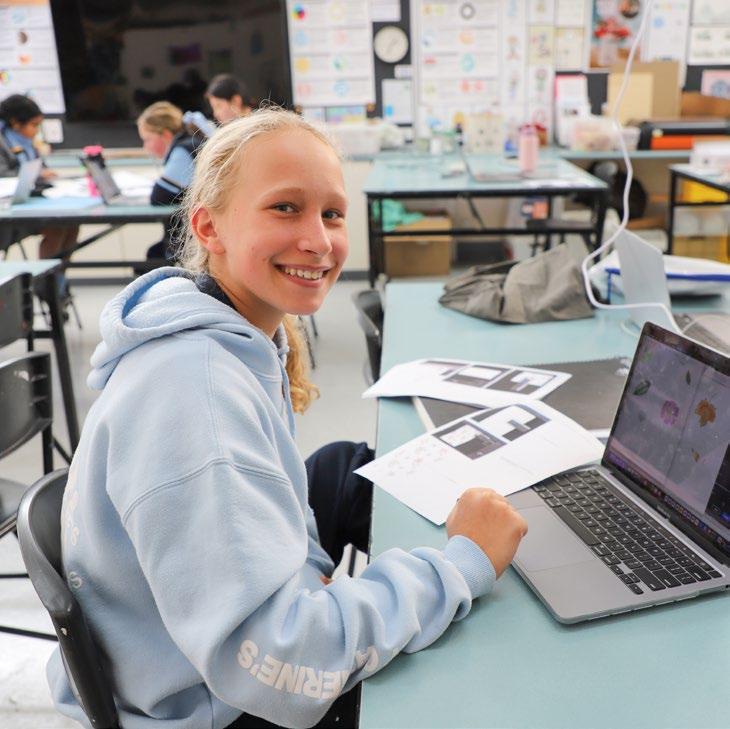
Name: Michelle Carroll Title: Principal
Date: 14 October 2022 Strategic Intent: Student Wellbeing & Leadership
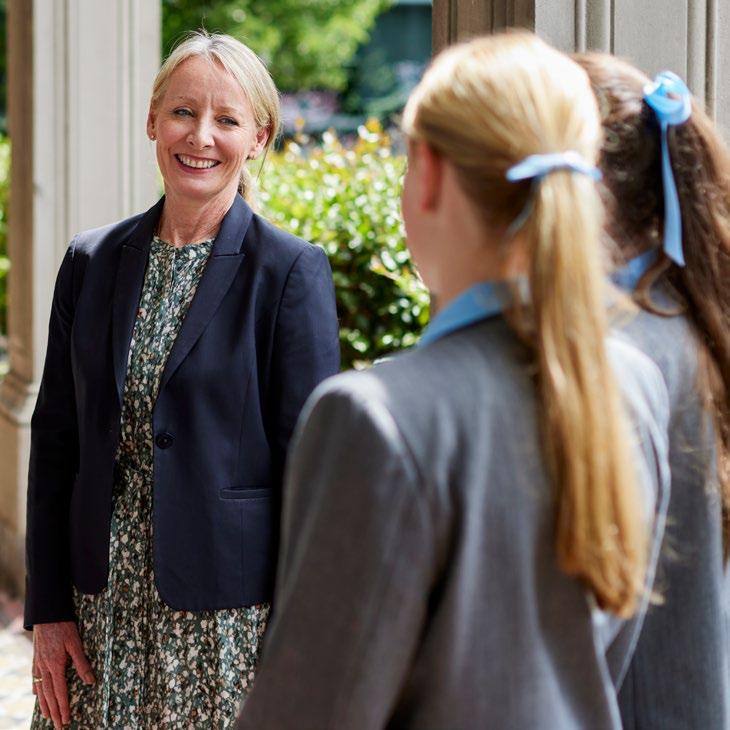
“Now more than ever, we must renew our commitment to work together so that girls enjoy and exercise their rights and can play a full and equal part in their communities and societies. Investing in girls is investing in our common future.”
UN Secretary-General António GuterresThis week marks the 10th anniversary of the United Nations International Day of the Girl. It is an opportunity to celebrate girls by hearing their voices, responding to their needs, and welcoming them in decision-making spaces as a way of investing in a future that believes in girls’ agency.
On December 19, 2011, the United Nations General Assembly adopted Resolution 66/170 to declare October 11 as the International Day of the Girl, to recognise girls’ rights and the unique challenges girls face around the world. The International Day of the Girl focuses attention on the need to address the challenges girls face and promote girls’ empowerment and the fulfilment of their human rights.
A global awareness of the plight of girls around the world is frequently embedded within our School programs at St Catherine’s, in addition to signposting the opportunities and appreciating the good fortune of living in Australia and attending a school such as St Catherine’s.
By way of comparison, almost one in four girls aged 15 to 19 globally are not in education, employment, or training, compared to one in 10 boys. Up to 10 million girls will be at risk of child marriage. In addition to the above alarming statistics, the number of female graduates in Science, Technology, Engineering and Mathematics (STEM) related fields is below 15% in over two-thirds of countries.
The best advocates for girls are girls. At St Catherine’s we aim to empower and nurture all our girls to be globally responsive young women, whose voices and actions will generate positive change for girls and women around the world.
Over the coming week we will commence the celebrations and farewells for our newest Old Girls, our Class of 2022. I have every confidence this Cohort will march forward into
the next phase of their lives with the confidence, integrity, and wisdom to make their mark on the world around them.
As is the tradition for our leavers, the girls will attend their Final Assembly on Monday, followed by their colourful exit through the Heyington Gates amidst a guard of honour created by their fellow students and teachers. Their Valedictory Dinner on Tuesday evening also provides an opportunity to acknowledge the importance of our school/ family partnership that has supported the girls, not only this year but across their entire St Catherine’s journey.
At the heart of our St Catherine’s community is the commitment we all share to advancing girls. All our girls are encouraged to find their voice and lean into their capacities. They are encouraged to be bold and take positive risks in their learning and co-curricular efforts. They are celebrated for their individual achievements and collaborative efforts. At St Catherine’s all girls are valued.
This week we celebrated the amazing accomplishments of our athletes and musicians across the Senior School with our Sports and Music Celebration Breakfasts, hosted by the Sports and Creative Arts Auxiliaries. Both events provided a wonderful opportunity to congratulate all our students who have actively participated in St Catherine’s Sport and Music Programs this year. The Celebration Breakfasts acknowledge the most talented of our athletes and musicians, but also those who have earnestly been involved every week, lifting their performances through determination, effort and fully embracing their pursuits through their spirit of participation.
Last night I was also able to enjoy the full-dress rehearsal of the Years 7&8 Production Curious Comedies. The show consists of four One Act Comedies, all of which have either curious storylines or characters. Many are set in Britain, with detectives such as Sherlock Holmes trying to crack the case. It is indeed a laugh-a-minute. I was particularly impressed with the emerging talents of our younger girls in the Senior School and the support our older students provided in their roles as Stage, Lighting, Makeup and Back
Stage crews. Needless to say, the Dress Rehearsal was seamless and audience members this weekend can look forward to a fabulous evening showcasing the talents of 35 of our girls, who love performing in our new performing arts space, The Jamie and Rebecca Gray Theatre.
Term 4 provides so many opportunities to acknowledge the many and varied achievements of our girls. On Thursday 24 November we will join together as a Senior School to celebrate the academic, leadership, service, and co-curricular endeavours of our students from Years 7 to 12 at our 2022 Speech Night. Held at the Melbourne
Convention and Exhibition Centre from 6.30pm, the evening provides a wonderful example of not only the capacities of our girls but also the importance of education in providing opportunities for girls to learn, lead, play, perform, debate, compete, achieve, and grow.
As we celebrate the agency, leadership, and potential of our girls throughout this term, we must remain committed to advocating for all girls around the world, to ensure they are valued, endorsed, and celebrated as full and equal participants in their communities and societies, as they are within St Catherine’s.

Name: Ms Sarah Bethune Title: Head of Early Learning
Date: 14 October 2022 Strategic Intent: Co-Curricular Opportunities
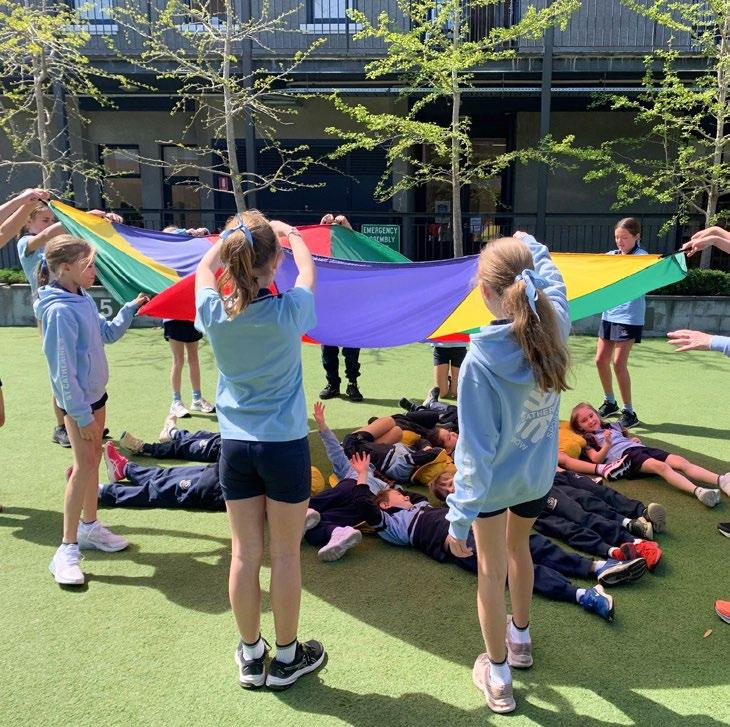
Our Early Learning Program supports children’s physical learning and development through a range of play and learning opportunities.
As outlined in our curriculum framework, the Early Years Learning Framework for Australia (EYLF), educators support children’s learning so that over time they work towards Learning Outcome 3.2 “Children take increasing responsibility for their own health and physical wellbeing.”
With the Spring weather upon us, this is the ideal time of year for our children to be spending increased time in the outdoor program. Our ELC playground provides children with a physical challenge every time they encounter this space, including:
• Developing the skills to traverse rocks and a range of surfaces
• Moving in different directions and stepping up and down as they navigate the pathways
• Exercising a range of physical skills when climbing, digging, swinging, riding, engaging in ball games, building with blocks and other materials.
Through regular experience in this naturally challenging learning space, the children are constantly developing and refining their physical skills.
Our children in the Early Learning Centre have recently commenced the Outdoor Physical Education Program after previously completing two terms of the indoor Perceptual Motor Program. This Program provides the children opportunities to use sporting equipment and explore the space on the sports field. The children engage in a range of whole group and team games led by our Physical Education Teacher, Mrs Jenny De Nardis. The Outdoor Physical Education Program is designed to develop the children’s coordination, balance, agility, spatial awareness, ball skills and teamwork. The children also gain skills in running, jumping, skipping, and hopping. In addition, the children are required to listen to instructions and follow rules and directions while participating in these group sessions.
The importance of physical activity extends beyond the obvious benefits to a child’s physical development. Studies have found favourable associations between the time children spend in active play and their management of their own behaviours and how well they get along with others. There are also correlations between physical activity and a child’s ability to concentrate and focus in the classroom. The relaxation and wellbeing benefits are significant. For these reasons, we must make physical play and activity a priority in both the school and home settings.
Name: Miss Mackenzie Leyden (’17) Title: 2017 School Co-Captain
Date: 21 October 2022 Strategic Intent: Embrace Community
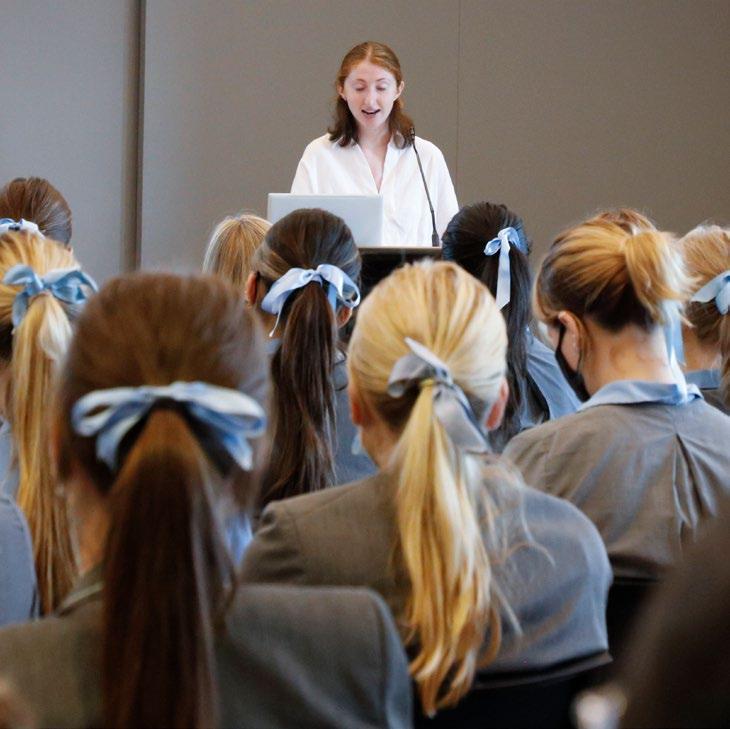
Extract of 2022 Year 12 Leadership Conference Address: Miss Mackenzie Leyden (’17), 2017 School Co-Captain
“…The second part of [my] Address is a bit more personal, but I thought that I would have really benefited from hearing some of what I’ll be sharing with you when I was in Year 12.
So, I want to take you on a bit of a trip down memory lane by sharing the quote on quote ‘failures’ I’ve had since finishing high school, how these have shaped me, and how I have been able to bounce back from them.
When I was in Year 10, I had my heart set on moving to Canberra after school to study at the Australian National University. I wanted to do a Bachelor of Politics, Philosophy and Economics and honestly hadn’t really considered courses elsewhere.
Everything was going to plan – I applied for bonus points through the University and then received an early conditional offer. I should acknowledge that I was very fortunate in that I wasn’t too stressed about getting the ATAR needed for this course as I also had the assistance of bonus points. I know that this was a privilege in and of itself, to have some of that pressure alleviated from final exams.
So, I was all set to move to Canberra but was just waiting to hear back about my accommodation arrangements. I had applied to one of the residential colleges, which I had toured on the Open Day and subsequently fell in love with. This was all part of my idealised post-school life; living on campus, meeting new people, studying politics in the nation’s capital. But it turns out that I didn’t receive an offer for the residential college I applied to and my whole plan was thrown out of whack. Of course, I took this rejection to heart. I ended up deciding to stay in Melbourne and go to uni here instead. So, I enrolled in a Bachelor of Commerce at The University of Melbourne, which is where we come to my second ‘failure.’
My intention when I started university was to study Commerce and then go on to undertake a Master of Journalism. I thought this plan was foolproof – I’d be super employable with a
Commerce Degree under my belt and then I’d go on to pursue an area that I was genuinely interested in, that is, journalism. I would finish my degree in the allotted three years, then maybe get some work experience before doing a Masters.
My first semester of university was challenging. I know I am not alone in that experience. I knew deep down that I wasn’t enjoying what I was studying, and this was reflected in my results. After not meeting hurdle requirements for some subjects, I actually ended up failing some of them in that first semester. This was a huge shock for me as I was always naturally academic at school and I thrived in this sort of environment. I had taken one elective subject in that first semester which was Introduction to Media Theory. I loved it and did well in it, and that’s when I knew I needed to change my path.
So, at the end of my first year of university I transferred degrees into Arts. I knew this would add extra time onto my degree, meaning I would no longer graduate after three years as I’d initially hoped. It was when I completed that Degree in the middle of last year that I, yet again, faced another ‘failure.’
When I graduated from my Arts Degree, I started working full time. I was two months into the job when I knew for sure it wasn’t for me. In true quarter-life-crisis style, I panicked, not knowing what step to take next, or even what I could see myself doing long term. I genuinely felt like a failure.
Luckily, another opportunity arose, for a role that I had applied for eight months earlier but didn’t get at the time. They had an opening and wanted to know if I was still interested. I changed jobs and decided that I wanted to go back to university to complete my Honours year so that I could apply to study a post graduate degree overseas.
Sometimes I feel quite shameful that I still don’t know what I want to do when I grow up. It can feel like my friends around me are establishing their careers, meeting their goals, and working towards that dream job. I have friends who are studying to be doctors and teachers and lawyers,
and ones who are already working as accountants and consultants. Truthfully, I still don’t really know what I’m doing.
When I was at School, I had no idea that my current job even existed. Having not studied a vocational degree at university, finding a career path was daunting. The world is changing rapidly and there actually is no perfect path to success post-school.
As I speak to those friends of mine who are seemingly on track to kick all their goals, I realise that some of them are questioning whether they do really want to be a doctor three years into their Medicine Degree, and some don’t love being an accountant even though they work at large, well-known firms. Sure, on paper they’re successful, but there is so much more to it than that.
Of course, everyone’s path will be different. I think my initial mindset of a very linear tertiary education and career progression inhibited me in a way. I wish
I had been more open-minded, less stressed about finishing my degree in three years and changing jobs and not knowing what I was doing.
So, as you go into this year as leaders for the rest of School, whether that’s as a rower, or a violinist, a House Captain, or a debater, remember that you don’t need to have everything figured out. Many leaders who have come before you aren’t perfect and many who will come after you won’t be either. Those rose-tinted glasses that we look up to leaders who come before us through can be deceptive.
Be kind to yourself, and to each other. Whether it’s during the course of this year, or in the years to come, there will be times when you feel like you’re failing. You’re not. One day you’ll be able to look back at those instances as mere detours, leading you to where you are now.
Good luck for this year, I will be eagerly rooting for you all from the sidelines.”
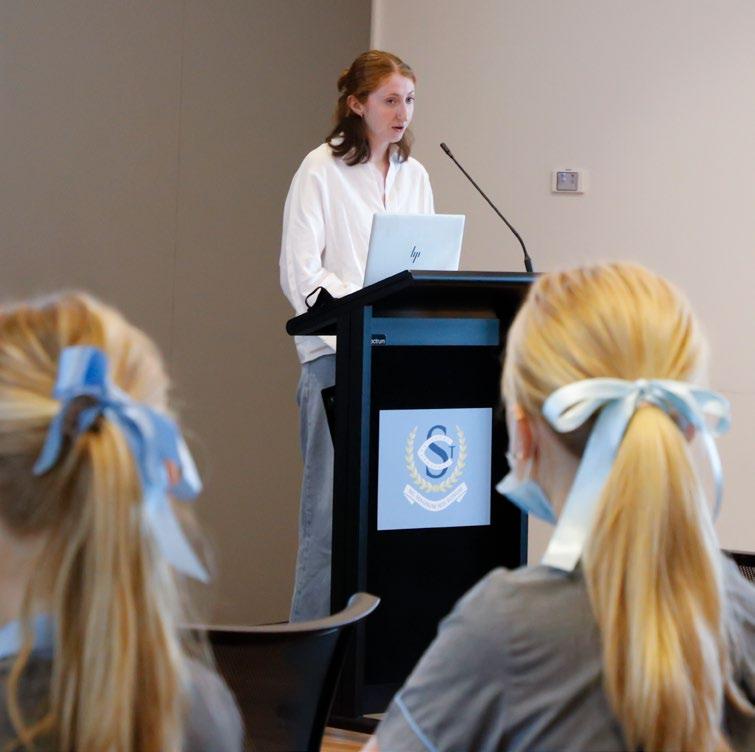
Name: Monsiour Andrew Gold Title: Barbreck French Teacher
Date: 28 October 2022 Strategic Intent: Exemplary Staff
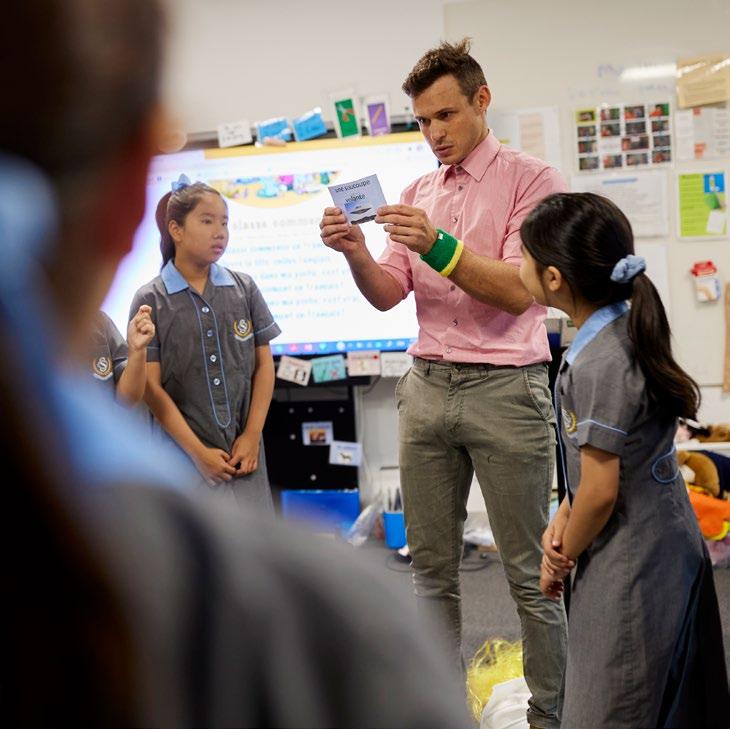
I joined the St Catherine’s teaching team in 2010, as a newly graduated teacher, receiving my B.Ed (Primary Years) from UniSA in Adelaide in 2005 and spending the next four years living in Francophone areas, namely Montréal in Québec and Paris.
My employment at St Catherine’s School was both my first permanent teaching role and my first experience as a French teacher. I spent the first seven years teaching a traditional French Program, using a textbook for the upper primary students, and basing many of my activities on ‘lists’ of vocabulary, with lots of English instruction surrounding a small amount of French.
In 2017 I began researching other methods of teaching language to develop a classroom where the main functional language being spoken was French. The Accelerative Integrated Method, or AIM, provided a blueprint and framework to start shaping my language class into a place where French became the dominant, functional language.
AIM is centred around pillars such as using actions (i.e.. unique actions for each word and grammar concept), pared-down language focusing on high-frequency words and patterns rather than ‘vocab lists. Through deliberate, deep-learning of a text via a studied class play, AIM asks the educator to guide their students towards critical fluency, using a smaller group of words (around 500-700) functionally, rather than teaching 1000’s of less-relevant words which the students will not retain or use.
Following the introduction of AIM into our Barbreck French Program there was an immediate increase in interest from the students. My students adapted from passive language learners to active French conversationalists, regardless of their level of ability in French. All the students benefited from hearing everyone around them speaking French at the same time, it removed the nervousness or hesitancy students can have around making errors when learning a new language.
Since this time, the AIM Program has provided ongoing benefits to students. Then, in 2020 I had the opportunity to delve into adult learning when St Catherine’s hosted the AIM Beginners French/ Chinese Workshop. Teachers visiting from all over Victoria loved the new facilities and bright, engaging classrooms of Barbeck
and, as the host educator, I was able to present an ‘open class’ to the participants and answer questions about theory and practice of AIM. It was an exciting day and it was a great feeling to engage an adult crowd about a subject I was passionate about.
In 2022, St Catherine’s School once again hosted the AIM Australia/New Zealand Workshop for AIM Beginners across two days in August. I was very flattered and motivated to lead this Workshop, but also quite nervous at the thought of teaching adults. My co-presenter and Head of AIM Australia provided great advice saying, “Take it really slow. Remember, you know a lot about what you are presenting, and they know nothing. Focus on the actions, they need to learn those first.” This advice helped to settle my nerves and guide my preparations.
As the first day of the AIM Workshop arrived and I began discussing the core principles of the program, I realised that my colleague’s advice certainly rang true – the pace of learning needed to be slow to allow for deep acquisition of ideas. What I was not prepared for was the relentless and poignant questioning of the participants! They wanted to know everything about everything; a very different experience to Junior School teaching, where students tend to absorb content without asking questions about the process or authenticity of what they are learning. However, I found this questioning helpful to my own teaching practice, encouraging me to reflect on my own actions in the classroom on a granular level.
My most exciting discovery from the AIM Workshop was that, at this point in my teaching career, I have something to give back to the community. I have techniques and ideas which I can share, I can assist language teachers with identifying problems in their pedagogy and based upon participant feedback, I can transmit ideas about methodology which resonate with adult learners.
Since first discovering AIM in 2017, it has provided learning benefits to our Barbreck students and my own personal learning journey. I certainly plan to continue my journey in the adult learning space, should the opportunity arise in the future. Whilst tiring and challenging, it serves as a great conduit to personal reflection and development.
Name: Ms Vanessa Jackson-McRae Title: Head of Science
Date: 28 October 2022 Strategic Intent: Academic Achievement

2022 marks the 15th Anniversary of the CSIRO STEM Professionals in Schools Program. It is Australia’s largest national skilled volunteering program creating ongoing and flexible partnerships between teachers and STEM professionals to enhance STEM education and engage students in real-world STEM.
St Catherine’s School was one of the founding schools involved in this program when it commenced in 2007. Throughout our involvement we have collaborated with Dr Stephen Hawkins from Monash University investigating Nanotechnology, Dr Loren Burns from Melbourne University, who educated students in Astronomy and this year, Professor Paul Wood AO presented to our students.
Professor Wood has been a full-time research scientist throughout his career, from Melbourne University to CSIRO, CSL and Pfizer. He has received numerous awards including the CSIRO Medal and Clunies Ross Award. He now helps academic groups work with industry. This work was recognised with the prestigious UTS Eureka Prize for Outstanding Mentor of Young Researchers 2022. Professor Wood was nominated for his vision and leadership in establishing the Industry Mentoring Network in STEM (IMNIS) Program.
As part of the STEM Professionals Program, Professor Wood and I devised a program entitled ‘Assessing the Credibility of Scientific Evidence.’ Students were given a short synopsis of a scientific issue with a question. Their task was to decide if the information was correct and then answer the question.
In the process of investigating correct scientific information, the students were required to evaluate the sources utilised to substantiate their claims. Students presented their findings in a group where each student presented one PowerPoint slide and spoke for one minute. Professor Wood informed the students that if a PhD student can present six years of research in six minutes, then they could do it too. Students accepted the challenge and impressed Professor Wood with their presentations and analysis.
The Presentation Day of the Program commenced with Professor Wood sharing his awards with the students and outlining the research associated with each award. This was followed by student questions and discussion. Students then presented their projects and Professor Wood provided feedback on their presentations and findings.
Being a Founder of the Program, I was invited to present it to a workshop of teachers. The response was extremely positive with several schools taking on the Program.
Name: Angela Yu and Maddie Powell Title: School Co-Captains
Date: 9 December 2022 Strategic Intent: Student Wellbeing & Leadership
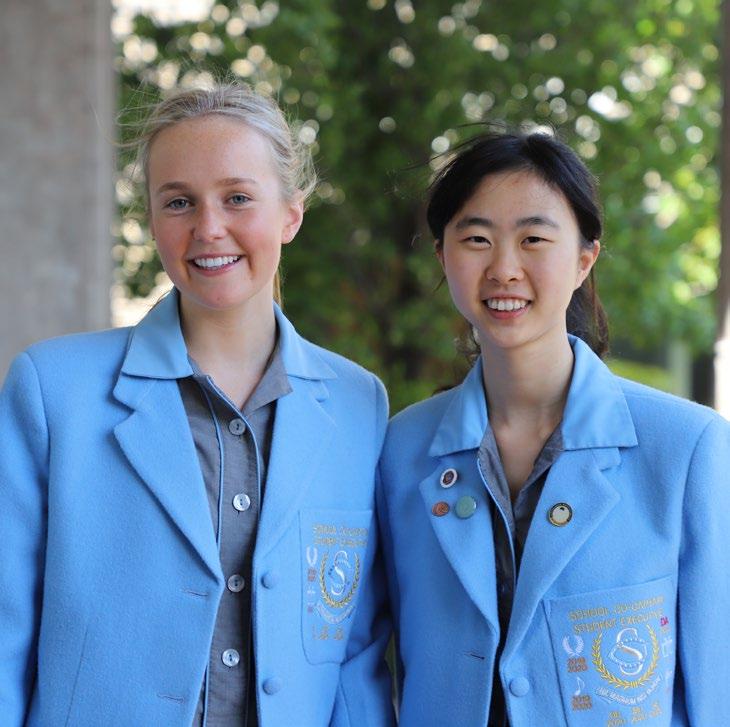
What was the year 2022? A set interval of time between two arbitrarily assigned days, a stream of smiles and tears that blur within each other as time passes… but from within this concoction, we have ‘plucked the day,’ taken the risk, and harvested some truly inspiring lessons and achievements.
This year, we climbed onto the stage, knees a bit shaky, and we said, ‘Emerge.’ We wanted to focus on the process of things. In our minds, we had bears coming out of hibernation, turtles emerging from their shells, and phoenixes rising from the ashes.
Just like the word, it’s hard to grasp. It’s ephemeral. Yet, it’s our determination to emerge that manifests hope. It draws out hope from the darkest corners. From the disorienting abyss of the past few years, we had to crawl out on hands and knees if we had to. But we didn’t. We flew.
The co-curriculars this year, in all areas, have unfolded themselves in even more extensive and collaborative ways, being able to continue completely uninterrupted. The awards glitter in our collective memory, puffing our chests with pride, but it is the girls who sign up for everything, try everything, who make these co-curriculars buzz with activity. We are also proud to confirm that we have taken student run assemblies to the next level. From our first dance performance with an awesome audience chorus to an inspiring line-up of guest speakers and enlightening quizzes, the Student Executive powerhouse has had a good run with Mr Brown’s vital support.
Intertwined with the days at School is our sharing of music, and we have taken it literally this year. Every Friday, we hope that you have sung or danced your way out of School with the
bell, because over our time here, music has connected so many of us. Whether it’s Mariah Carey’s All I Want for Christmas in Year 8 Music class, and periodically every December when we were rehearsing our Christmas classics for the Church Service, or any and every song for hours as we drove around the Northern Territory, singing any lyrics we could remember (often stemming from the Pitch Perfect soundtrack)… or even after the first assembly this year, giving our collective, rousing rendition of Natasha Bedingfield’s Unwritten. These songs have filled our lives with such elevating joy.
Even watching a video of the students singing Shake It Off by Taylor Swift on the bus from Music Camp this year takes us back. The soundtrack of our School life reminds us of the brilliance, the strength, the enthusiasm, and the determination that defines us, and that will lead us beyond, to our passions, our purpose, and our people. This playlist of songs is so different for everyone, but its feeling of belonging and community binds us to the history of St Catherine’s, and ties us to every St Cath’s girl, past and present, along the ‘thread of gold and blue.’ The Ode, of course, is the title track.
How do we begin to end the year that was 2022? To dig into our pockets, rummage for that piece of fabric, and tie it all off with an impeccable blue ribbon? Well, it was so iconic that it will live on in our recollections. Like the remixes of The Ode, it will echo in the halls, in the future generations’ conversations, and maybe reappear in spirit with the lotuses in the Fountain one day.
We both feel very grateful and honoured to have been your Co-Captains for 2022. Thank you for laughing at our jokes, and… peace out.
Name: Ms Vasiliki Spanos Title: Head of Year 12
Date: 9 December 2022 Strategic Intent: Student Wellbeing & Leadership
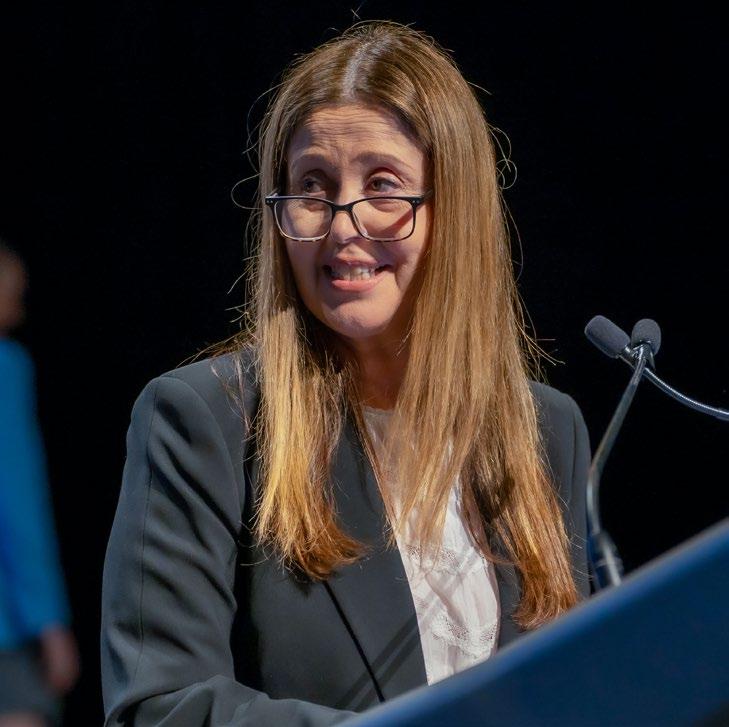
I am humbled and so proud to be Head of Year for this remarkable Year 12 Cohort. Every moment of our journey together was an absolute joy. I would like to think that in moving through this chapter of our lives and indeed through this most extraordinary chapter in human history, together we have learnt. We have learnt about inner strength and discovered boundless resilience, we have learnt about the power of perspective and the need to show empathy and compassion. We have appreciated the power and wisdom that hindsight offers and the need for forgiveness as nobody is perfect, and we have learnt about the importance of our voice and the absolute imperative of inclusion, acceptance, and service to others.
Our Year 12s have emerged so beautifully in 2022. They are a force to be reckoned with in the most positive sense. As they move into the next chapter of their lives, I encourage them to continue their passionate advocacy for issues that remain close to their hearts.
From the get-go they were ready for action. Ready to learn, ready to participate and make a difference to the world around them. Whether it was mobilising their efforts to support the victims of the 2022 NSW floods, or raising awareness of women’s issues, such as the inequities that exist in girls’ education through One Girl, or supporting local organisations like IMPACT to assist families and communities to live, prosper and grow, or deciding to launch the first student driven St Catherine’s School publication, The Stentorian, they have all quietly persisted, pushing themselves and making their dreams come true! Our Class of 2022 are proof of the power and strength that girls, young women, are capable of when belief and purposeful action merge.
So, to our Class of 2022, as you embark upon the life that lies ahead, I simply say – be your beautiful self that defines you and is so inspiring to those of us who love you. Be kind in everything you do, and you will enjoy yourselves more than you could ever possibly imagine.